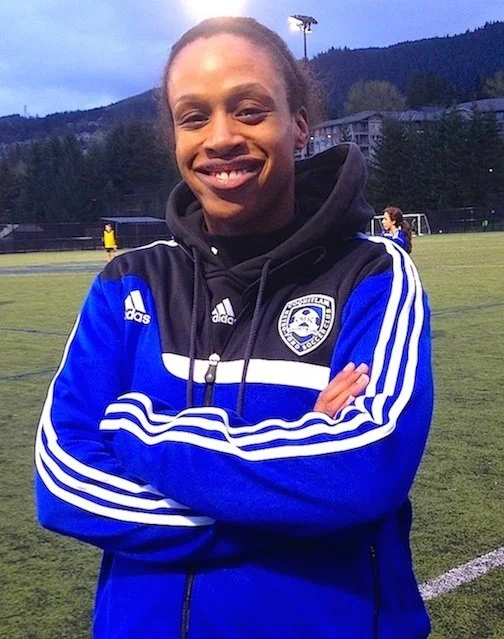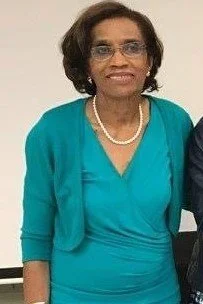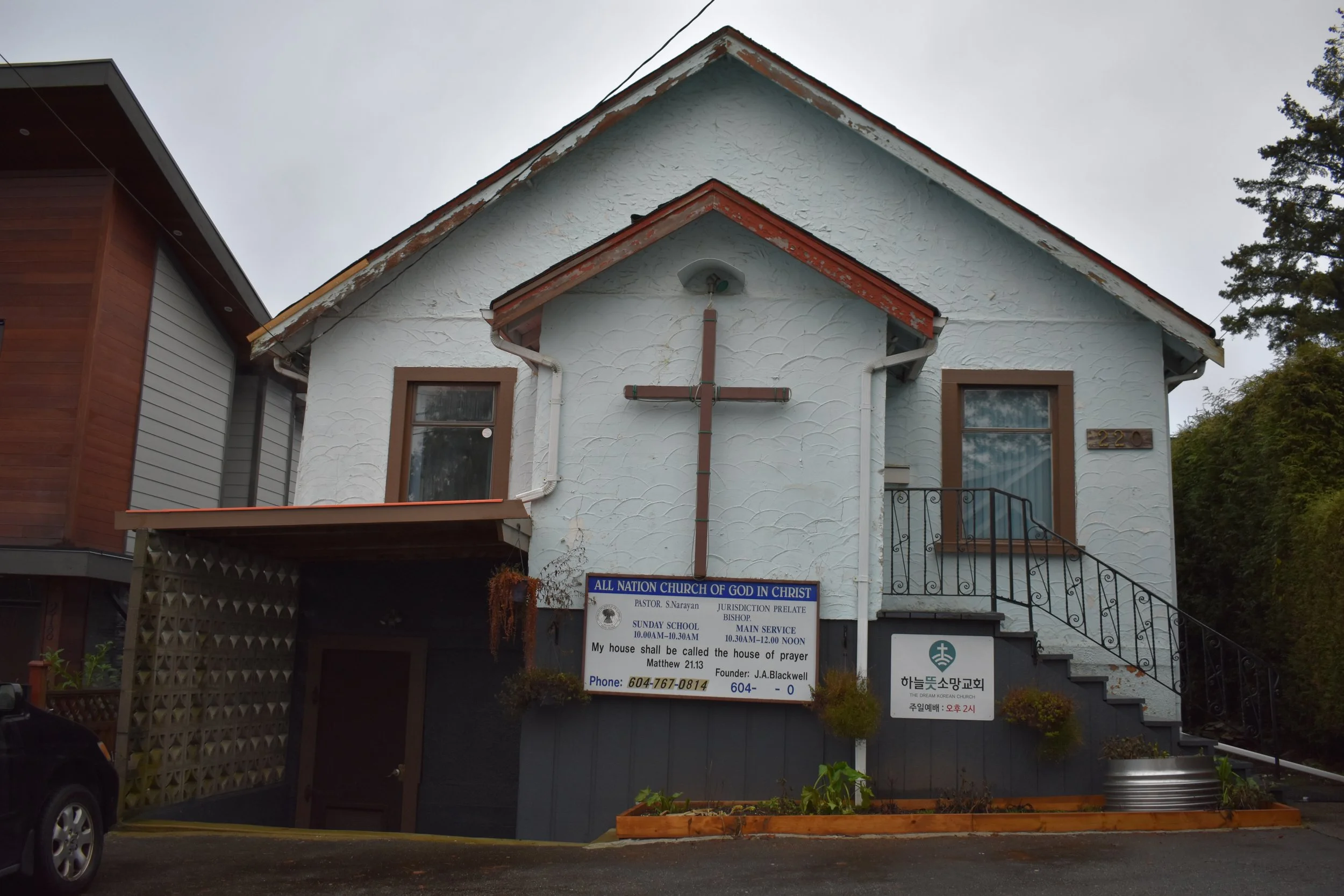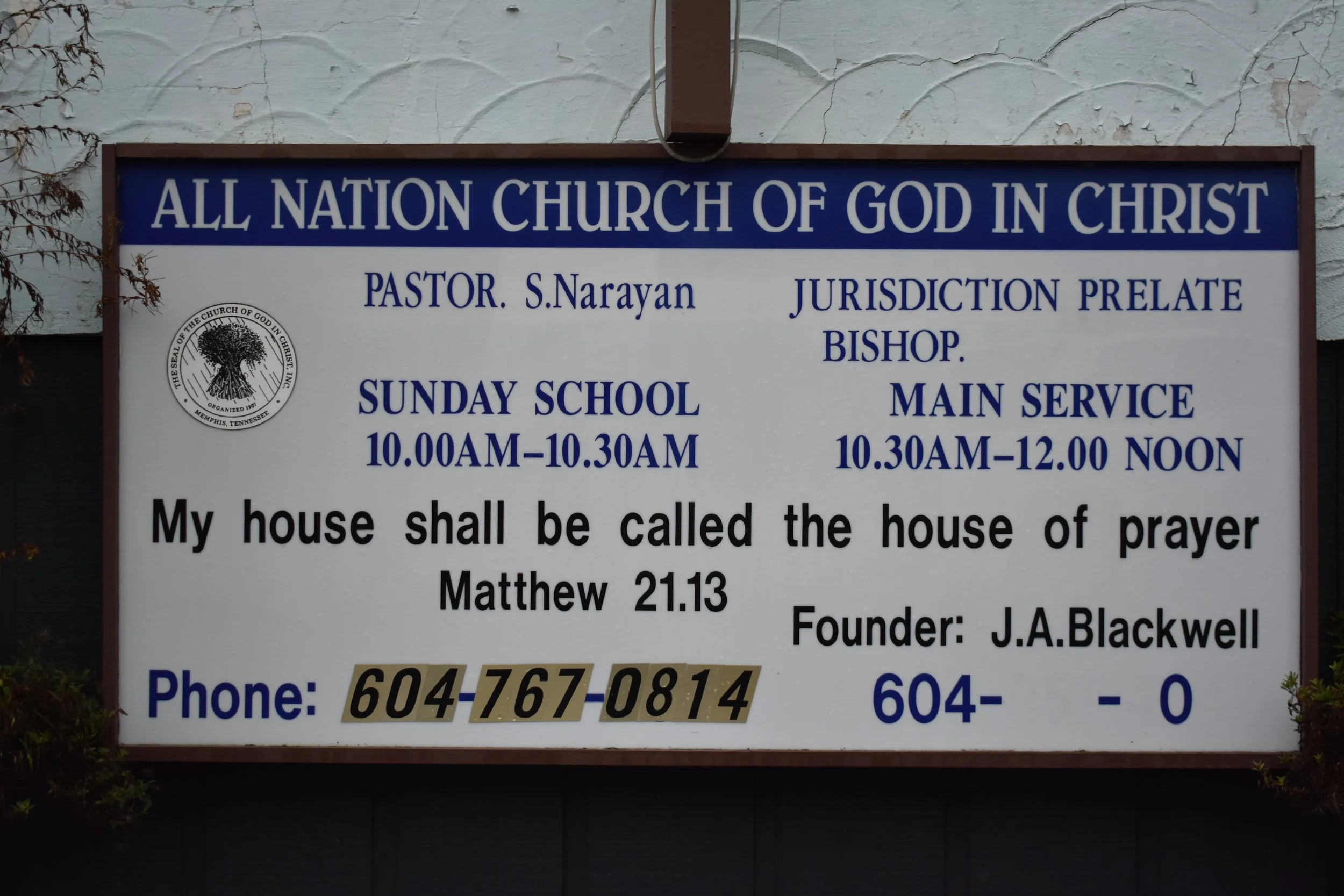
We’ve Been Here a Long Time
Coquitlam’s Black Community Members
Coquitlam is a city with a very diverse population. People have come here from other parts of Canada, and from all over the world for one reason or another, and have made their homes here. This exhibit will take a look at our local Black population through the lenses of politics, family ties, and their contributions to our community.
The 2016 Canadian Census data for Coquitlam shows that just over 50% of the population that returned census data, identified as “Visible Minority” and 1.1%, a total of 1,515 people, identified as “Black.” Coquitlam Heritage has reached out to members of this latter group, to get to know the community, and to tell a little bit about them.
We hope you will enjoy meeting some of your neighbours through their stories, recipes, and pictures.
Though no map is available for Coquitlam specifically, this 2016 Statistics Canada map shows the distribution of immigrants living in Vancouver by region of birth.
Trails to Canada
Some of the earliest Black arrivals to British Columbia came in 1858, invited by Governor Douglas at the time of the Fraser River gold rush. Promised improved rights, more opportunities, and a chance to become citizens, their presence was one way that Douglas avoided being overrun by Americans, who came by the thousands seeking gold.
You can learn more about this history through our exhibit “We’ve Been Here All Along.”
Descendants of these pioneers still live in the Lower Mainland. They have been joined by Black people from across the globe. Some came in search of work, some arrived as refugees, and others came to attend universities. Some arrived in BC from established Black communities in other parts of Canada, such as Africville in Nova Scotia. Over the years, political forces and public sentiment both played a role in the timing of their arrivals. Coquitlam’s Black community reflects many of these things.
Although many Black Canadians live in integrated communities, there have been, and still are, many notable Black communities. Some were unique settlements and some neighbourhoods in urban centres with predominately a Black population.
Meet Your Neighbours
Thank you to Tri-Cities Community TV.
Community Member Spotlights
Mel Warner
Mel Warner was born in the Caribbean Islands of St. Kitts & Nevis. His father was a lawyer who completed his education in England, after which the family moved from the Caribbean to Alberta in 1964. During Mel’s Grade 10 year, they moved again to Vancouver, where Mel completed high school. He then attended Langara College and UBC where he studied engineering. Mel worked for the Grain Commission, first as a chemical assistant, then as a chemical engineer, a position he held for 28 years.
He first moved to Coquitlam in the early 1980s and was one of the first people to build a house in the Dawes Hill, Monashee Court area. This was followed by three more houses in Coquitlam. He remembers when City Hall was across from Mackin House. His then wife, who now lives in St. Kitts, was a nurse and a director at Riverview Hospital. His son, Jason, attended Our Lady of Lourdes and Centennial.
While studying at Langara College, Mel became heavily involved in music. He started out organizing dance parties as part of the Student Council, and his interest deepened when he worked as a busboy at Vancouver’s Oilcan Harry’s and the Cave Night Club, while financing his education. There, he learned about booking and promotions, and this led to his second career as a concert promoter.
Mel called his company Caribbean Productions, booking acts for places like the Devonshire Hotel and the Commodore ballroom. He brought in Caribbean artists to fill gaps in the music scene. Prior to Mel’s efforts, people in British Columbia had very limited opportunities to hear Latin, Caribbean, African, and R&B music. His concerts were well-attended, and his company grew to become Meloproductions. All of this did not happen without a struggle. Mel worked after his day job as an engineer to bring his dreams to life, but in the meantime, battled against prejudiced attitudes towards both himself and Black entertainment in the early years. To ensure his success at the time, he even felt it necessary to hire white people in order to ensure his success.
But succeed he did. Mel was inducted into the BC Entertainment Hall of Fame in 2019, just as the COVID pandemic brought the entertainment industry to a standstill. He also finds time to volunteer to do his own radio show at Vancouver Co-op Radio (CFRO 100.5 FM), “Caribbean Sounds,” on Saturday evenings.
When he has spare time, Mel enjoys watching cricket at Mackin Park, coaches soccer and track and field, and plays soccer. He has been a marathon runner in the past, and has been and continues to be, an avid reader.
You can learn more about Mel in this oral history interview.
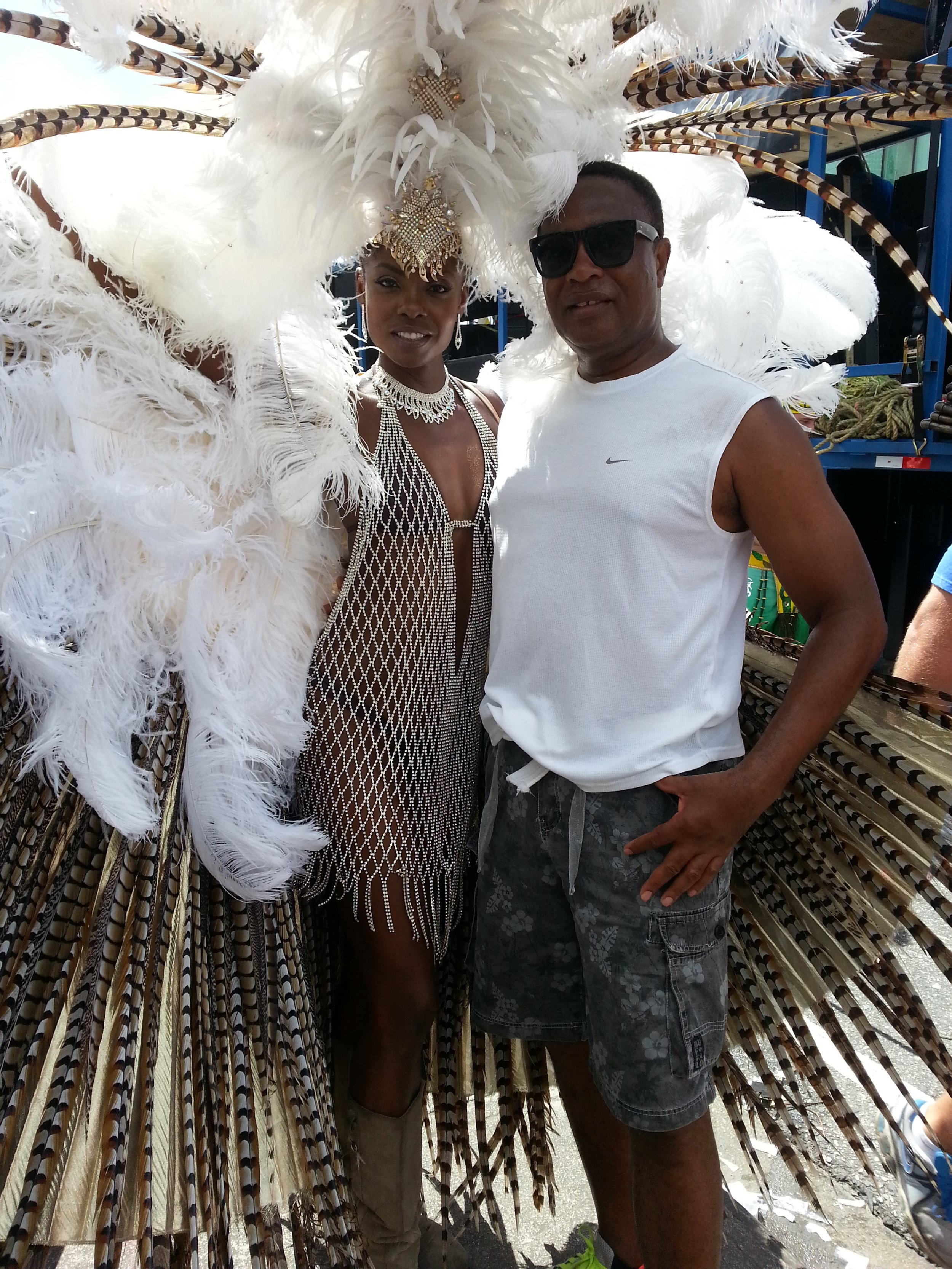
Mel on vacation during the annual Carnival celebrations in Trinidad.
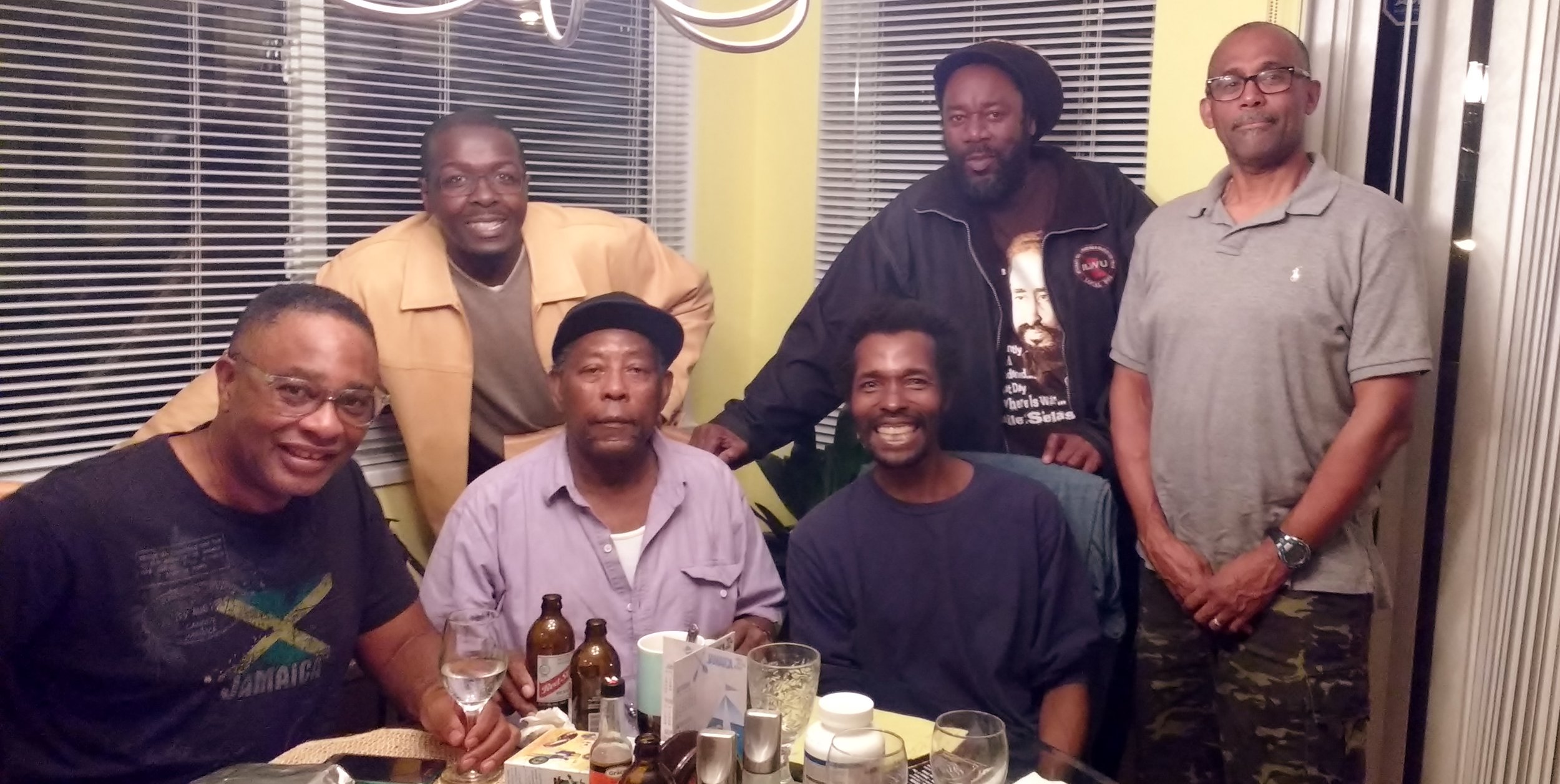
Informal meeting of some of BC’s most prominent Caribbean radio hosts.

One of Mel’s cookbooks from the Caribbean highlighting some of the region’s diverse and delicious dishes.
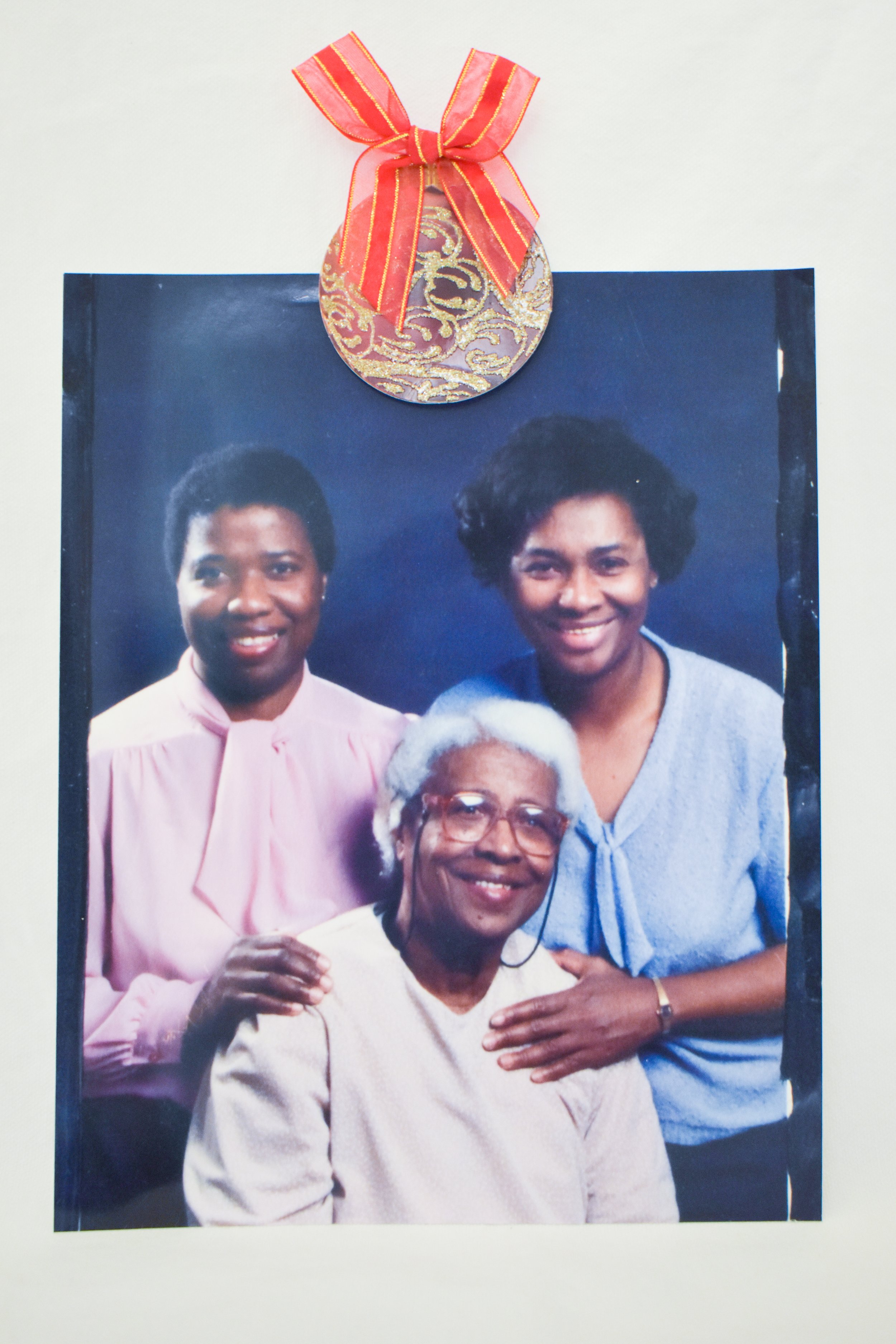
A Warner family portrait. L to R: Mel’s Aunt Simone, Grandmother Christobel, and Mother.

The Warner family bible.
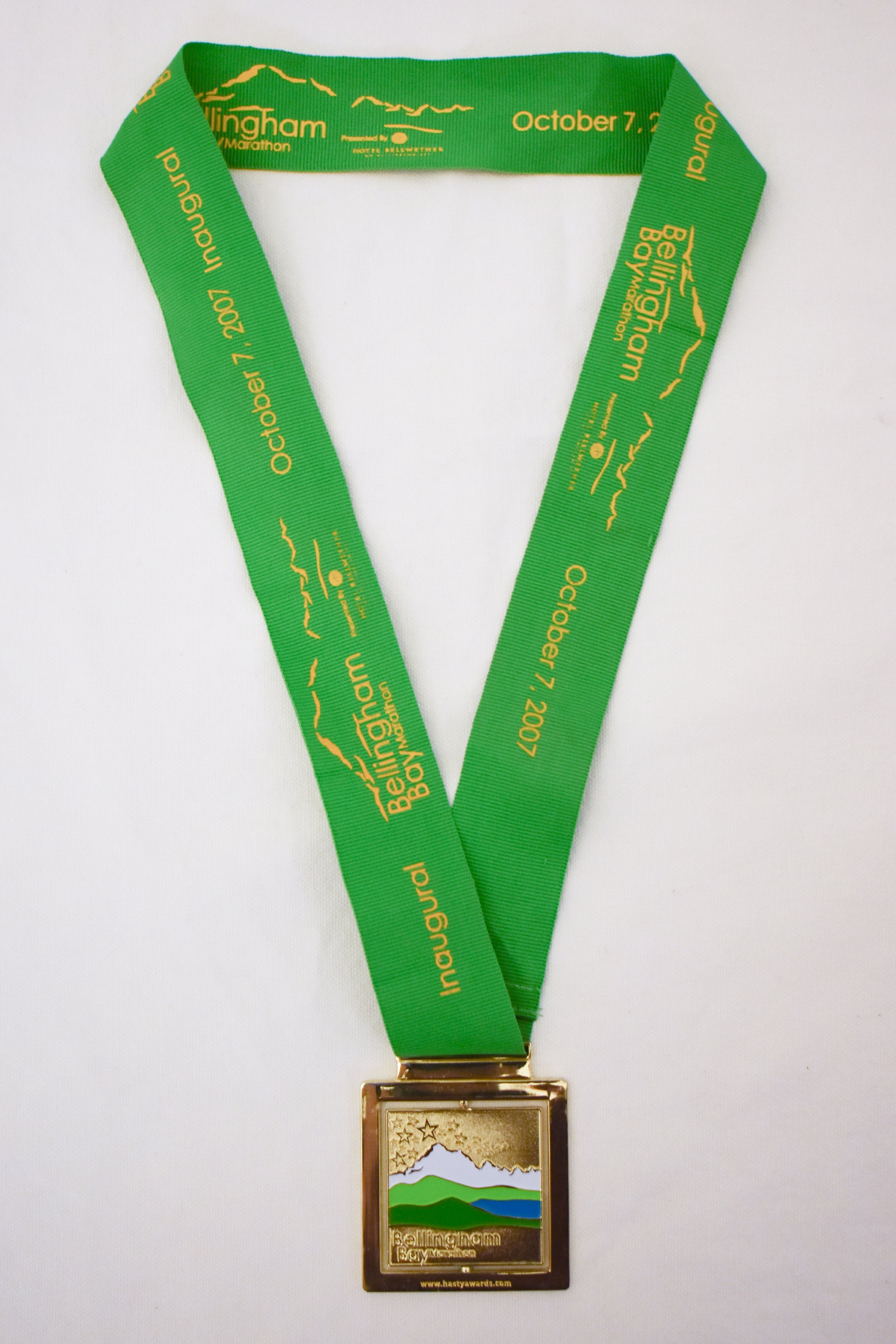
Finishing medal from when Mel ran the Bellingham Marathon in 2007.
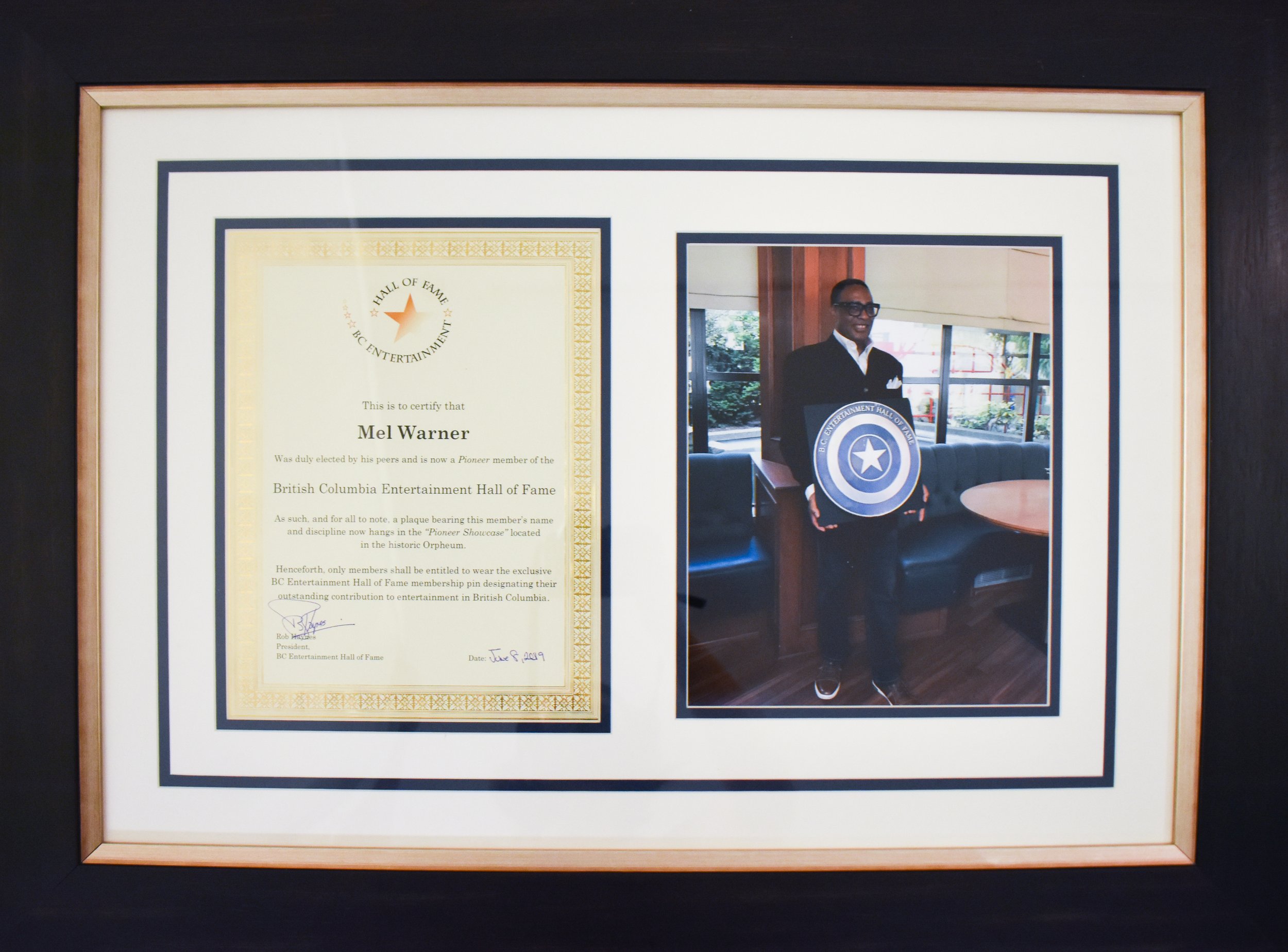
Commemorative document and photo from Mel Warner’s 2019 induction into the BC Entertainment Hall of Fame, where he was recognized as a promoter and for introducing new styles of music through his radio show.
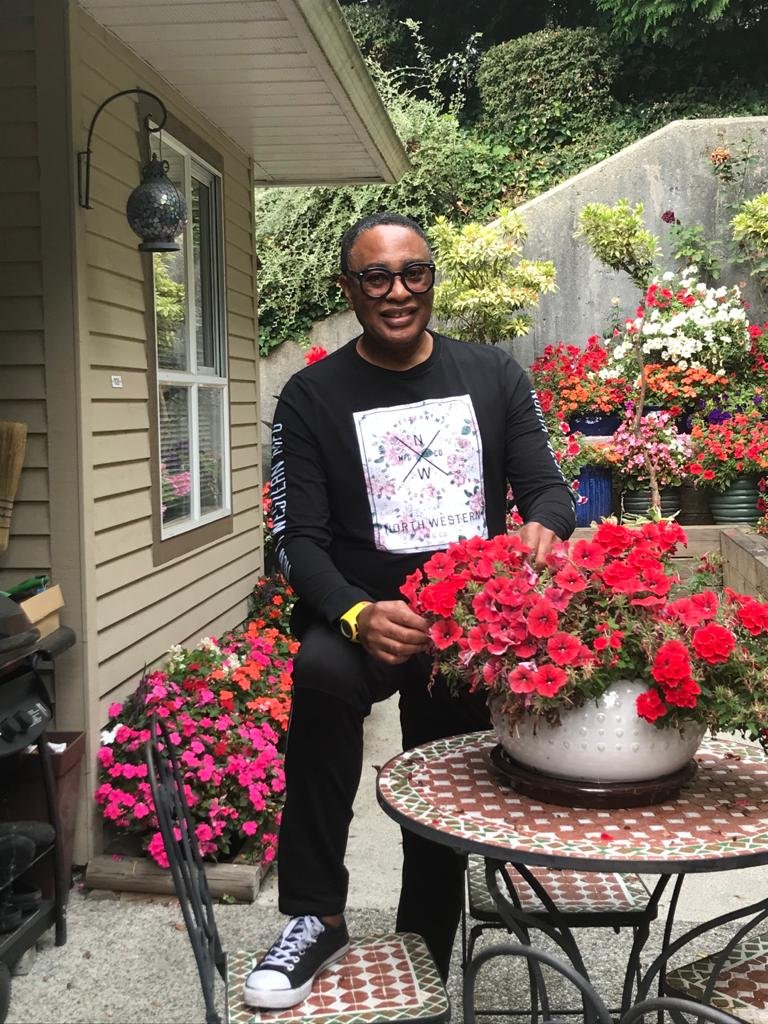
Mel, an avid gardener, at his Coquitlam home with some of his prized flowers.
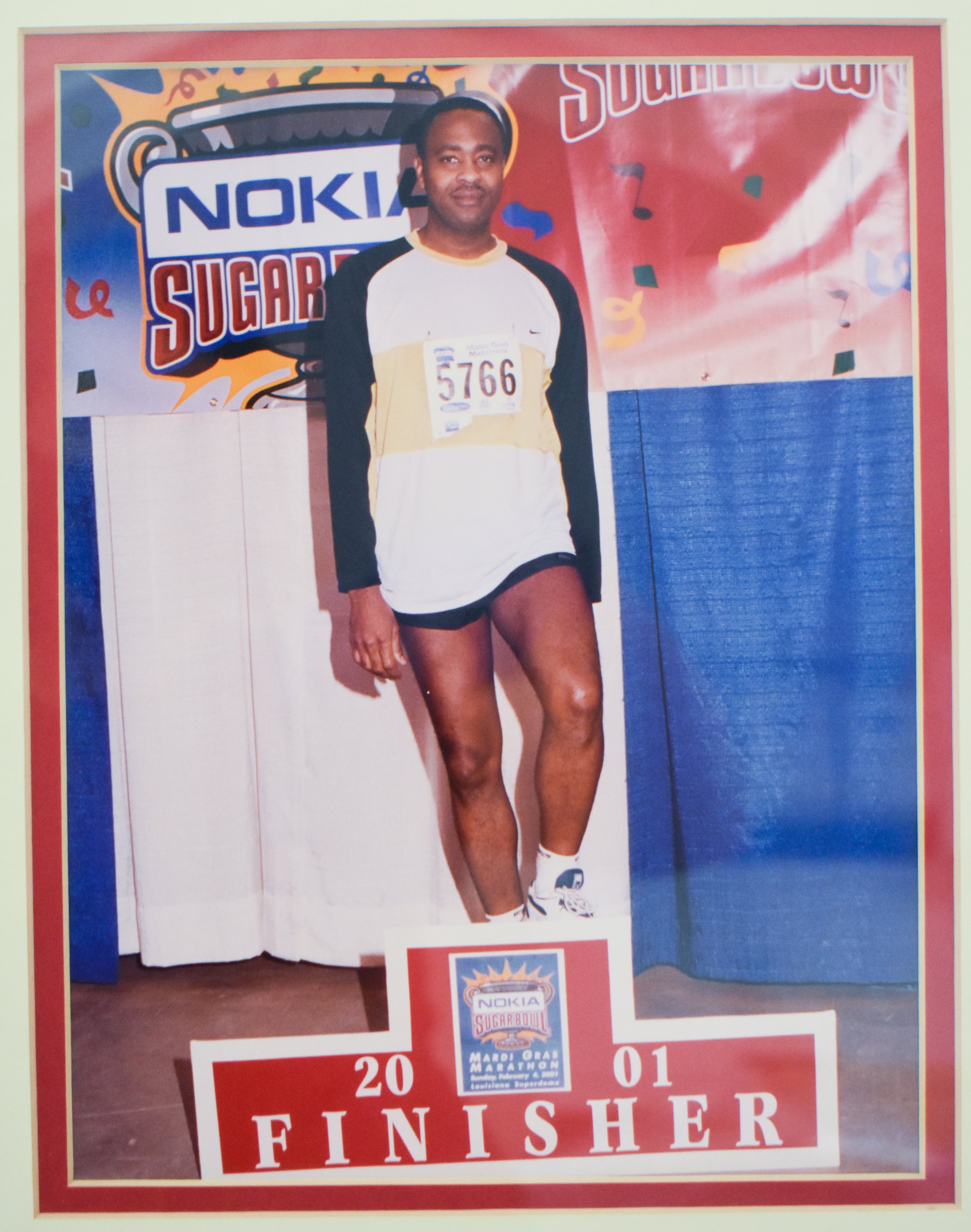
Commemorative photo from when Mel ran the 2001 New Orleans Marathon.
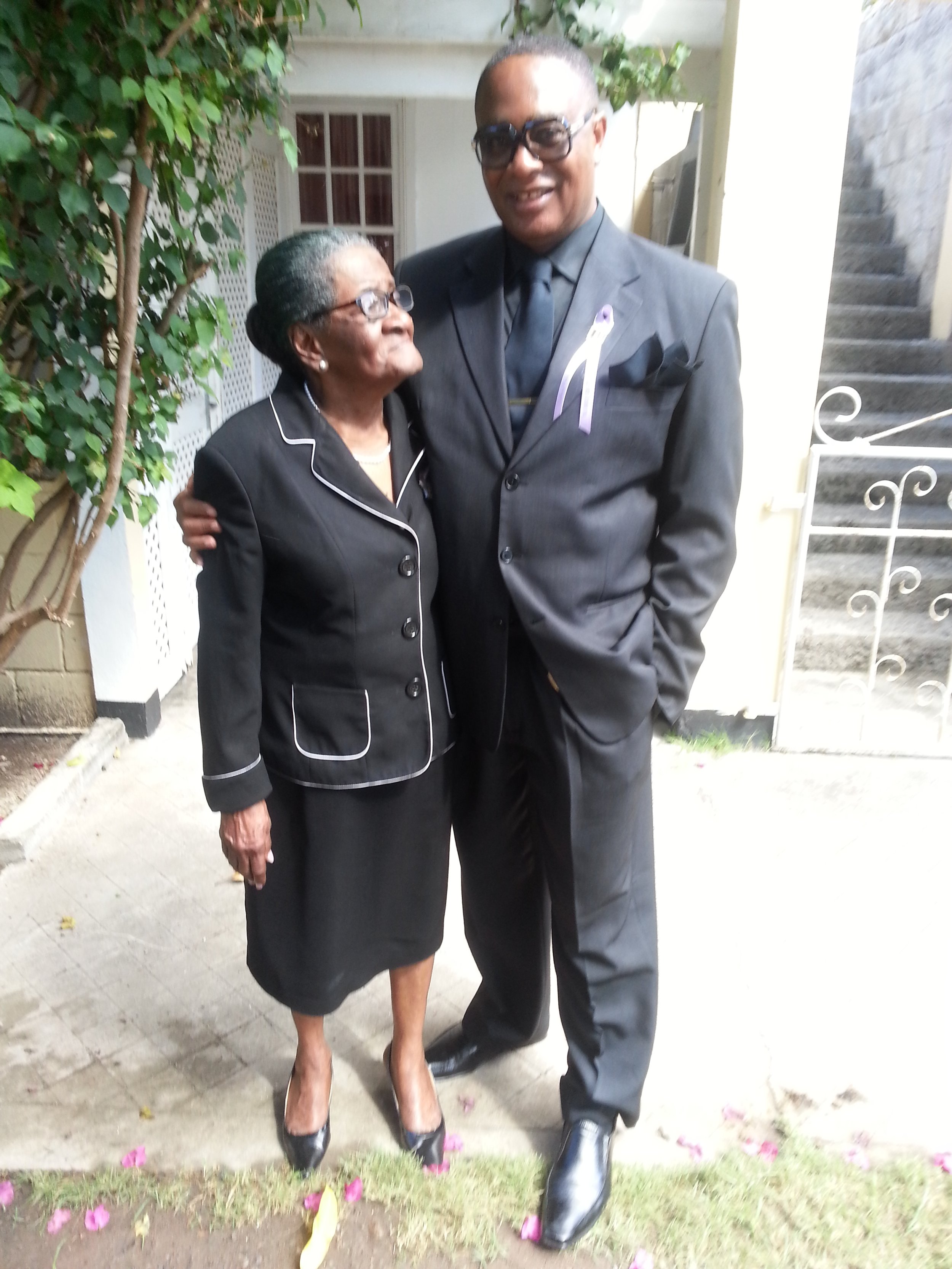
Mel with his aunt, Miss Vick Hobson.
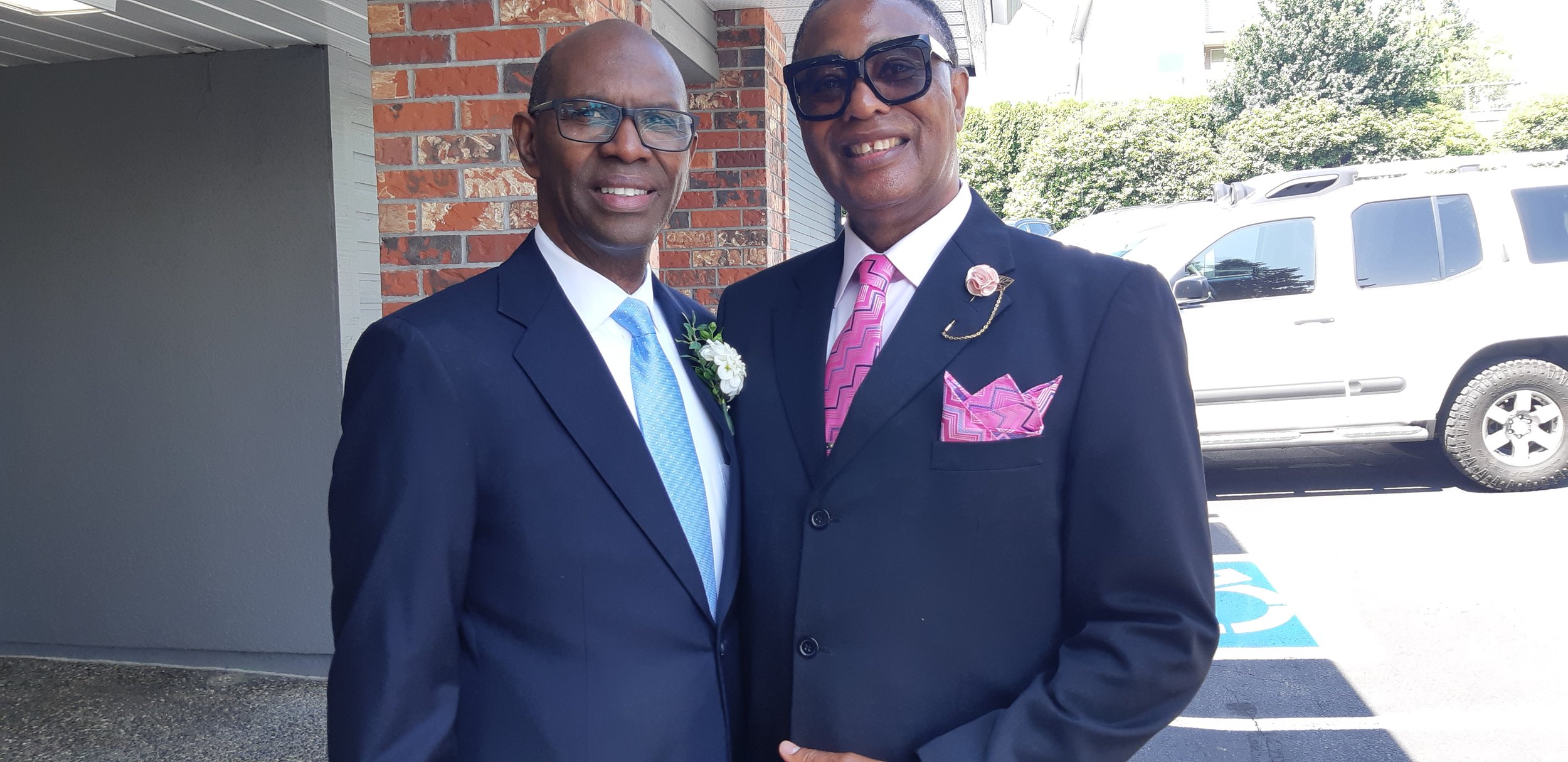
Mel and his brother Stewart.
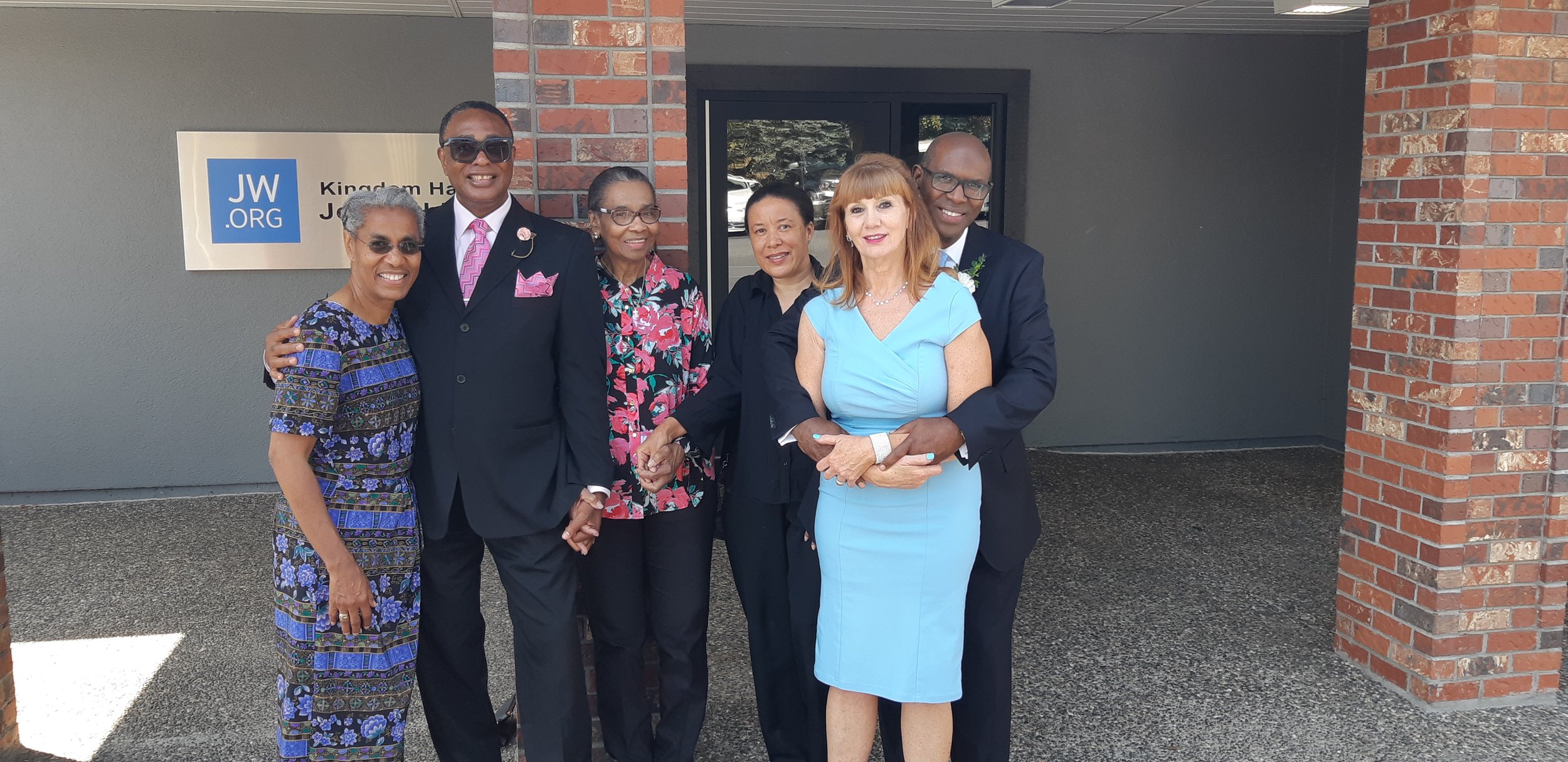
A Warner family photo at Mel’s brother’s wedding. L to R: Mel’s siter Julie, Mel, Mel’s mother Lorna, niece Simone, sister-in-law Ruby, and brother Stewart.
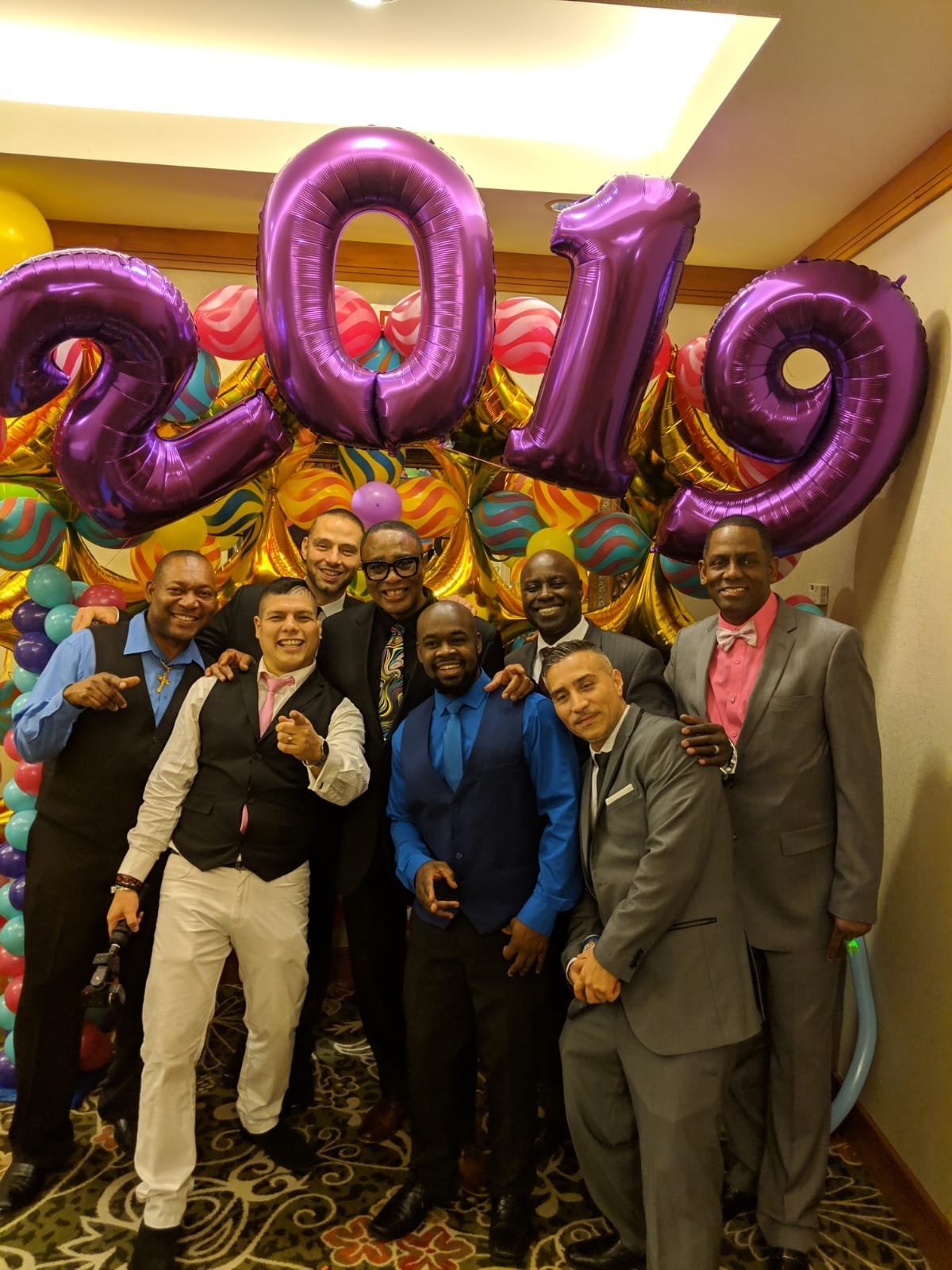
The team from Meloproductions, Mel’s promotions company, at their 2019 holiday party.
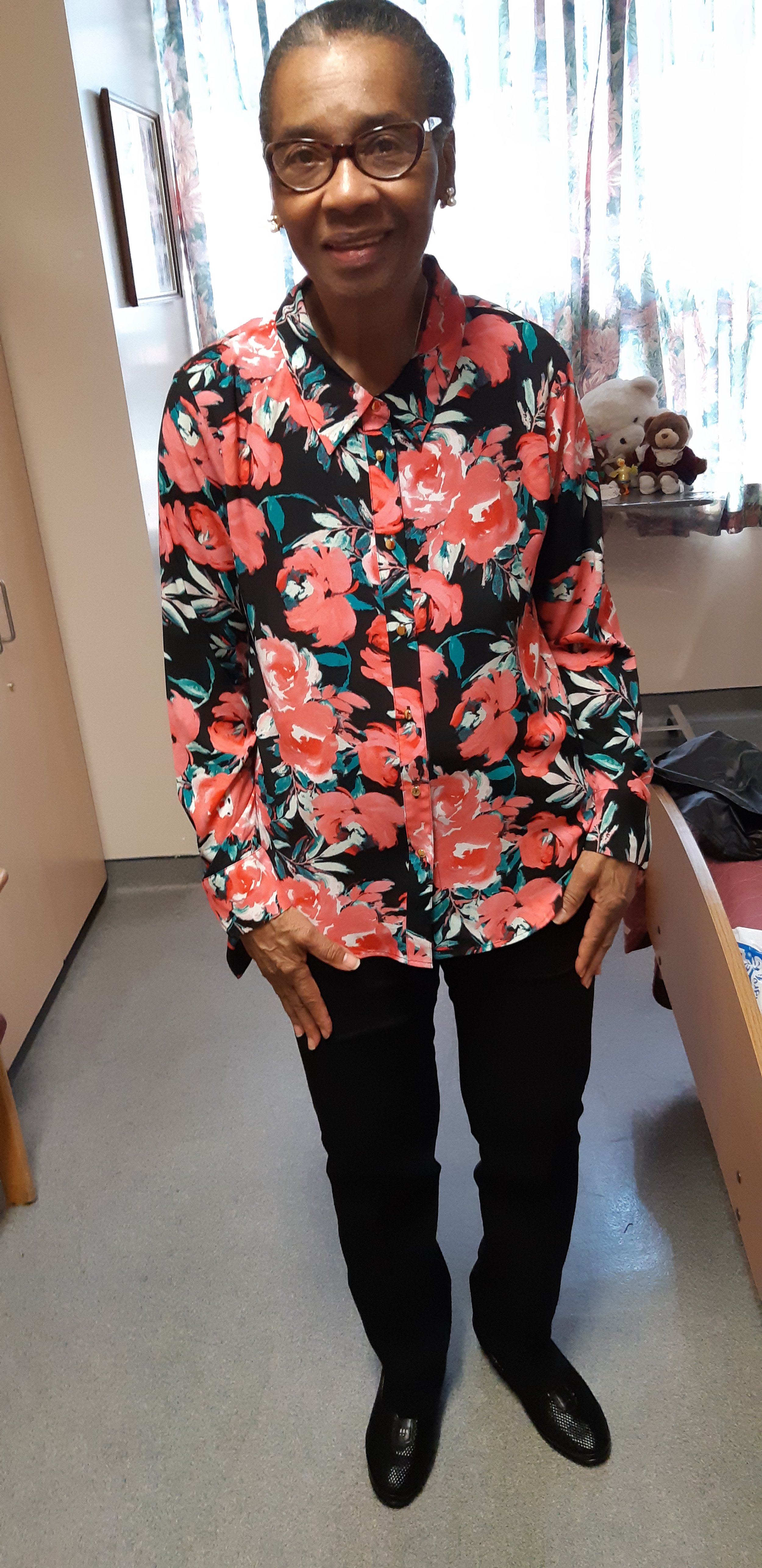
Mel’s mother, Lorna.
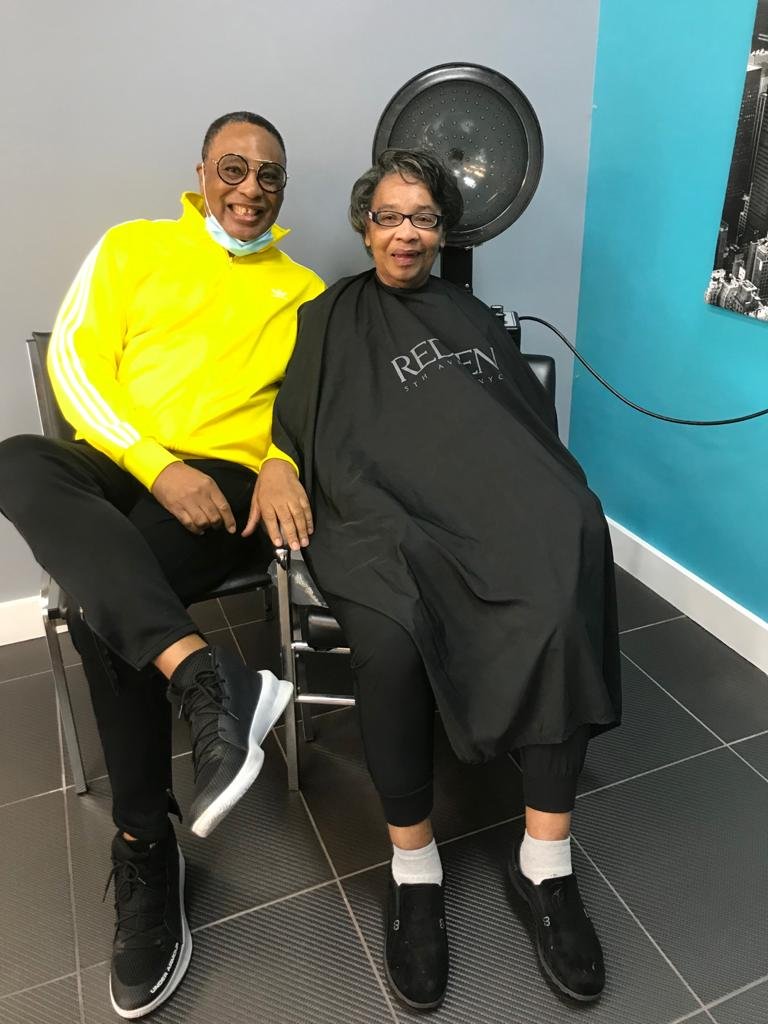
Mel and his mother, Lorna, at the hairdresser.
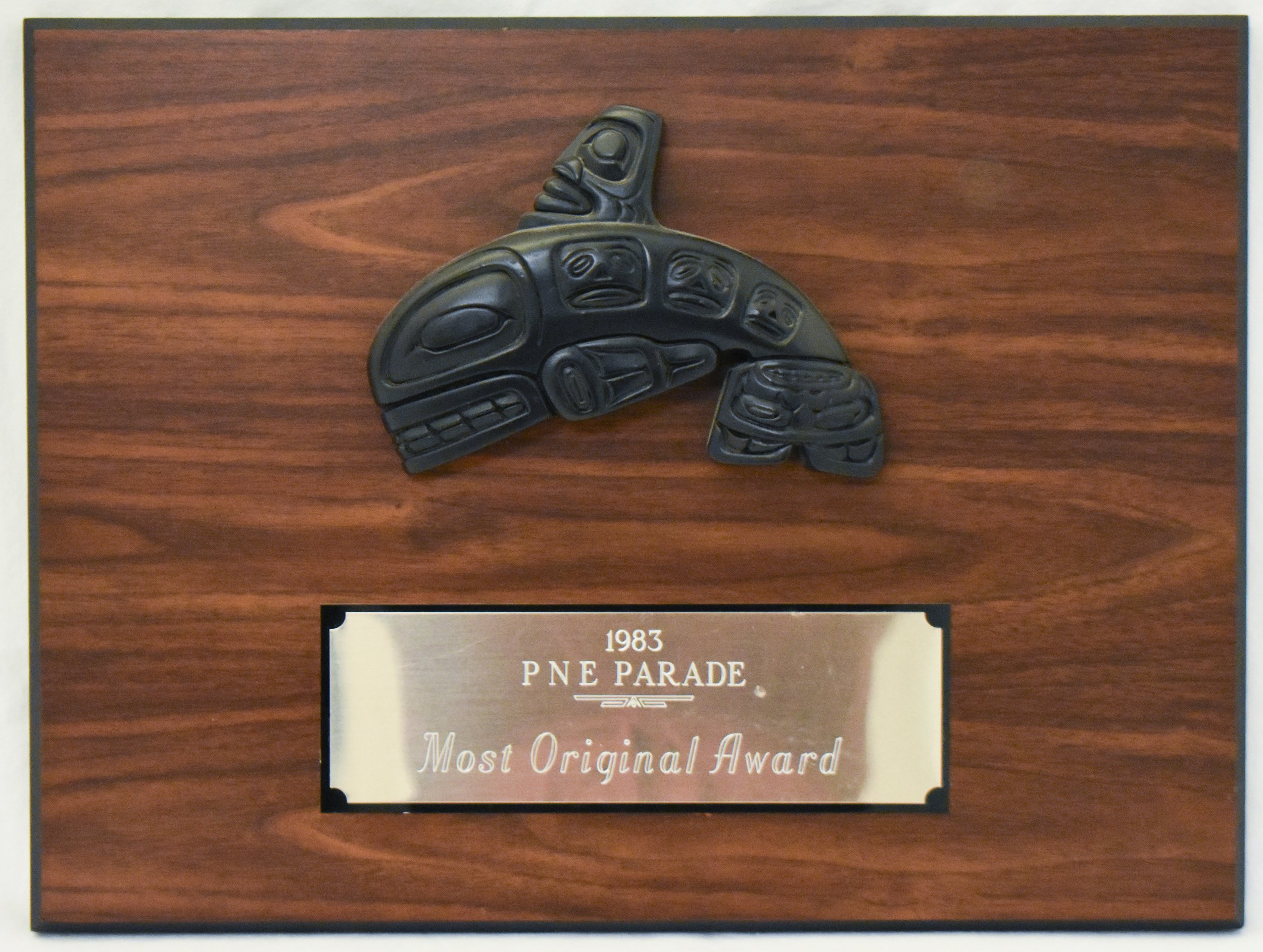
Meloproductions, with support from the Caribbean community, entered a float in the 1983 PNE Parade, which won this award.
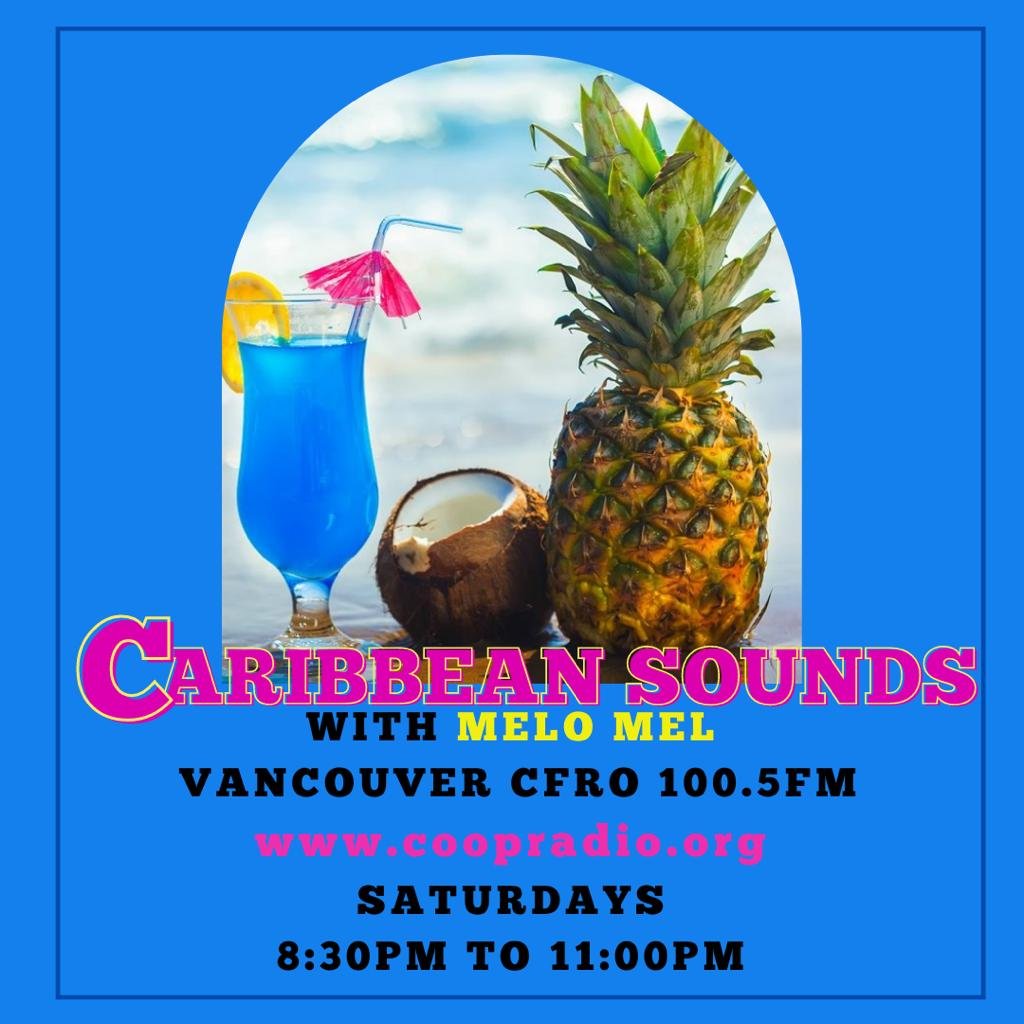
Poster from Mel’s (aka “Melo Mel”) radio show, which helped bring Caribbean music to Vancouver.
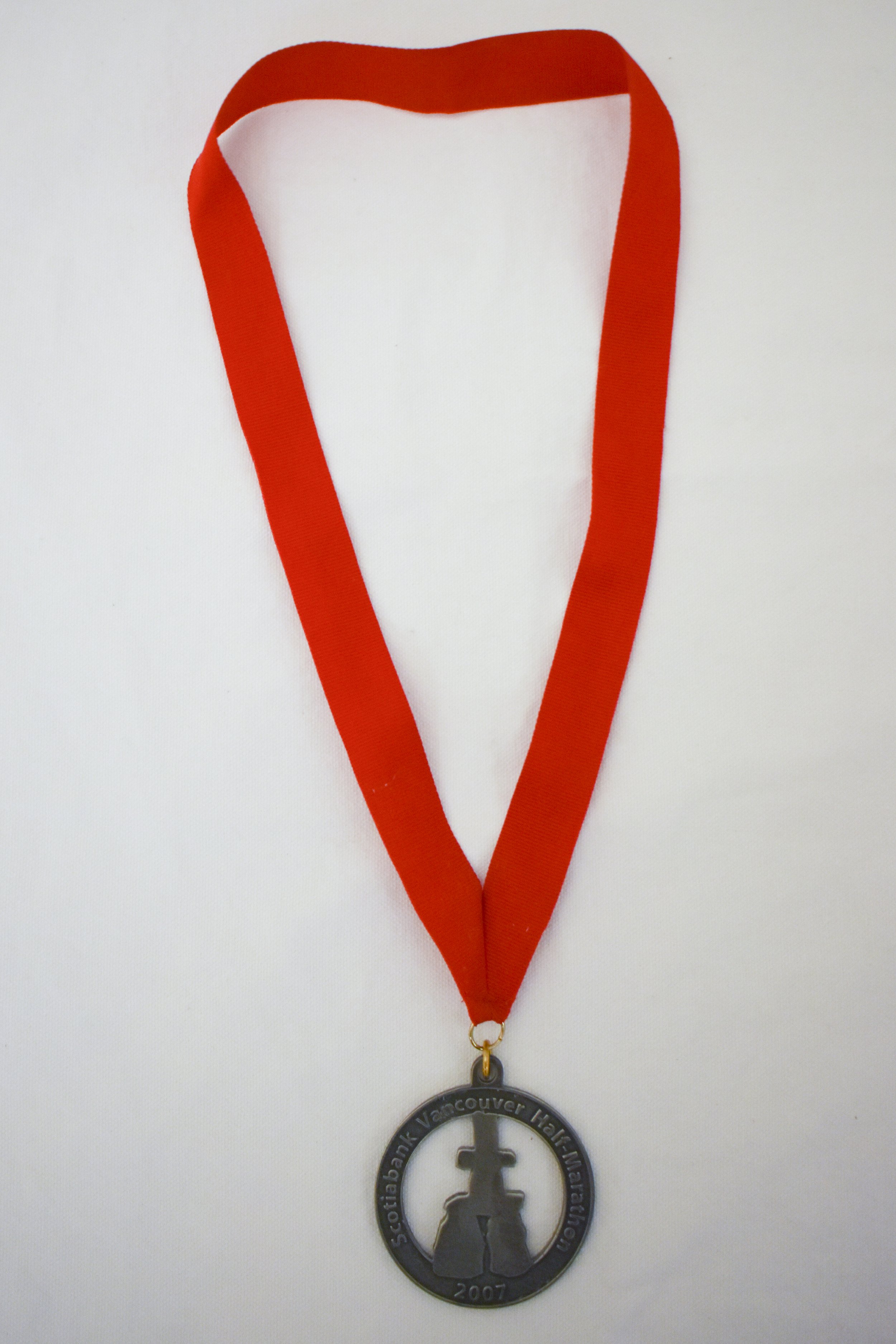
A medal awarded to Mel for completing the Vancouver Half-Marathon in 2007.
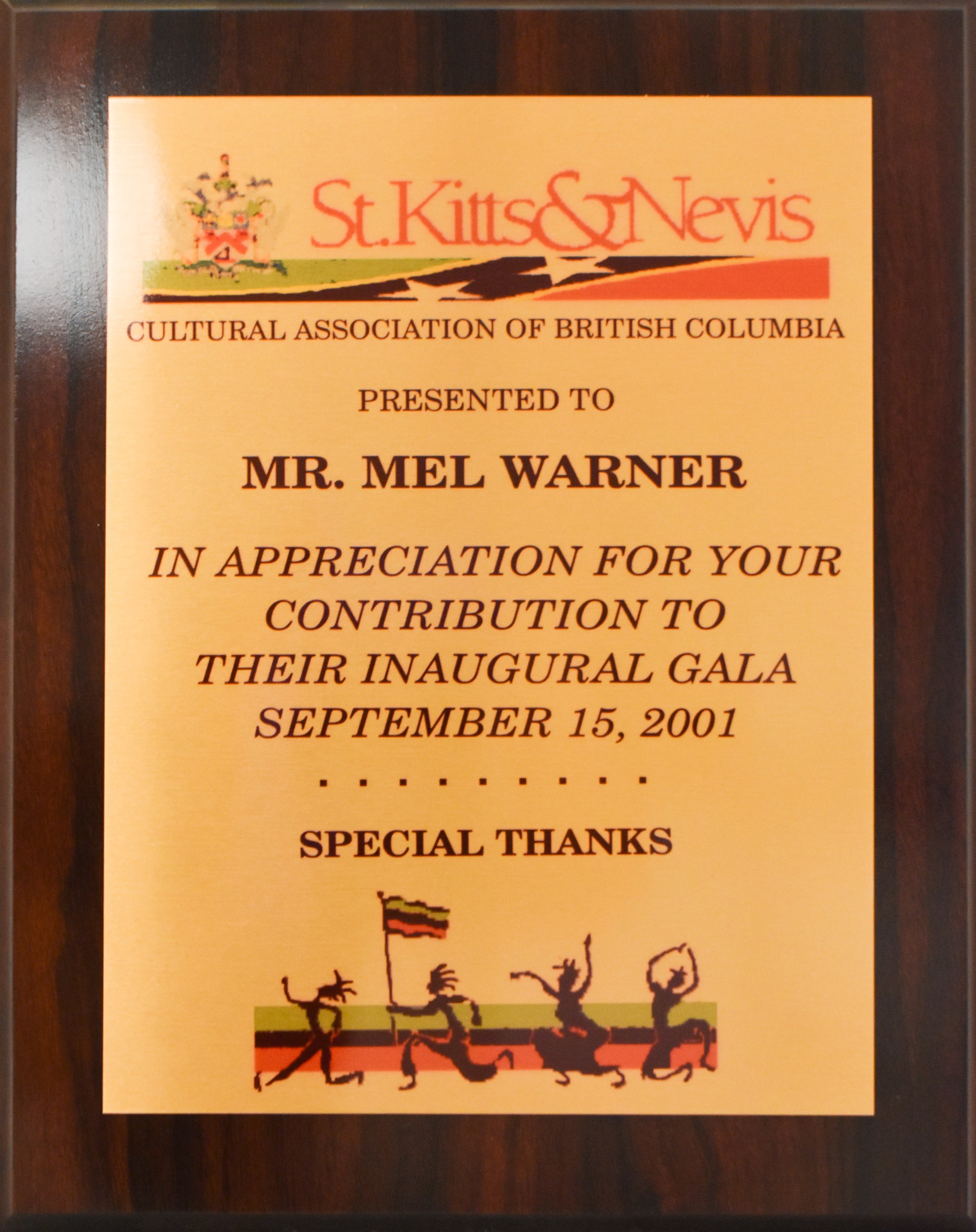
A plaque from the St. Kitts & Nevis Cultural Association of British Columbia recognizing Mel’s role in BC’s Caribbean community.
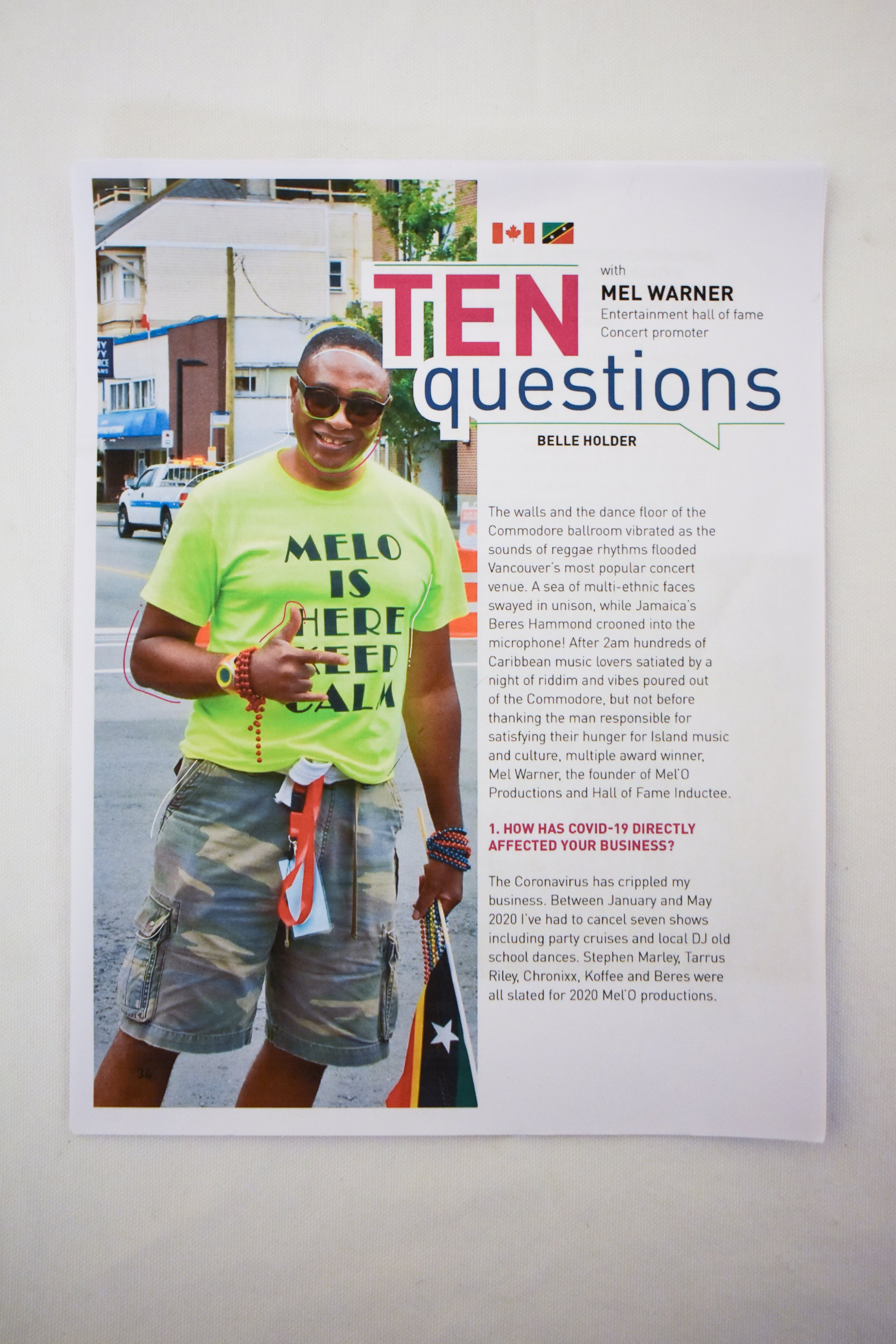
Interview with Mel about the effects of the COVID-19 pandemic on his business as a promoter.
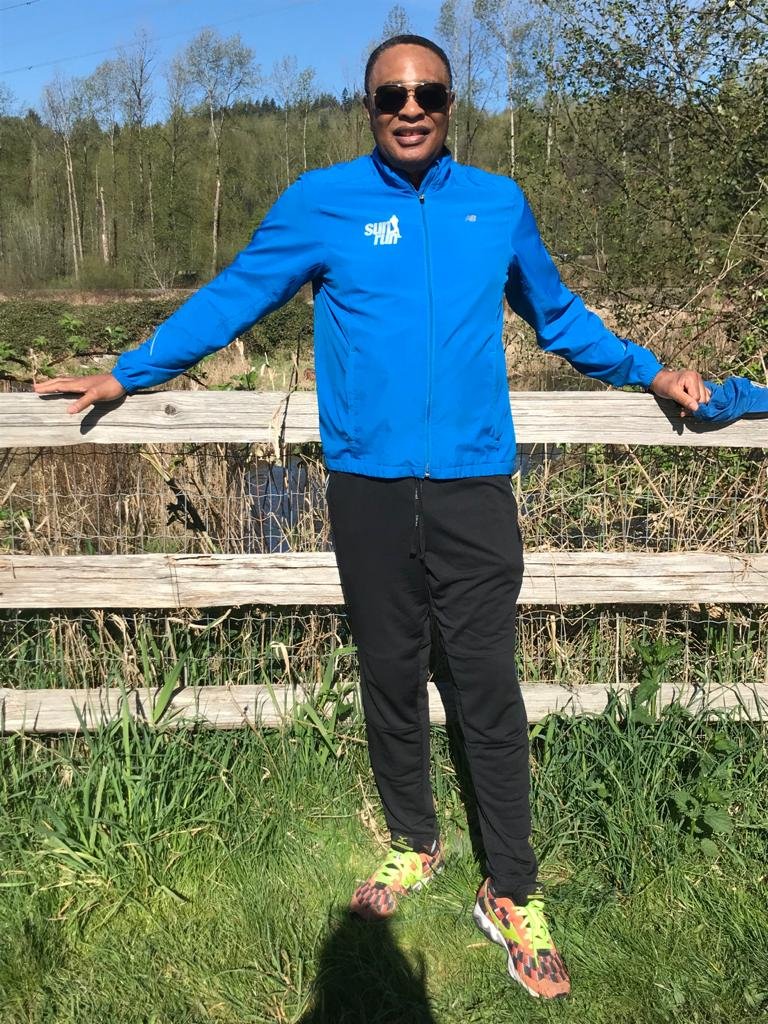
Mel training to run another marathon.
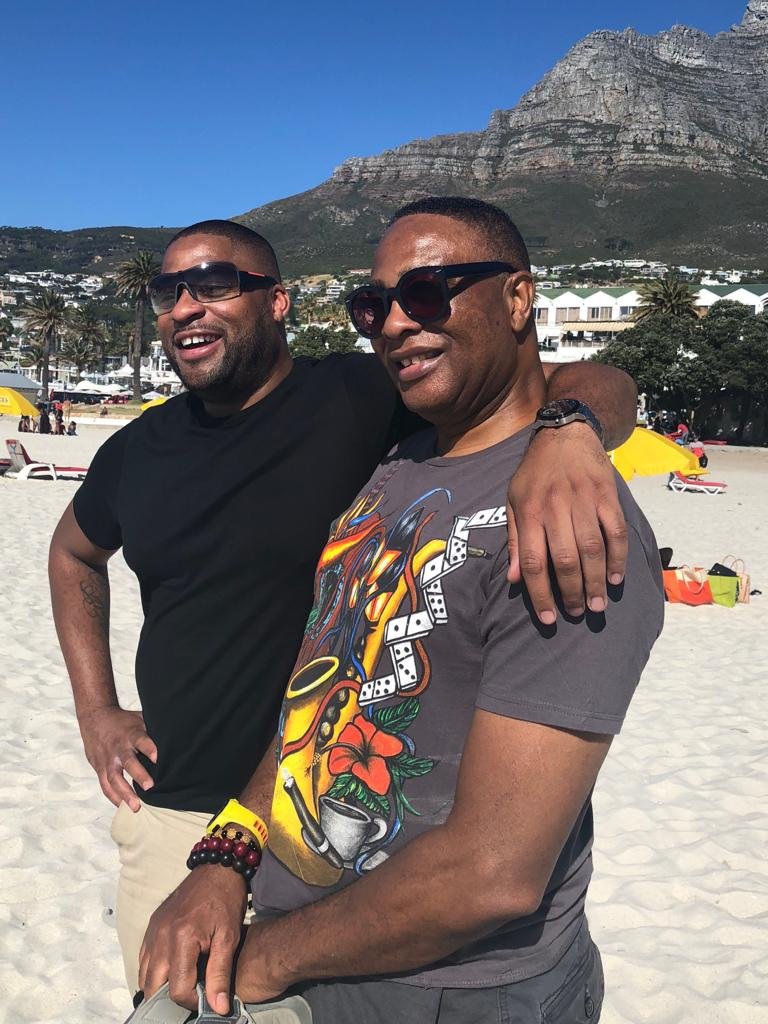
Mel on vacation with his son, Jason, in South Africa.
Trish Mandewo
Trish Mandewo is one of our Coquitlam City Councillors. Her ancestral roots are from the Shona tribe of Zimbabwe, specifically Chivhu reserves. Her totem is Shava Mhizha / Mhofu, denoting to her people’s spirit animal, the magnificent, elegant, and strong Eland Antelope. She is a first-generation settler and is humbled and grateful to live and work here in the traditional, ancestral, and unceded territories of the Kwikwetlem Nations. Trish left Zimbabwe just after high school and settled in Oklahoma where she completed university and started her career and family. Trish and her husband Alexander, and daughter Alexandra, moved to Coquitlam in 2009 after a fun and exploratory drive across Canada.
Trish studied embryology and clinical microbiology, and like many people who immigrate to Canada, speaks numerous languages and has a wealth of stories from her past. She comes from humble beginnings but growing up poor is not how she defines her life in Zimbabwe. She remembers a happy, simple, and family centered childhood. Though there was considerable political turmoil in Zimbabwe while Trish was growing up, she and her family survived and had a positive outlook on life. In coming to Coquitlam, Trish found a sense of community that she fell in love with. The sense of community was something that she yearned for and was lacking in the states where she studied and lived for many years. After many years in the medical field, she left to pursue entrepreneurship after her daughter was born. As an avid volunteer, Trish has been contributing in a very real way to her Coquitlam community since the first year she moved here.
She is a multi-award winning entrepreneur, board professional, politician, mentor, speaker, and author. She was elected to the Coquitlam City Council in 2018. She is the President & CEO of Synergy Executive & Boards Consulting Group. She also co-founded the Women’s Collaborative Hub Society. Her commitment to Coquitlam can be seen by the long list of boards she serves on. This is a very short version of her many accomplishments.
To learn more, listen to Trish’s oral history interview here.
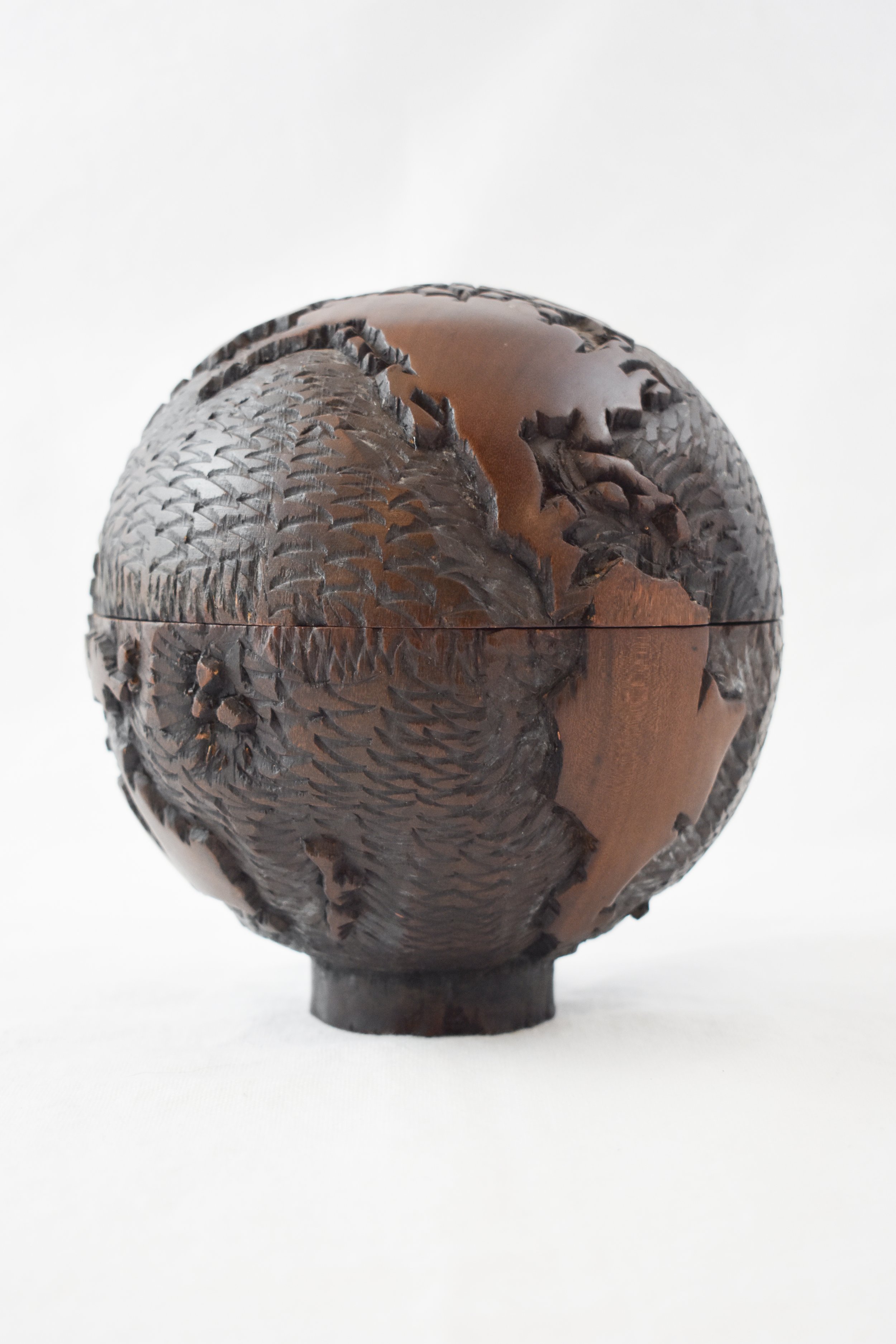
A small wood carving of a globe, highlighting the carving skills of the Shona people. Although mostly known for their stone carvings, the Shona people have begun carving wood to make goods to sell to tourists. The globe is most likely made from mukwa or mahogany.
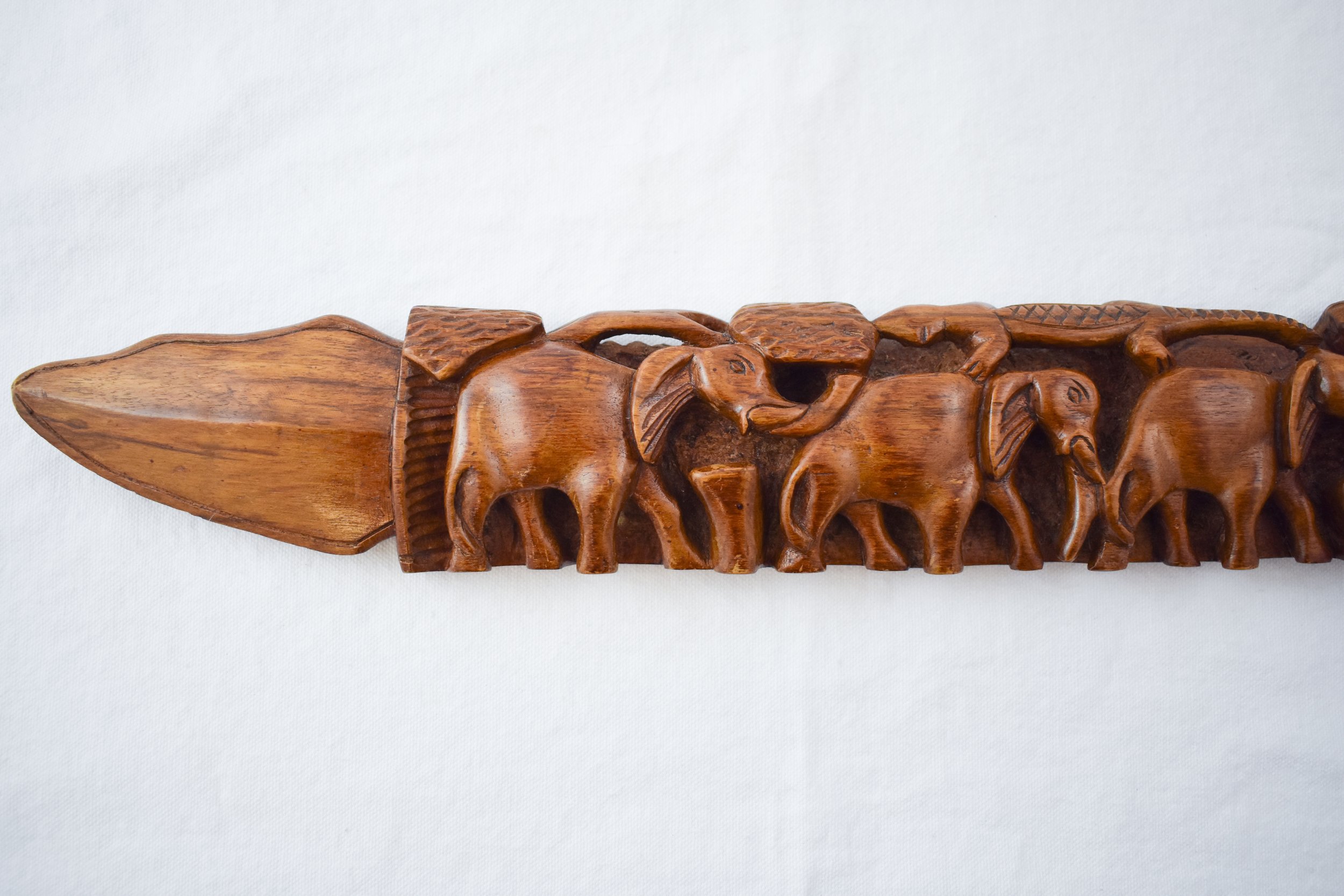
Small depictions of elephants and crocodiles on a decorative carving. While crocodiles are plentiful in both of Zimbabwe’s main rivers, the Limpopo and Zambezi, elephants are threatened by overpopulation as their habitat in Zimbabwe cannot support the large population.
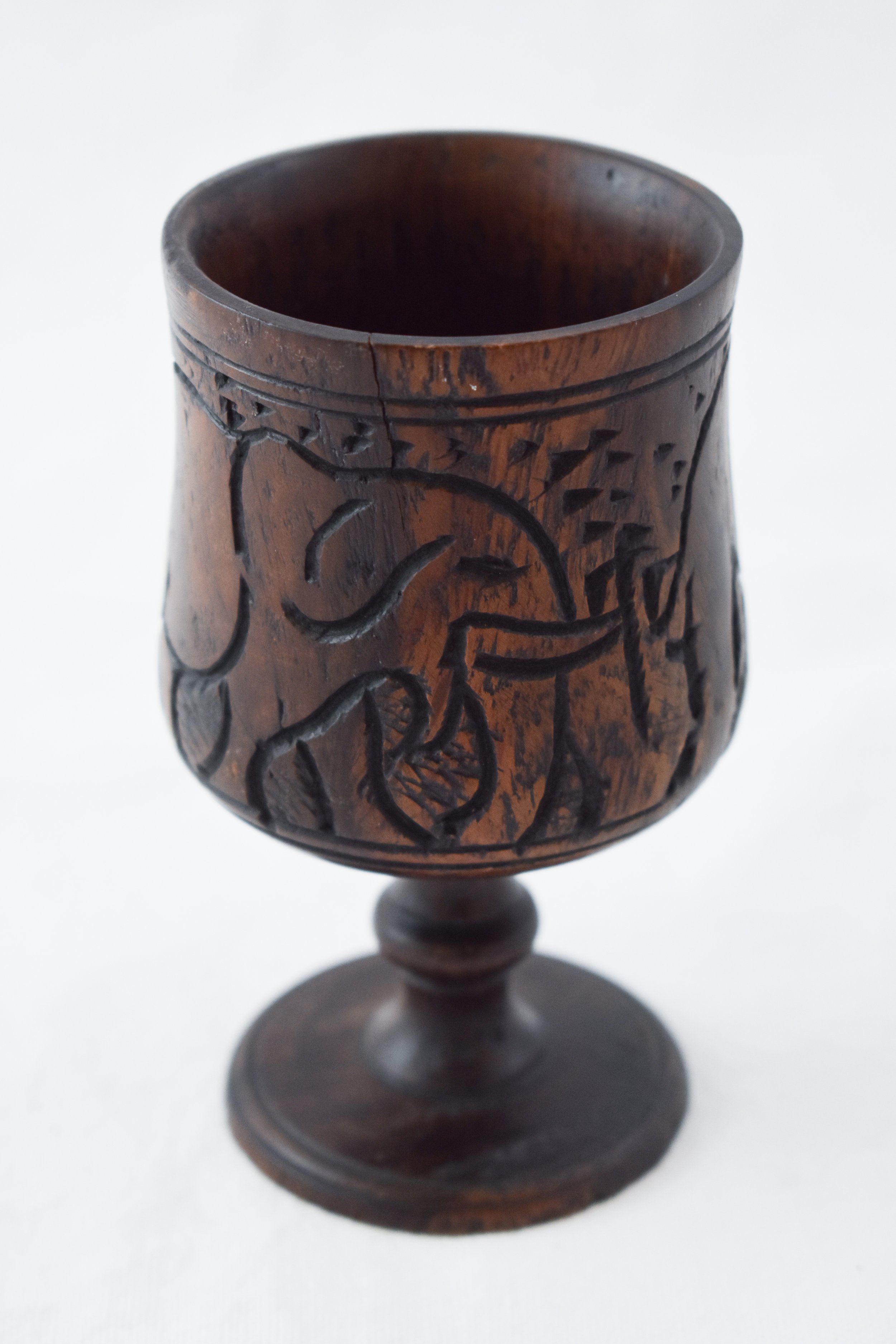
Wooden goblet most likely made out of mukwa (African teak) or mahogany, both common across the Southern Africa savanna, depicting an elephant. Zimbabwe has a robust population of African bush elephants, especially in the fertile western part of the country.

Beaded necklace from Zimbabwe. Beadwork is traditionally passed down from generation to generation as an oral tradition, in a form similar to an apprenticeship.

A small hand purse with a colourful African print on the closing flap.
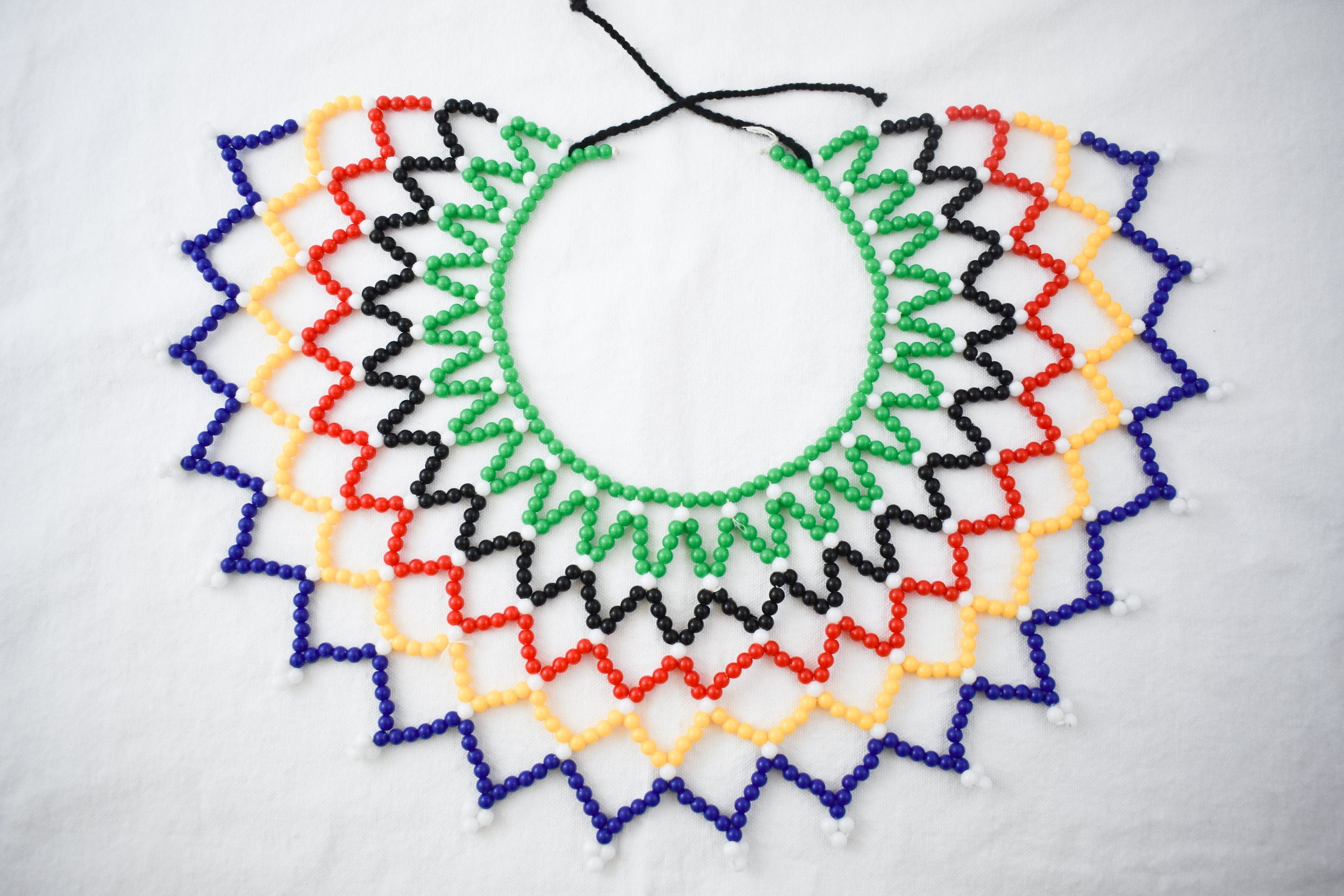
A traditional Zimbabwean beaded necklace. Beadwork is traditionally done by women as a way to pass the time and spend time with family when not working in the fields. Traditional beads are sourced from tree seeds, stones, and fabric.
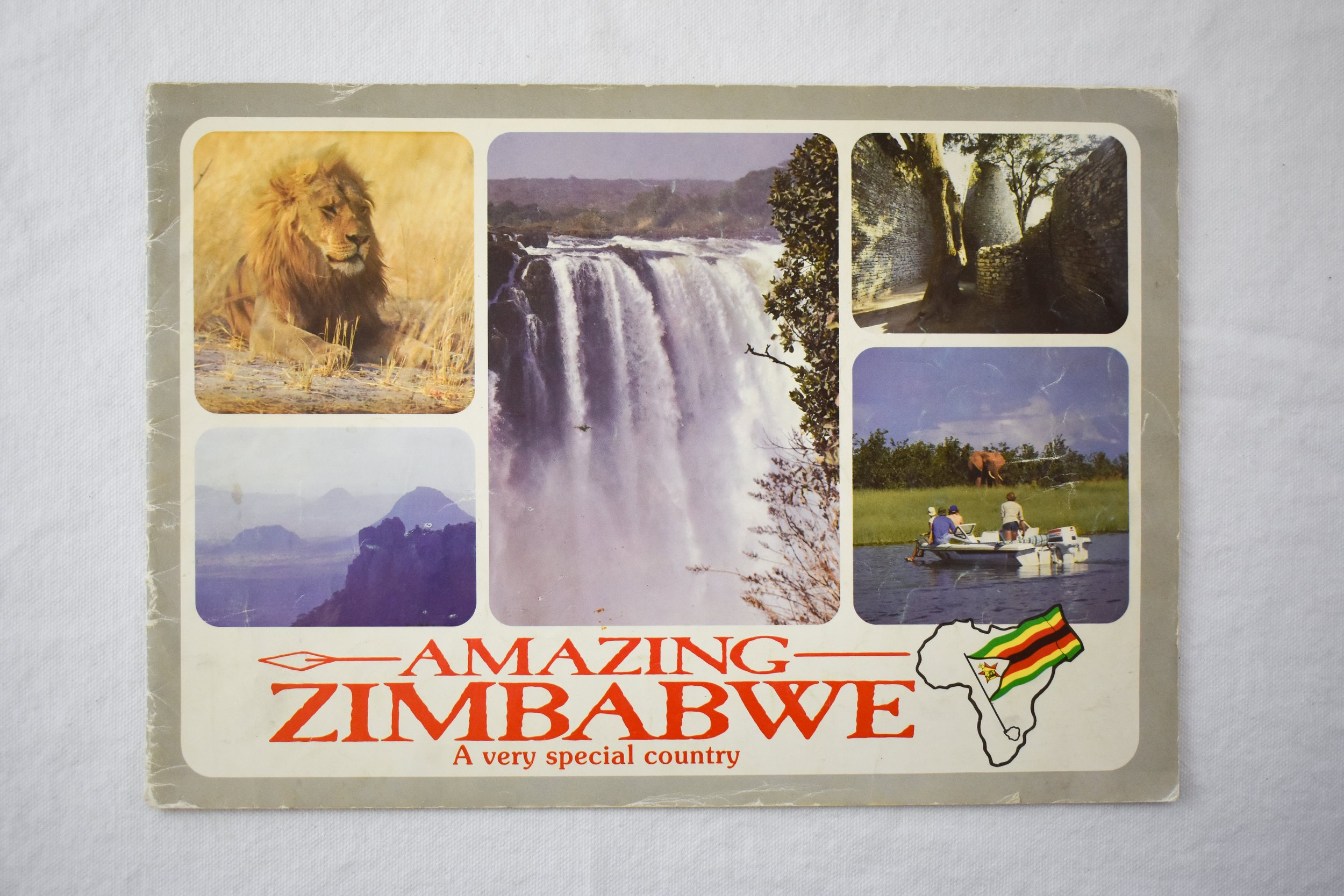
Cover of a promotional/tourism book published by the Zimbabwe Tourism Board. It displays some of Zimbabwe’s natural attractions, such as Victoria Falls, wildlife, the Eastern Highlands, the ruins of Great Zimbabwe, and the Zambezi River.
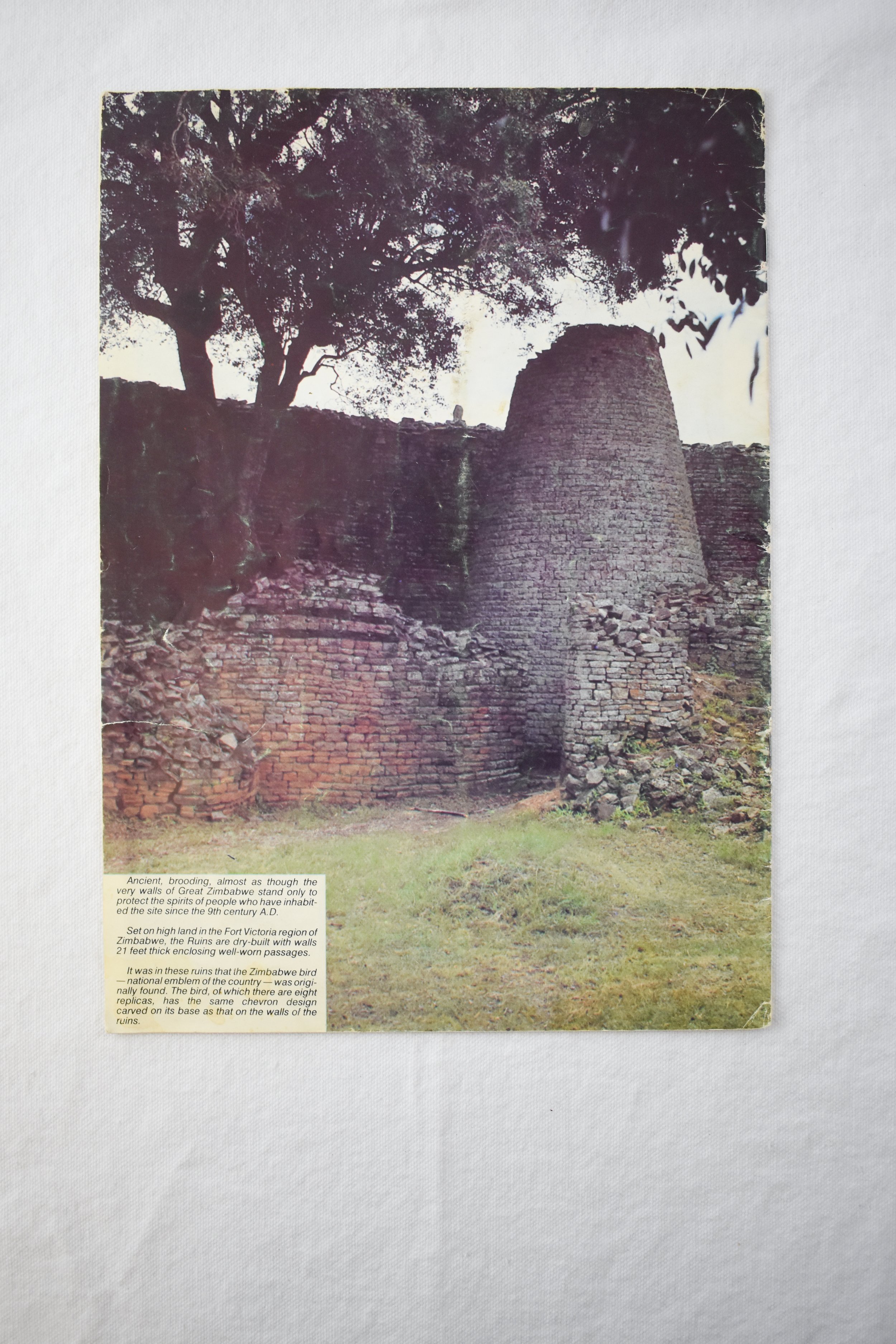
Back cover of a commemorative book marking Zimbabwe’s independence from Rhodesian rule in 1980. The image shows the ruins of Great Zimbabwe, a medieval city in southeastern Zimbabwe that is thought to have been the capital of an Iron Age empire established by ancestors of the Shona people. The site is also the country’s namesake, making Zimbabwe the only country in the world to be named after an archaeological site!
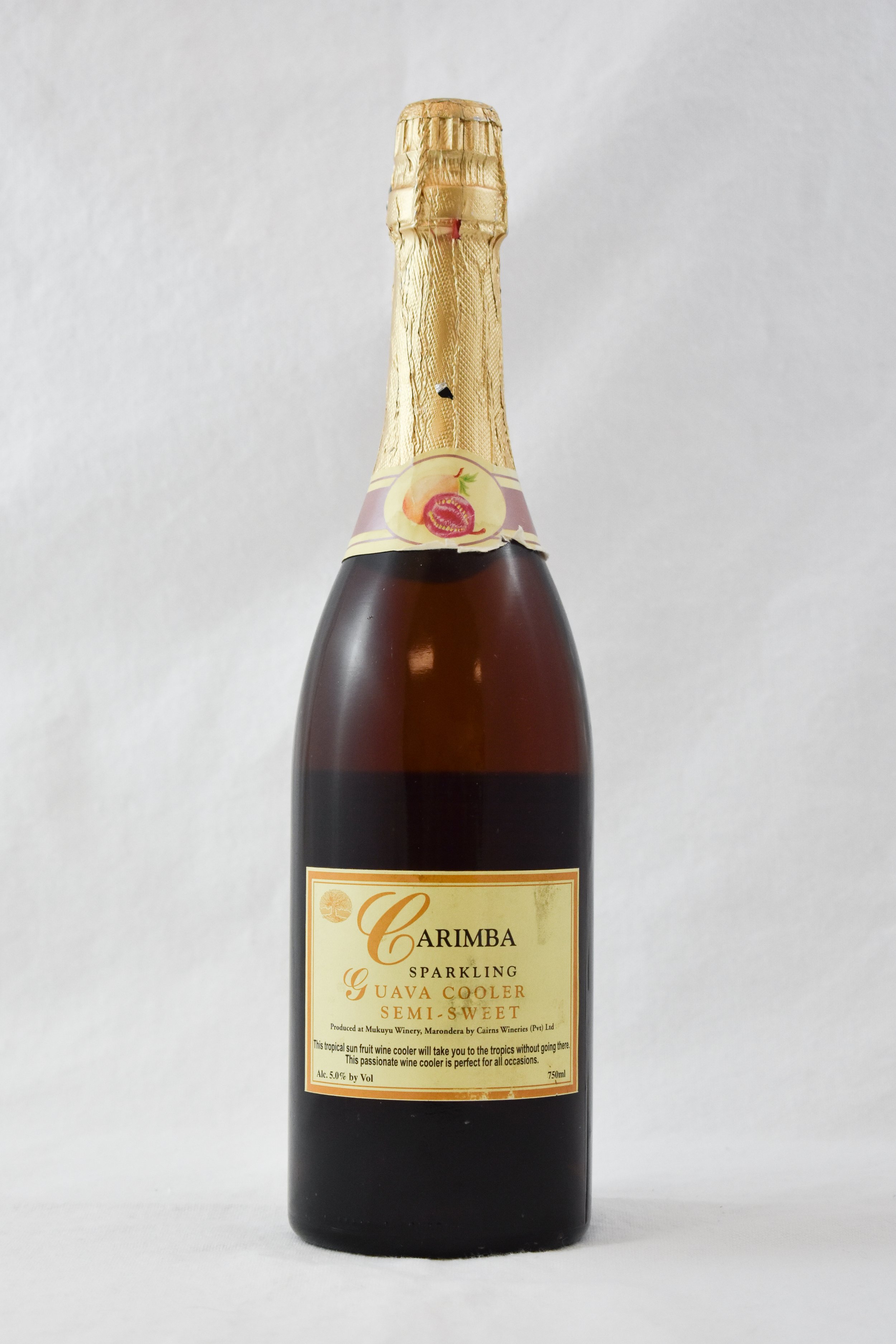
A bottle of Zimbabwean sparkling wine. Small-scale winemaking was first brought to Zimbabwe by the British in the early 20th century, although Zimbabwean viticulture has remained low-key with little (if any) wine being exported. However, the 2018 documentary “Blind Ambition”, about Zimbabwean sommeliers attending a wine-tasting competition in France, has brought attention to Zimbabwe as Black sommeliers break into a predominantly European scene.
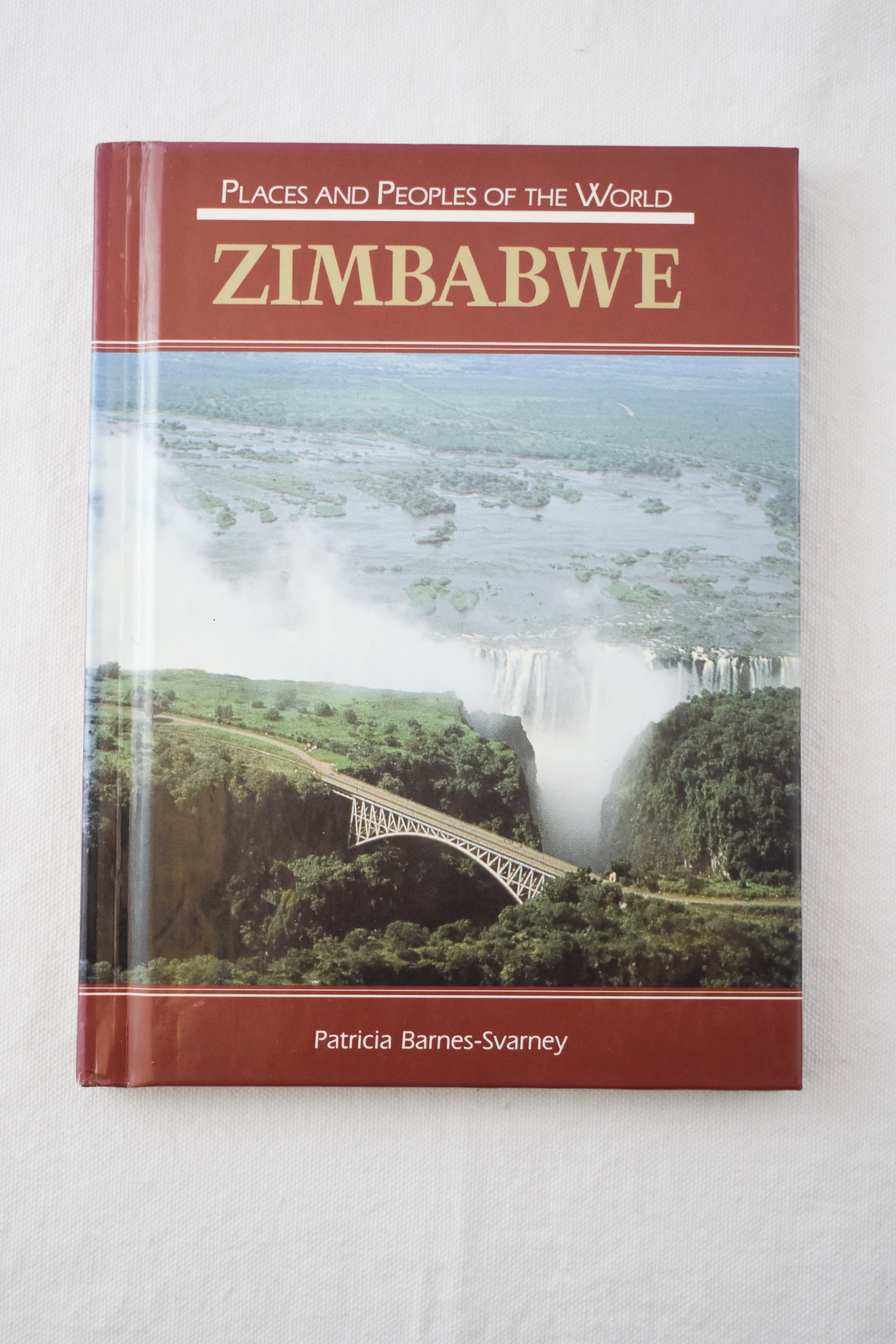
A promotional book for tourists used to promote Zimbabwe’s natural beauty. Victoria Falls is featured prominently on the cover. Also seen is Victoria Falls Bridge over the Zambezi River, which forms the border between Zimbabwe and Zambia.
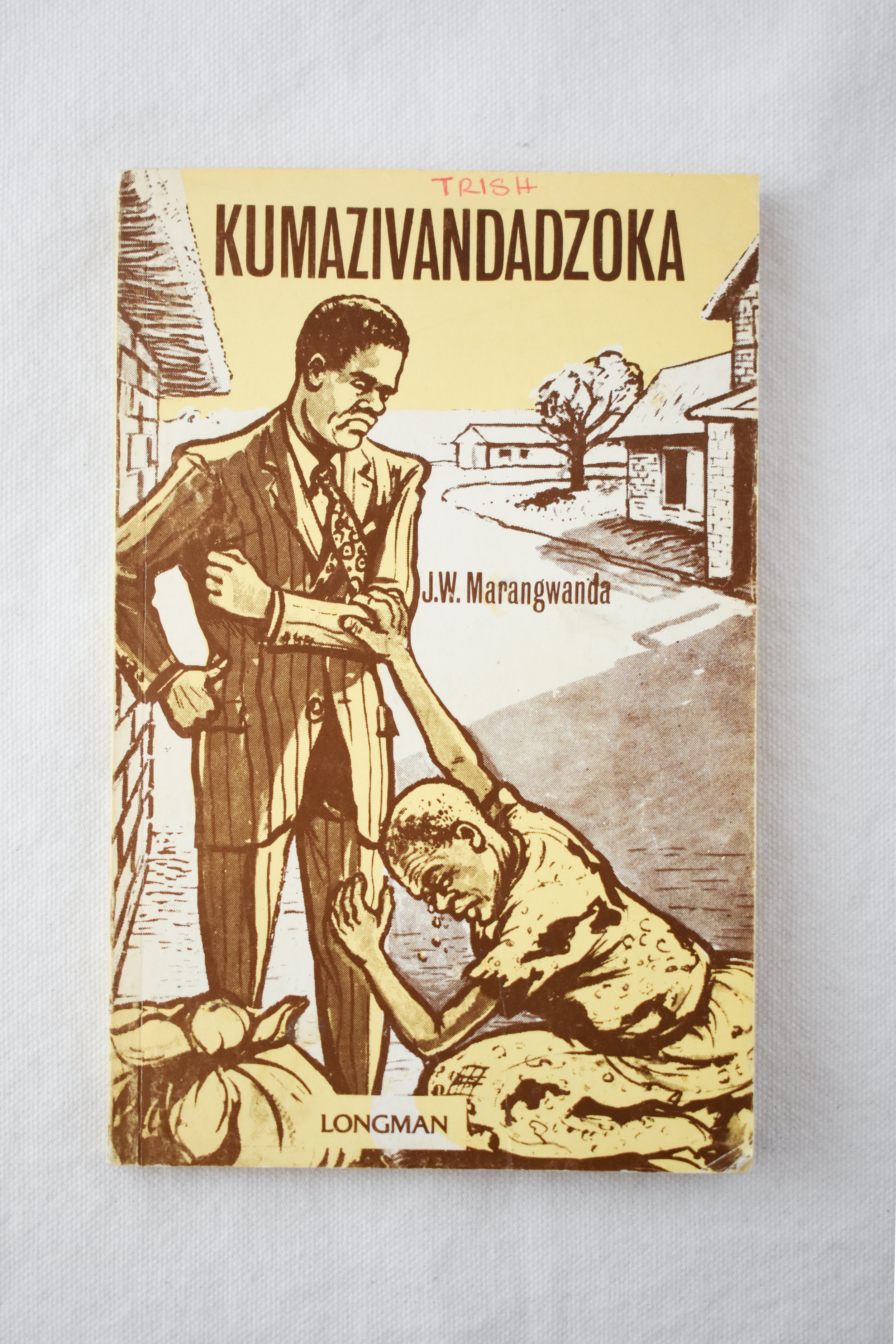
An earlier work of fiction in Shona from 1959 by pioneering Shona novelist J.W. Marangwanda. The title translates to “School of Experience.”
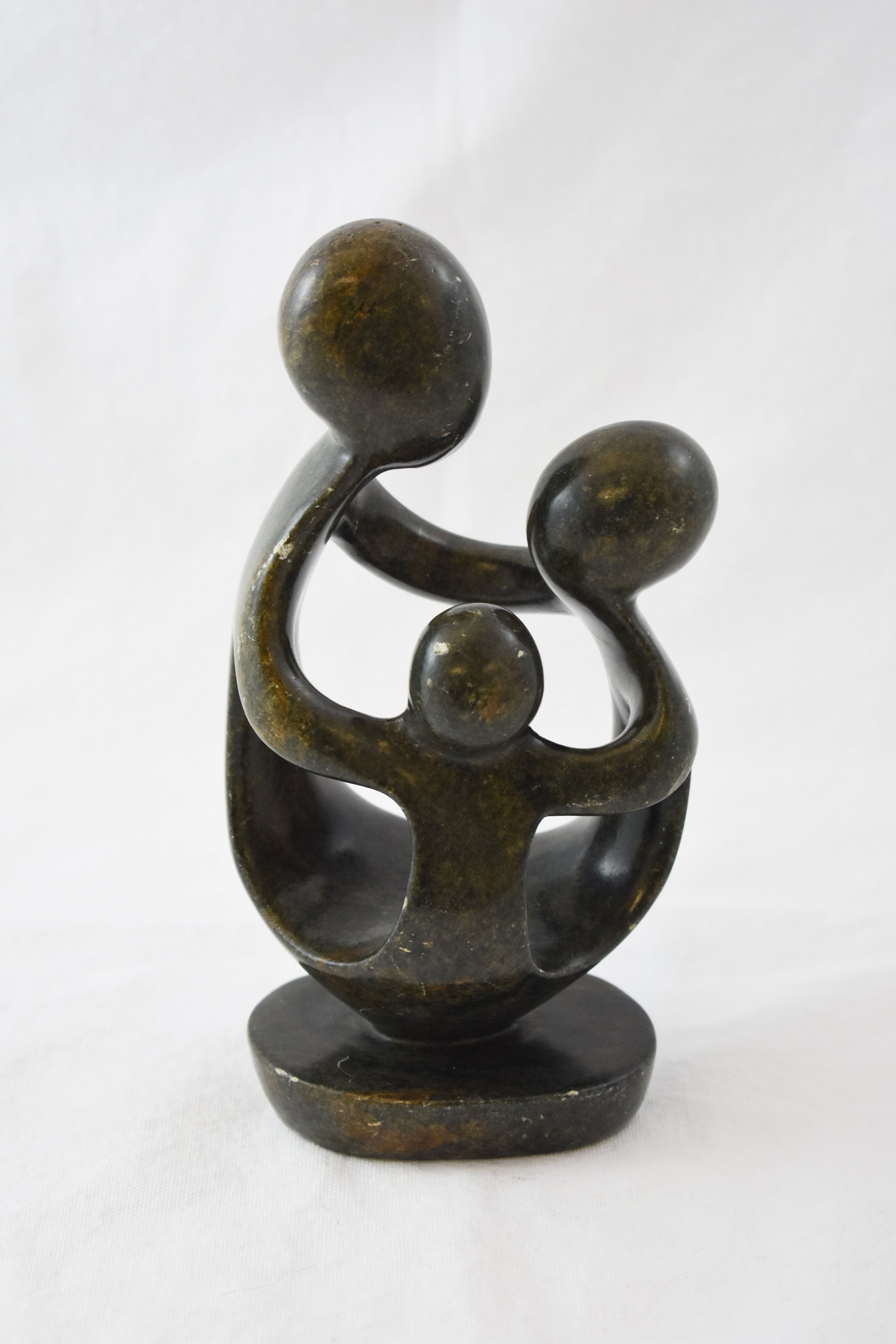
Small statue made from verdite, a type of serpentine stone common in Zimbabwe. The Shona people have a long tradition of stone-working and have become world-famous for their stone sculptures. Most sculptures are made for decoration and were rarely exported due to a Shona spiritual connection with the ground from where the stone is mined.
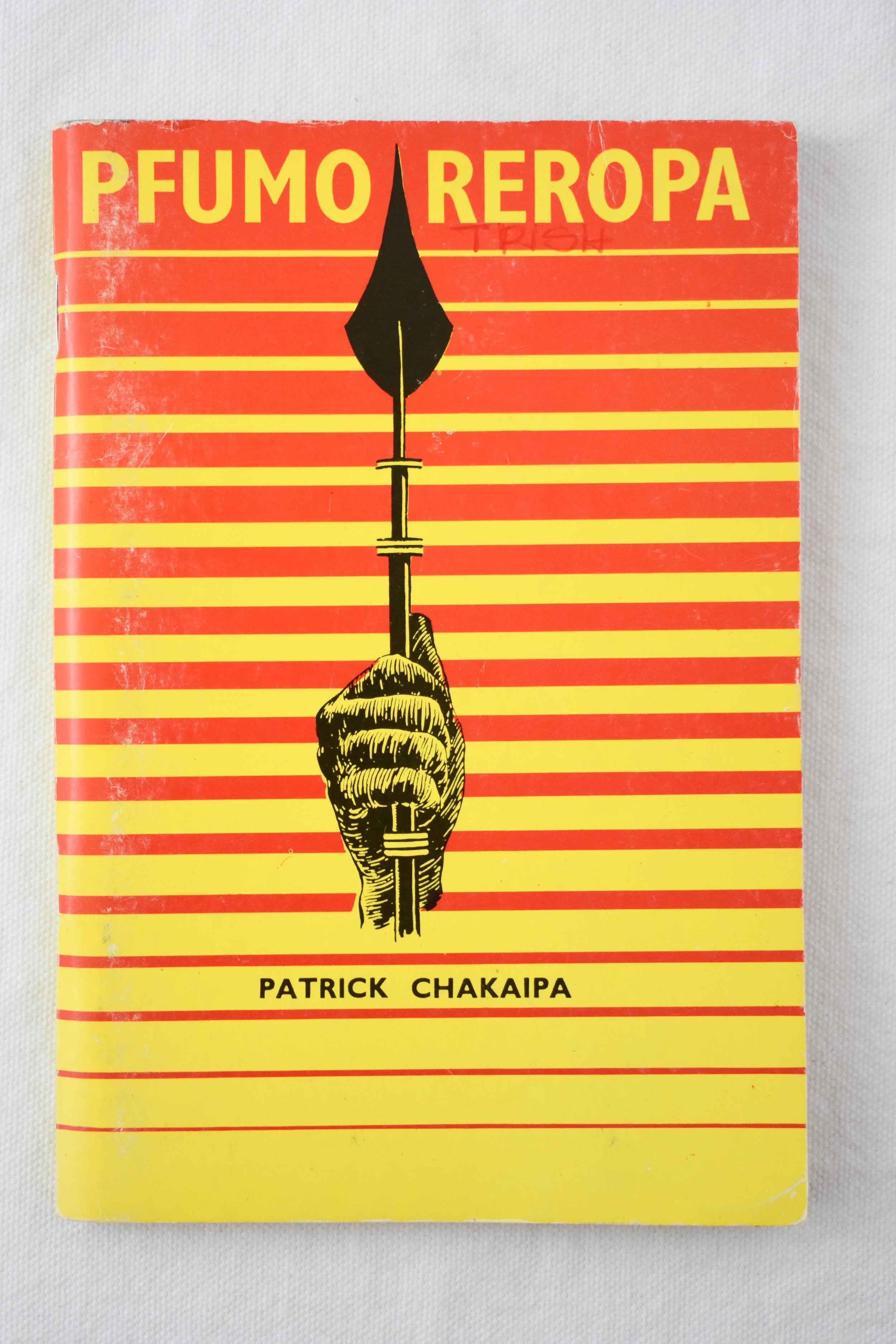
Another work of fiction in Shona, written by Patrick Chaikapa, who was the first Roman Catholic Archbishop in Zimbabwe. The book tells the story of a tribal chief who manipulates traditional systems of power to his own advantage, thus depicting the dangers of misusing power.
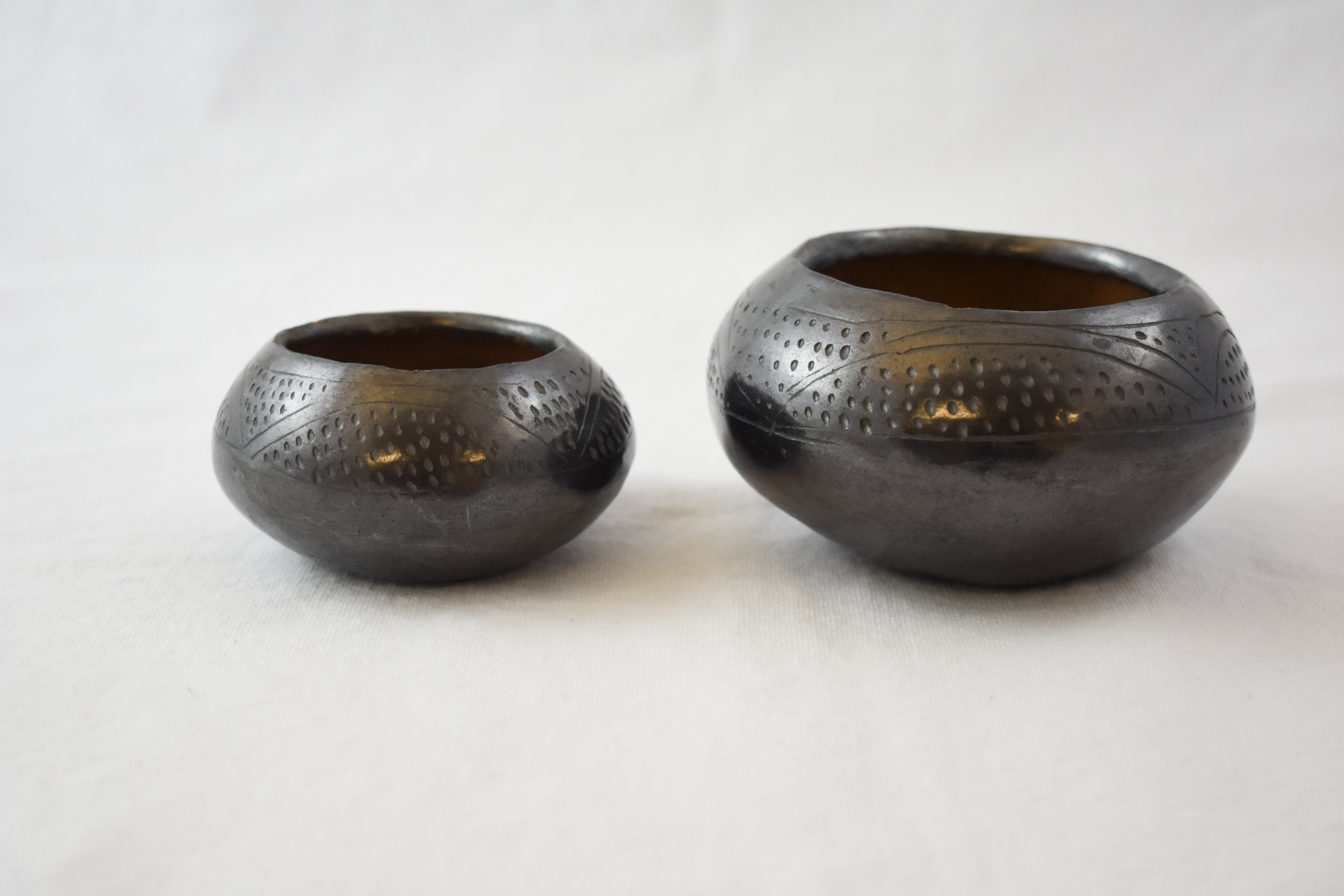
Pottery has a long tradition in Zimbabwe. Clay and soapstone are the two most common materials, with clay being more common before European colonization. Clay pots were traditionally used to carry water and beer (called chirongo), store dry food (called gaha), and by n’angas (healers) for holy purposes (called mbiya). Now, they are often sold as souvenirs; unique painted designs differentiate commercial from traditional pottery.
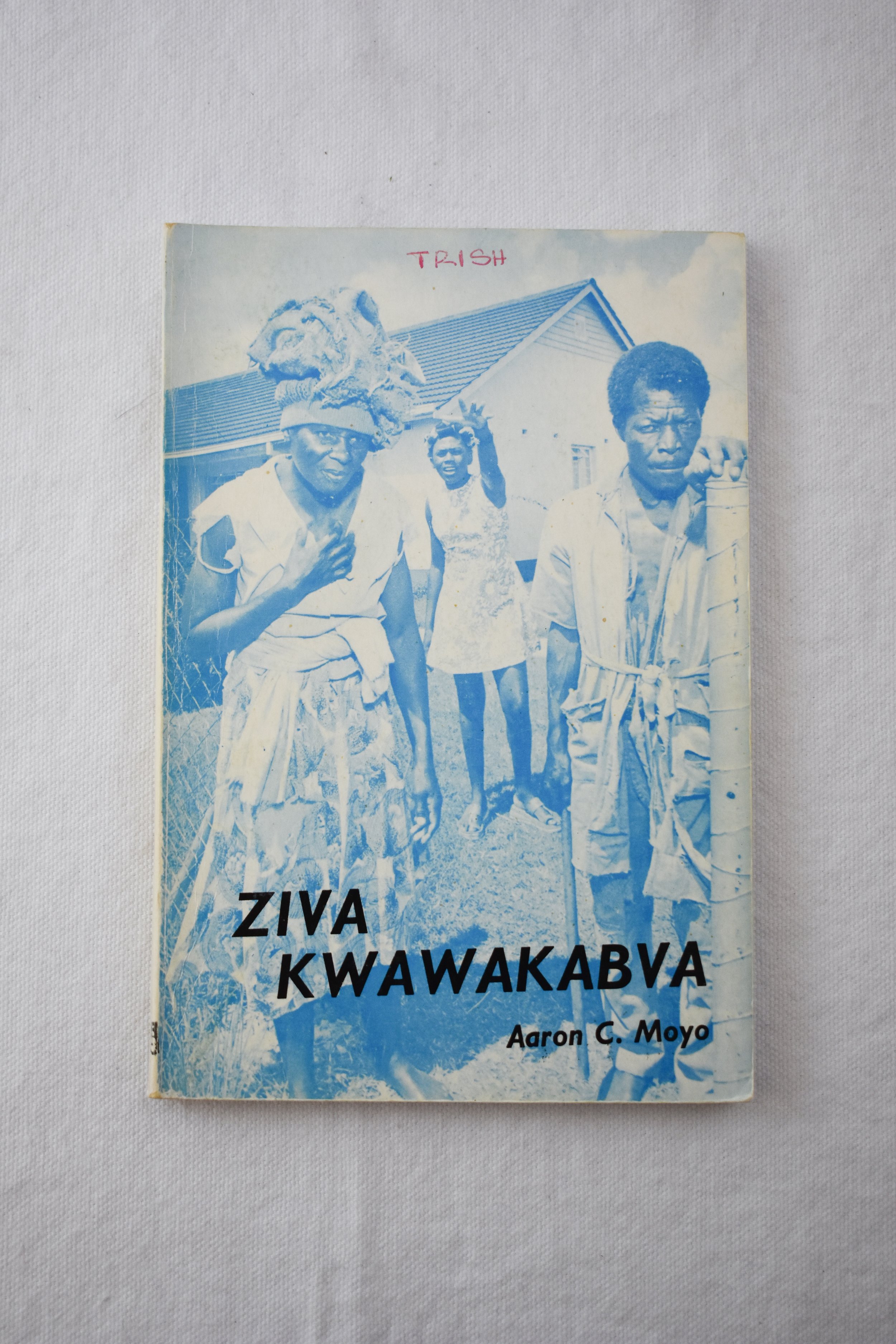
A book of fiction written in Shona, one of Zimbawbe’s 16 official languages. The book was turned into a television drama. The author, Aaron Moyo, grew up under white minority rule in a rural farm town in central Zimbabwe.
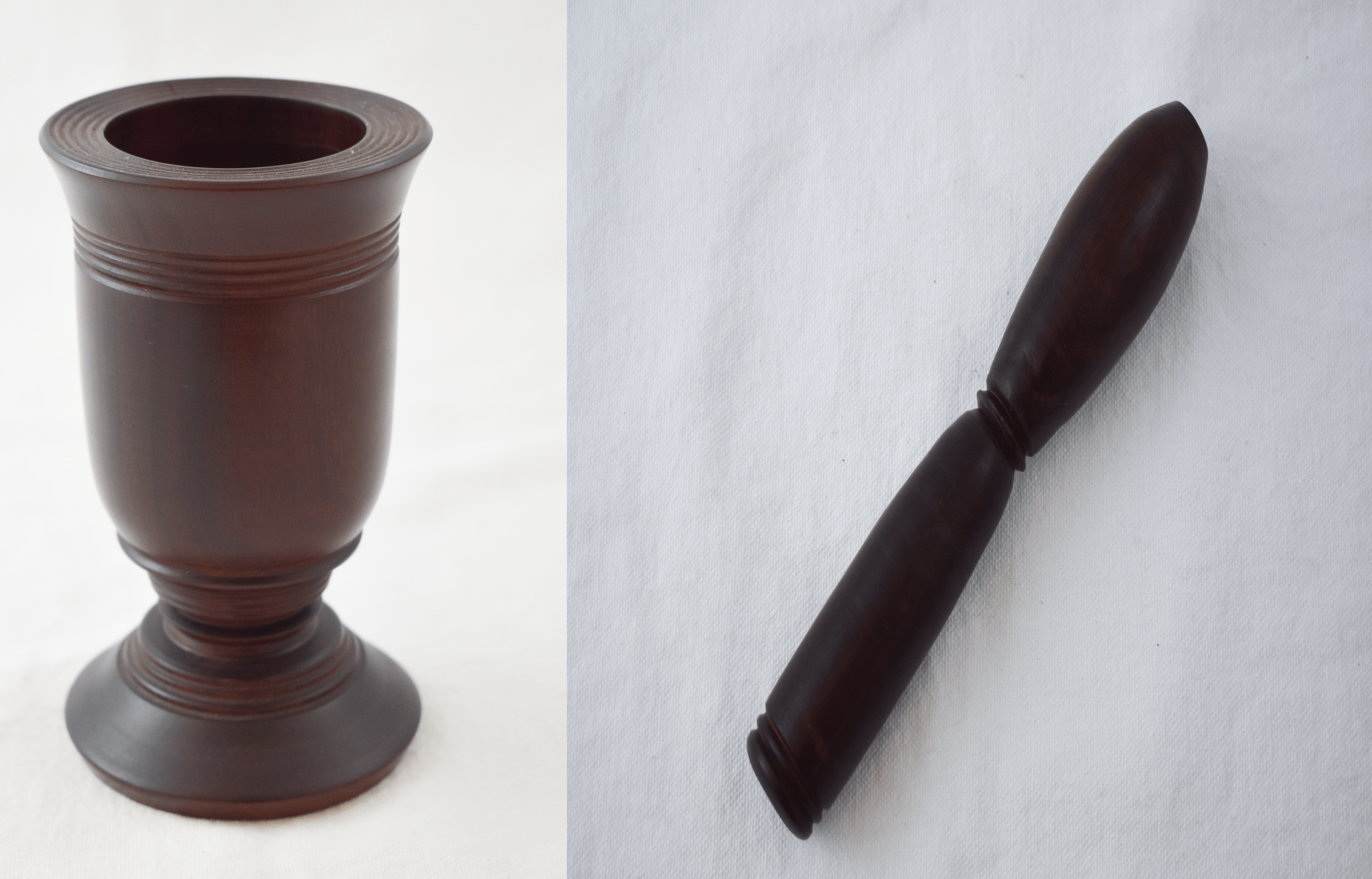
Mortar and pestle set which would have been used to grind foods such as groundnuts and maize to make maputi (roasted maize kernels) and mutakura (made from Bambara groundnuts).
Candace Knoll
“Slumber not in the tents of your fathers. The world is advancing. Advance with it.”
This quote is one that Candace Knoll learned from a grade three teacher that gave her the strap. Her actions have shown that she has taken it to heart, learning about her ancestors and their struggles, and striving to move forward herself.
Candace Knoll was born in 1961 into a large family in St. Boniface, Manitoba, a suburb of Winnipeg. Raised by a single mother working several jobs to make ends meet, Candace is the third youngest of nine.
Her family moved around a lot as a kid, and she had attended eight different schools by the age of 16. Her mother’s family went from Saskatchewan to Winnipeg, and her father’s family are from Ontario. Both sides of her family have long interesting roots in parts of Canada and the United States. While Candace’s mother is first generation Canadian (whose family came from the southern United States), Candace is fifth generation Canadian through her father’s family who are descended from Chief Joseph Brant through his youngest daughter, Elizabeth. Candace’s paternal grandfather, Gordon Brown, was injured in WWI and was never compensated. His parents were Agnes Morey and Andrew Brown. Agnes Morey was the daughter of former slave, John Morey and Elizabeth Brant.
To take some of the pressure off her mother, Candace got her first job when she was in Grade 6, at Haynes Chicken Shack in Winnipeg, a company that employed several of her siblings at one point or another. She remembers the generosity of her mother and the sense of community she had growing up. Even when the family had very little, her mother would open the door to their home to share what they had with people in need. This sense of the importance of community has stuck with Candace and continues to play a significant role in her life now.
The family’s history has more than its share of tragedies and triumphs. Candace’s grandmother’s nephew, Jesse Washington was a victim of lynching in Waco, Texas in 1916 when he was just seventeen years old. Candace’s sister was murdered in New Westminster, and Candace herself has experienced racism throughout her life. In contrast to these things, are the successes. Her mother persevered through hard work and determination to raise her children to stand up for themselves. Before this, her mother’s relative Blanche Kelso Bruce (aka B.K. Bruce) went from being born a slave in 1841, to being the first African-American to serve a full term in the United States senate. Candace’s maternal uncles were also very influential in the struggle for equal treatment and rights of the Black railway sleeping car porters.
Candace herself has carried on this strong tradition. As a teenager she was named “Miss Ebony” in Winnipeg, and as an adult she was very active with the Toastmistress Organization (now called International Training in Communication or ITC), winning numerous local and national awards as well as 3rd place in the International ITC Power Talk Competition for her speech titled “MAMA’s Theory.” “MAMA” is her acronym for Music, Affirmation, Meditation and Affirmations, all of which lead to success. She also won second places in the ITC international competition. She has put the skills learned through Toastmistresses to good use in organizing one of the family’s bi-annual reunions in Vancouver in 1987, attended by 360 people, and for the last ten years (pre-COVID) had coached Miss BC pageant contestants.
Candace has worked for Telus for over 25 years, is a Union Steward for the United Steelworkers local 1944, also serving on the Union’s local Civil and Human Rights Committee and the USW National Anti-Racism Working Group. This is her second time serving on the Local’s bargaining committee to negotiate the terms of the working conditions for the Telus Unionized Employees Collective Agreement. Candace is a past executive board member with the New Westminster and District Labour Council (NWDLC), and is still active on the Political Action Committee. This year, Candace coordinated the National Congress of Black Women Foundation, partnering with the NWDLC and VDLC (Vancouver District Labour Council) to present two sessions with four educators for Black History Month. She is a member of the Anti-racism coalition of Vancouver.
This is the short version. You can find out more about Candace and her family in this oral history interview.
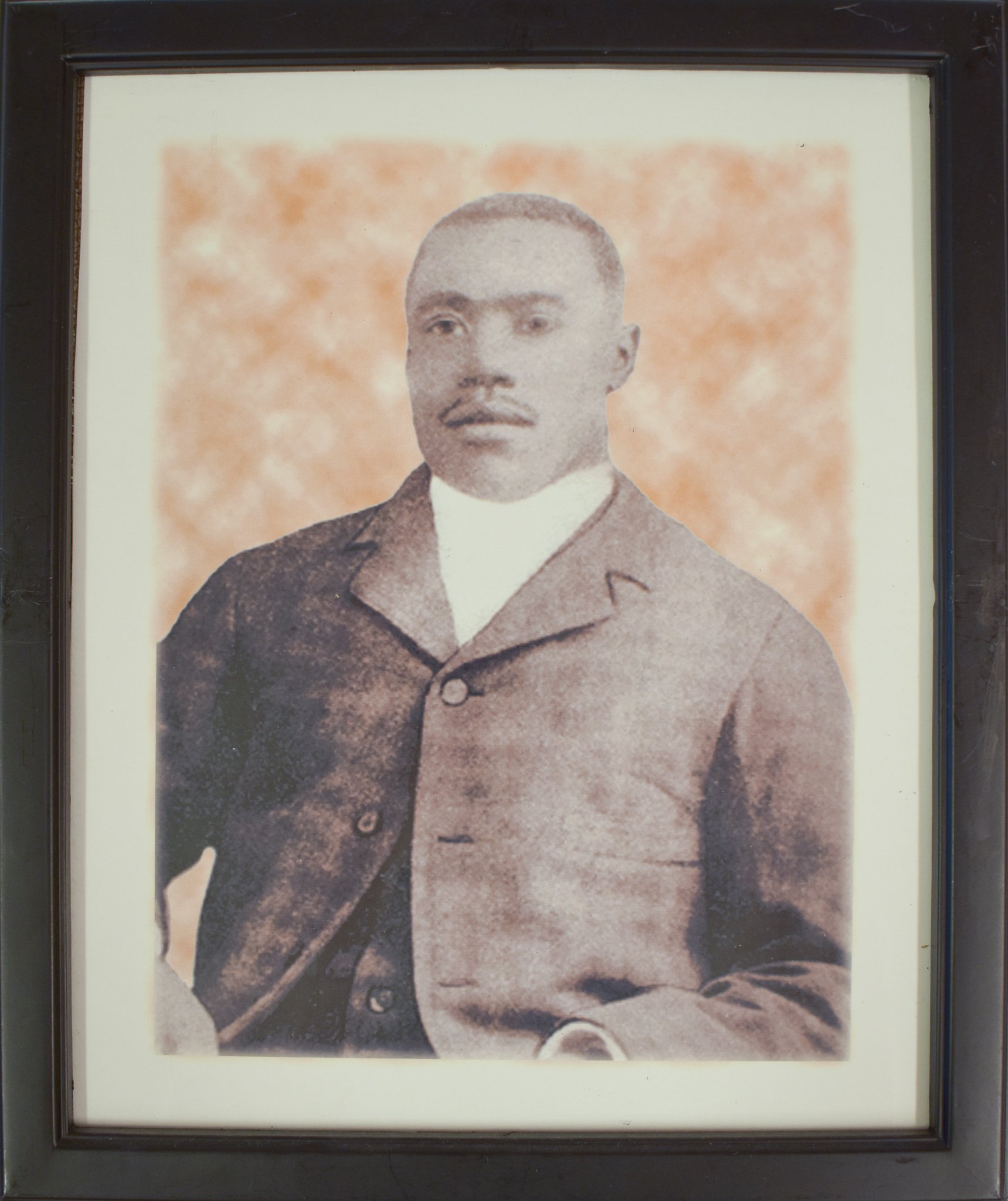
Candace’s maternal relative, Charles Williams.
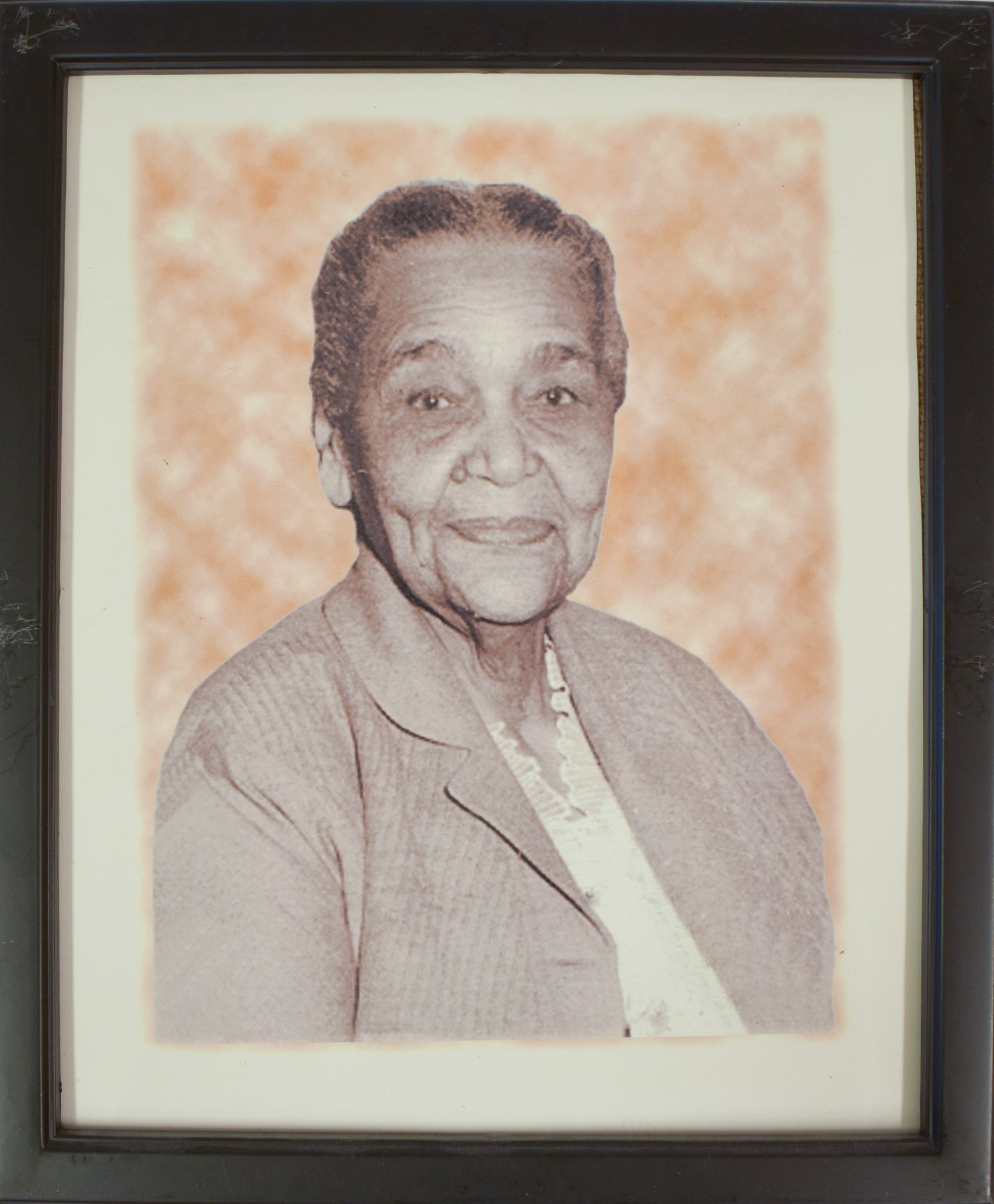
Candace’s maternal grandmother, Cornelia Williams, granddaughter of BK Bruce.
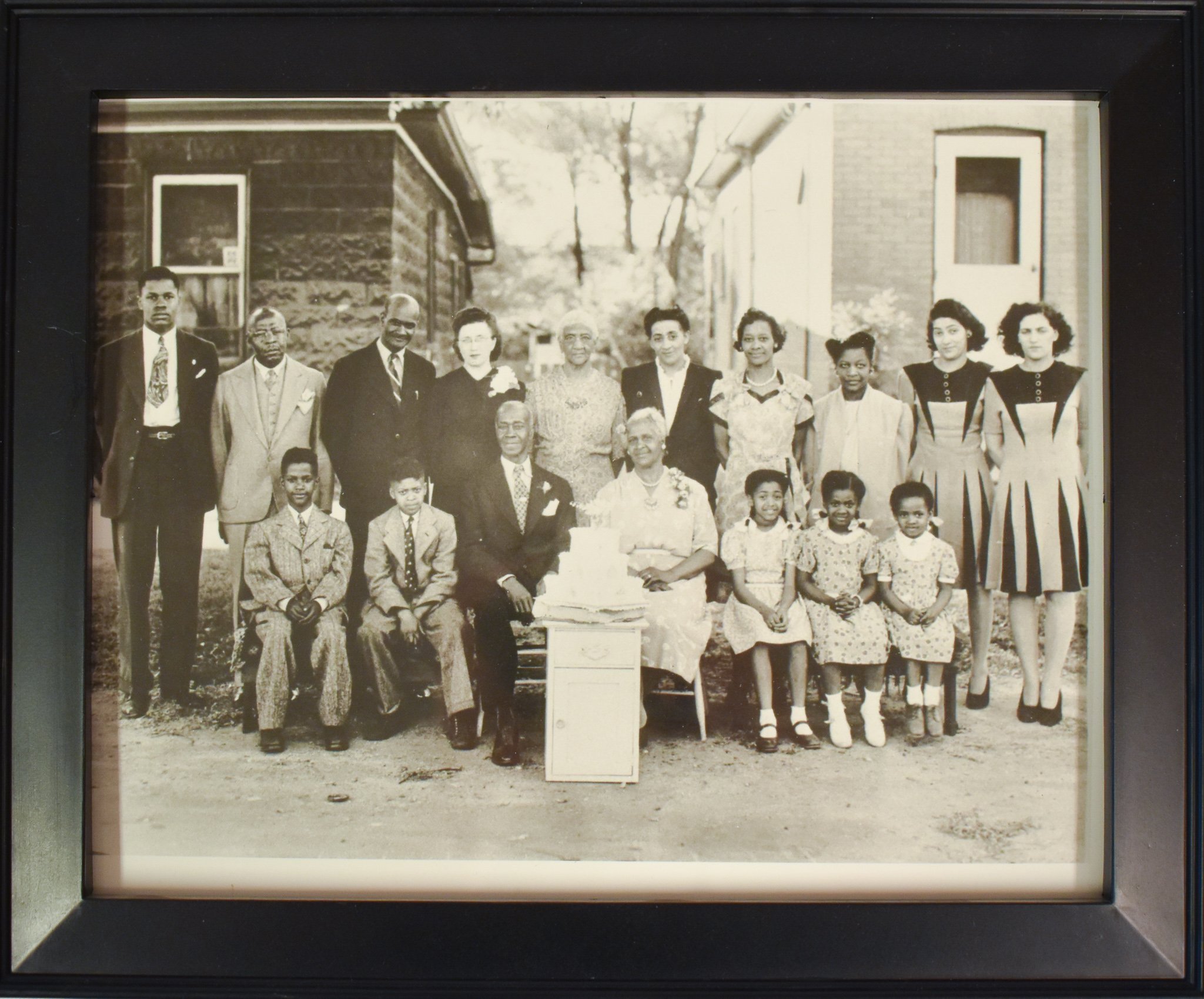
Family photo of Candace’s paternal family. The photo may have been taken at Agnes and Andrew’s 60th wedding anniversary. Top row, L to R: Unknown, Fred, Frank, Frank’s wife, Unknown, Mary, Candace’s Grandmother, Evelyn, Kathleen, Connie. Bottom row, L to R: Jimmy, Philip, Andrew (Candace’s great-grandfather), Agnes (great-grandmother), Thelma, Marilyn, Carol.
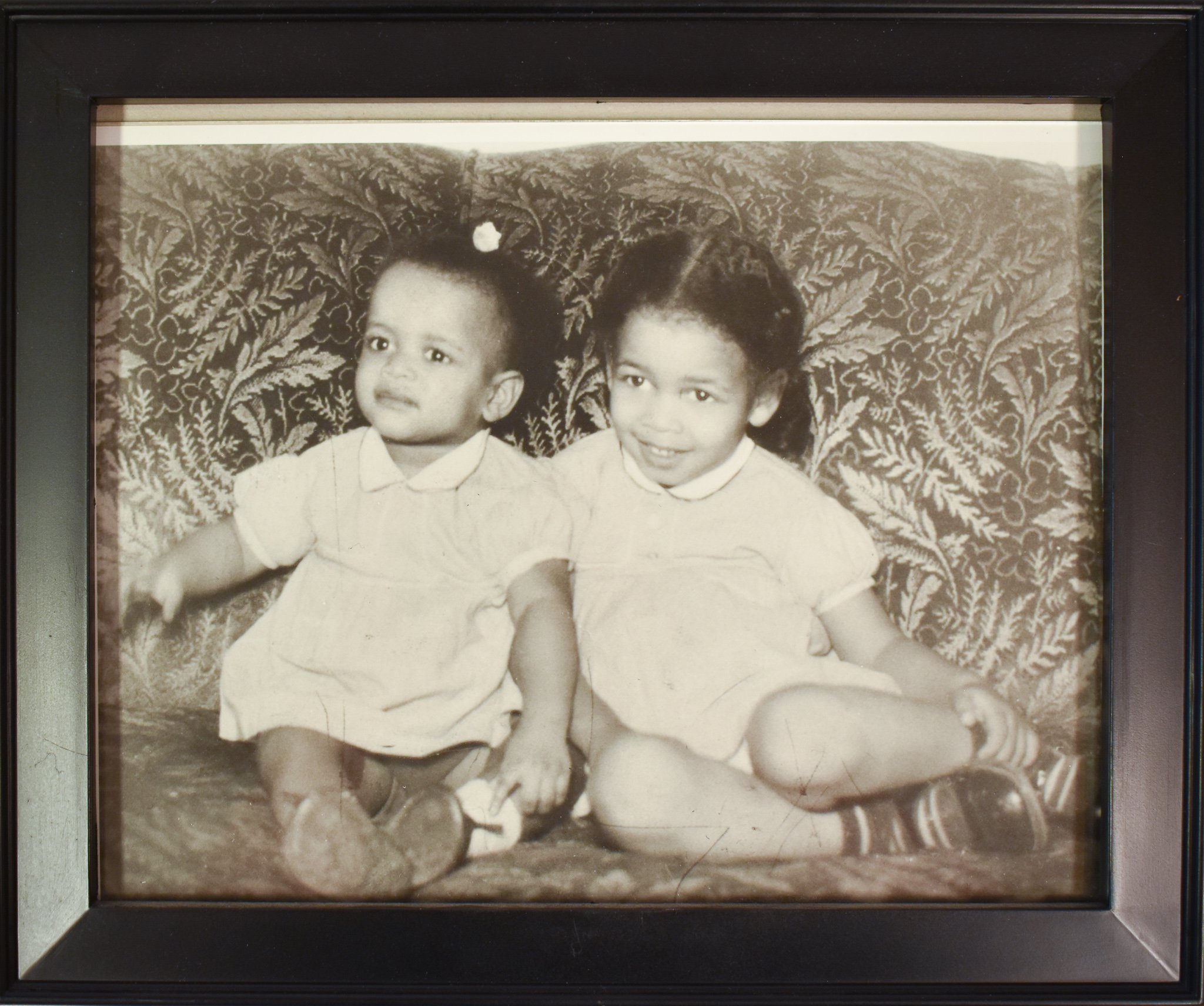
Photo of Candace’s sisters Brenda (right) and Leslie (left) from their childhood in Winnipeg.
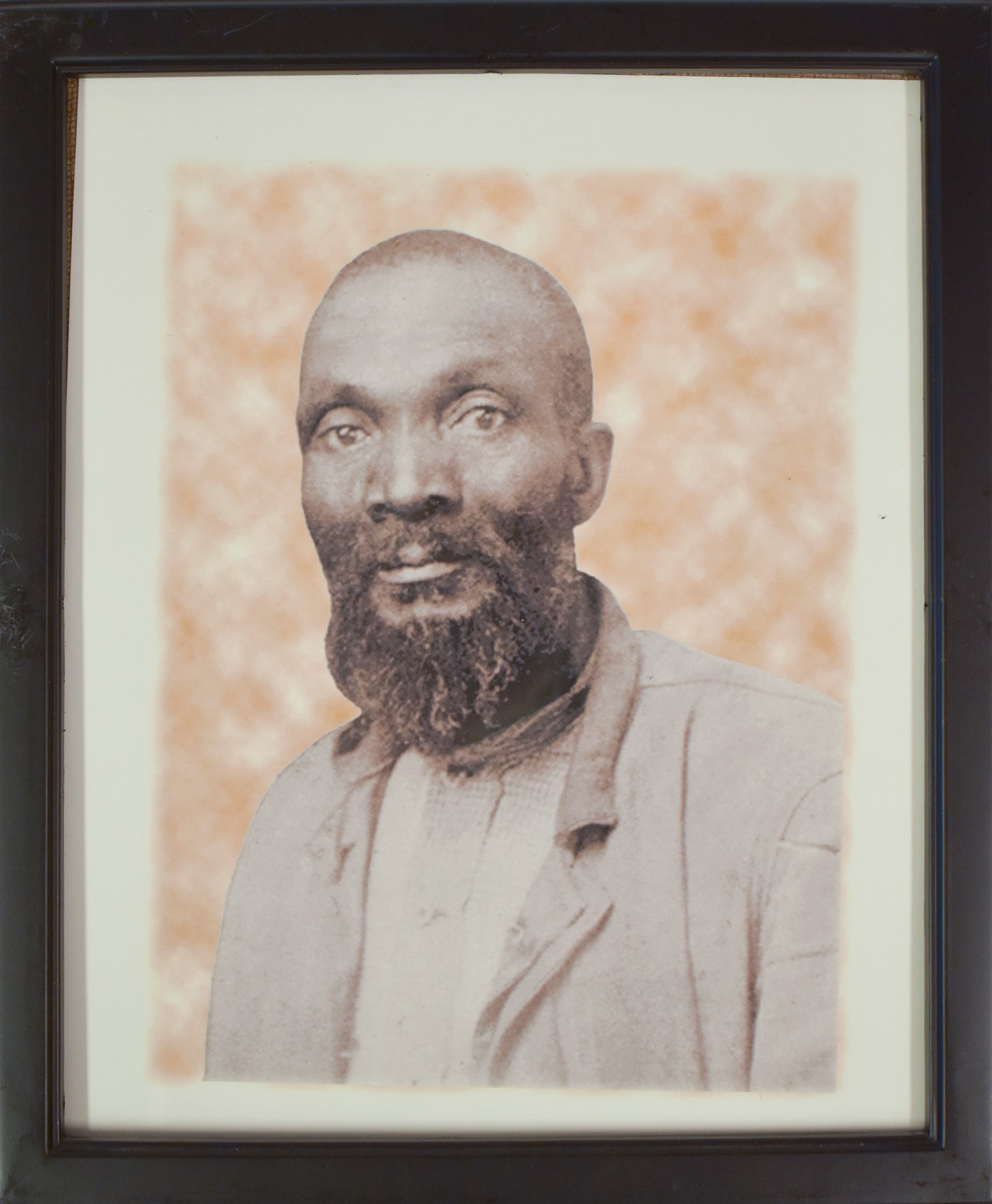
Portrait of Julius Cesar Lane (“Cecil”), Candace’s paternal great-grandfather. Cecil was born on an Indian Reservation in Tabor, Oklahoma and emigrated to Canada after the Civil War.
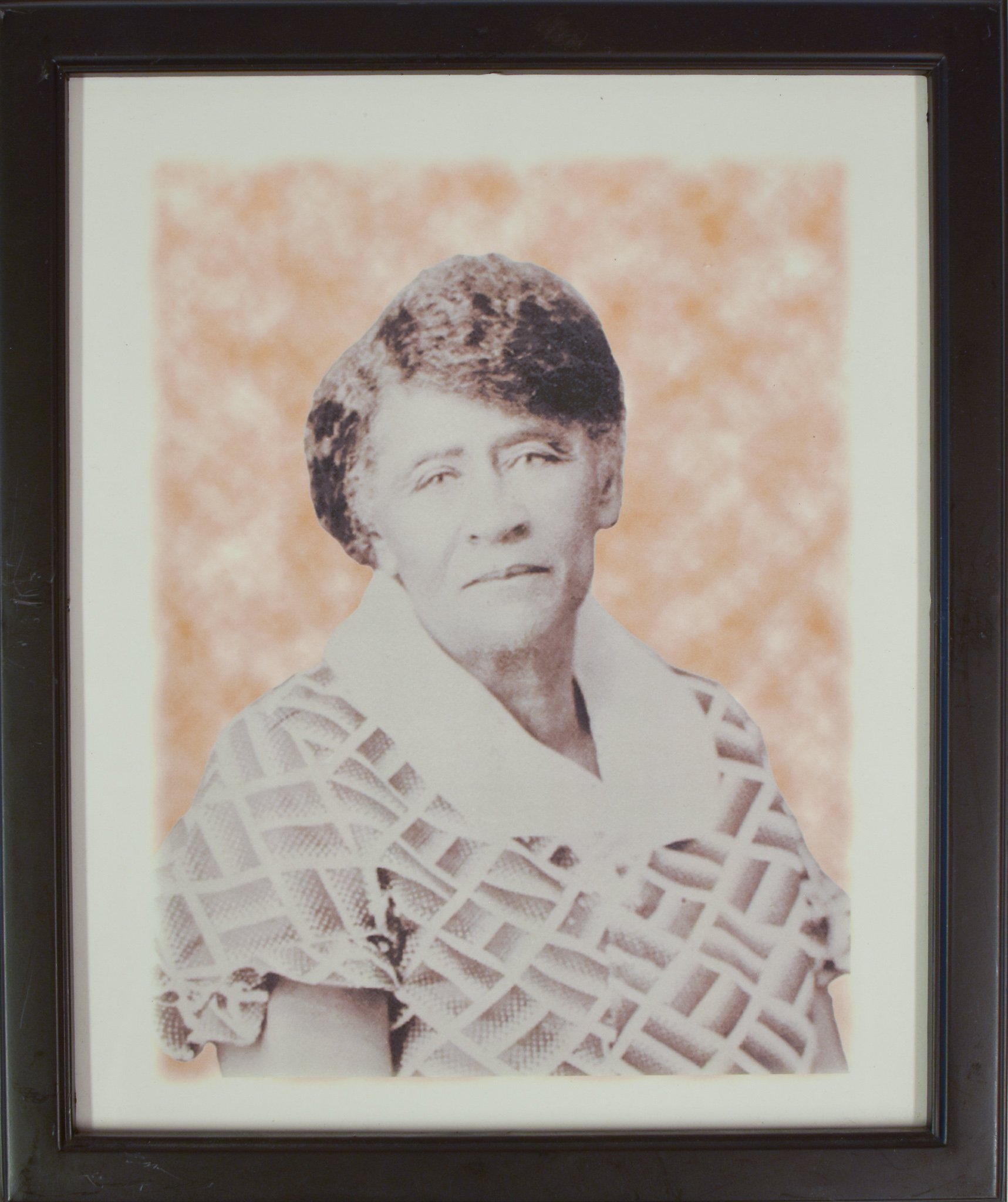
Portrait of Candace’s great-grandmother, Emma Lane.
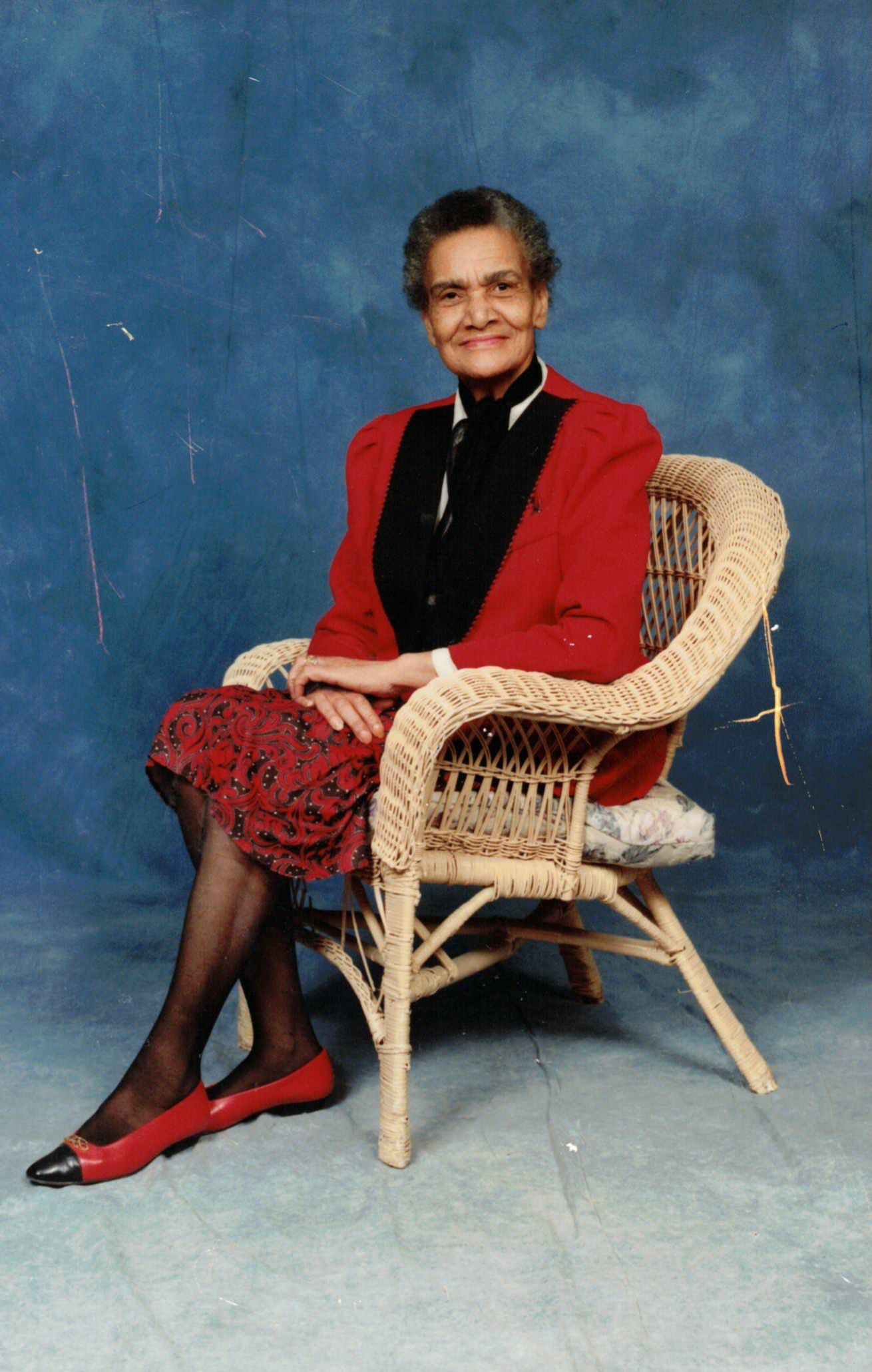
Portrait of Candace’s mother in her later years. She passed away in 2019.
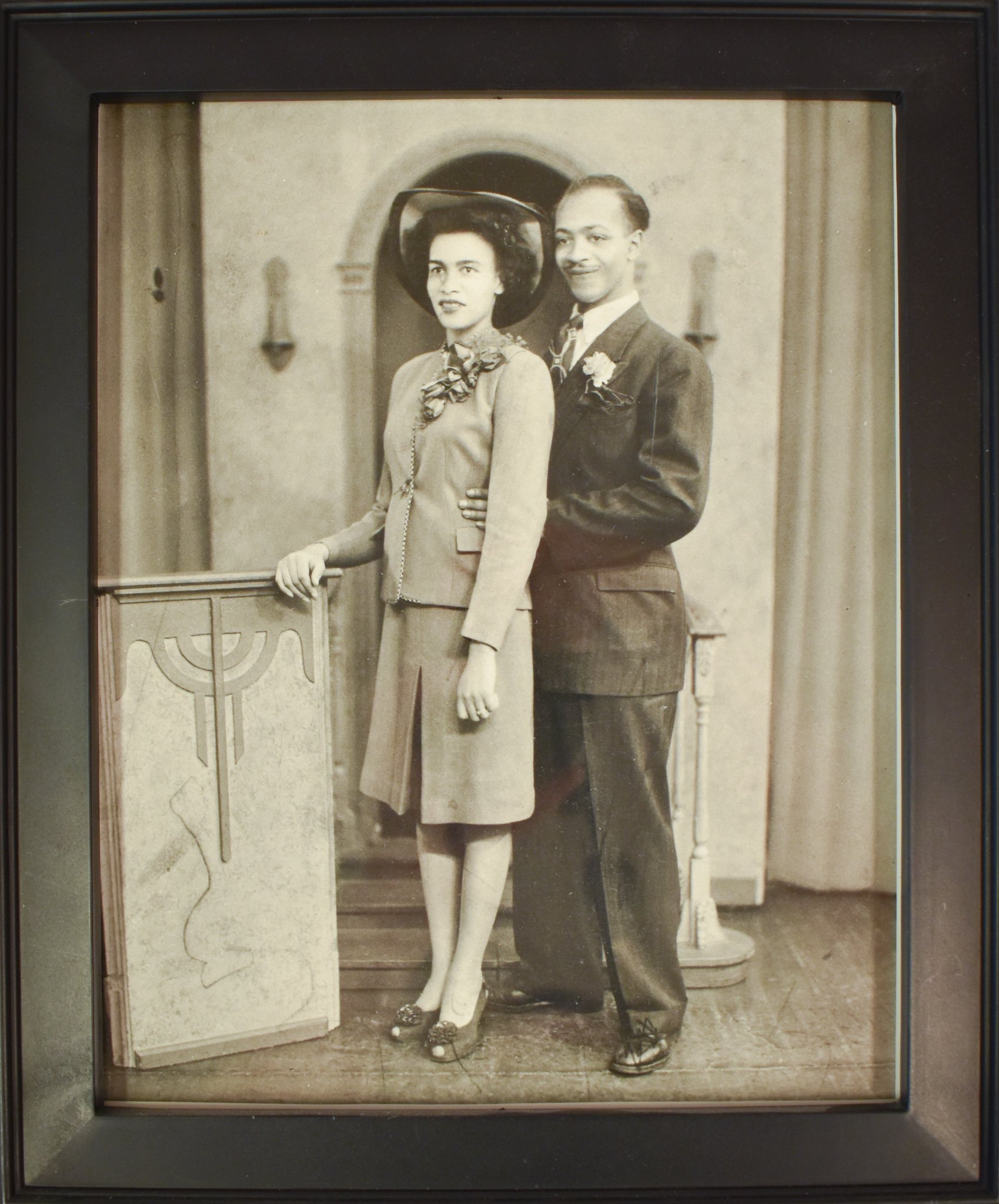
Portrait of Candace’s parents on their wedding day, circa 1950. Photo most likely taken in Winnipeg.
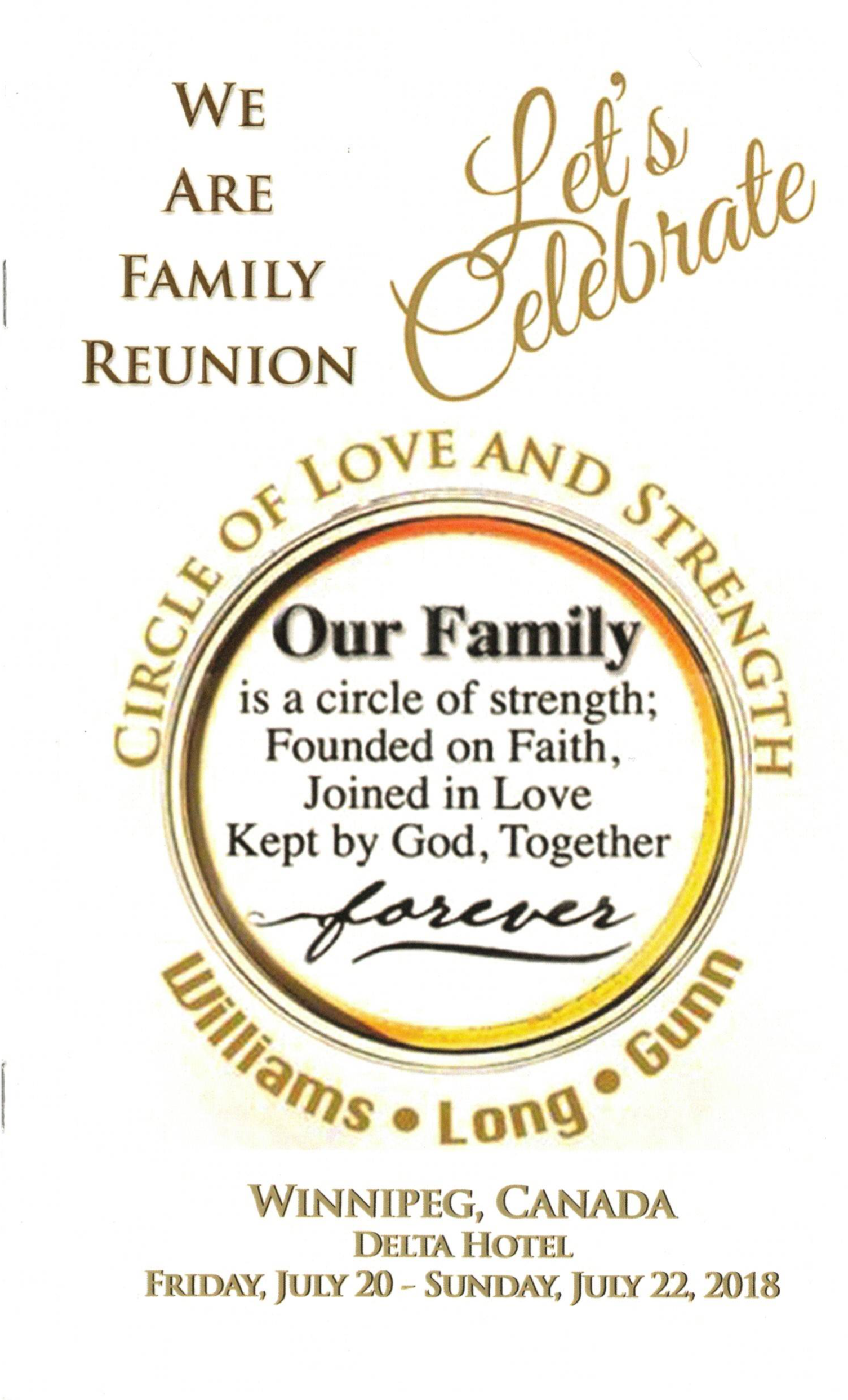
family reunion program 1
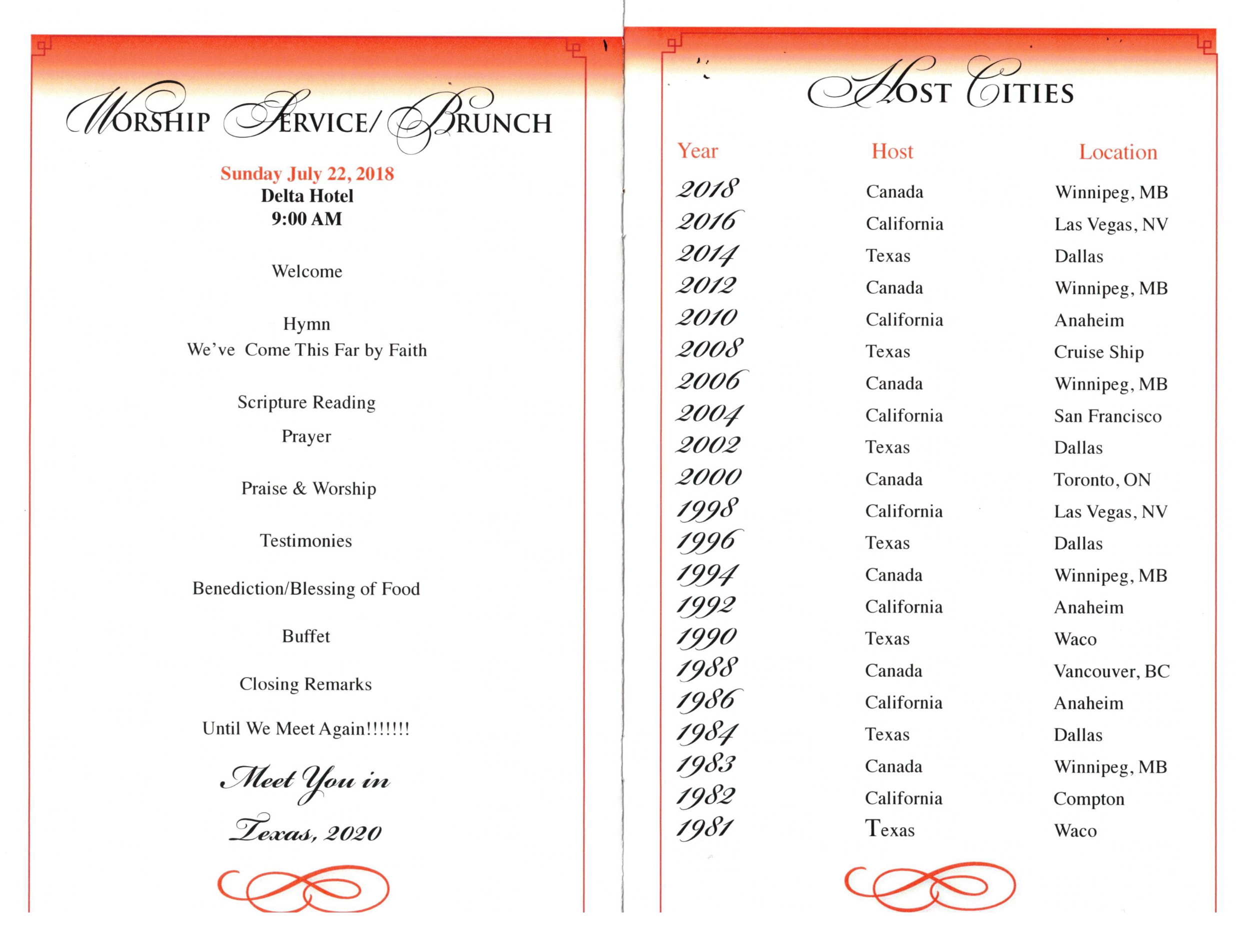
Family reunion programme interior.
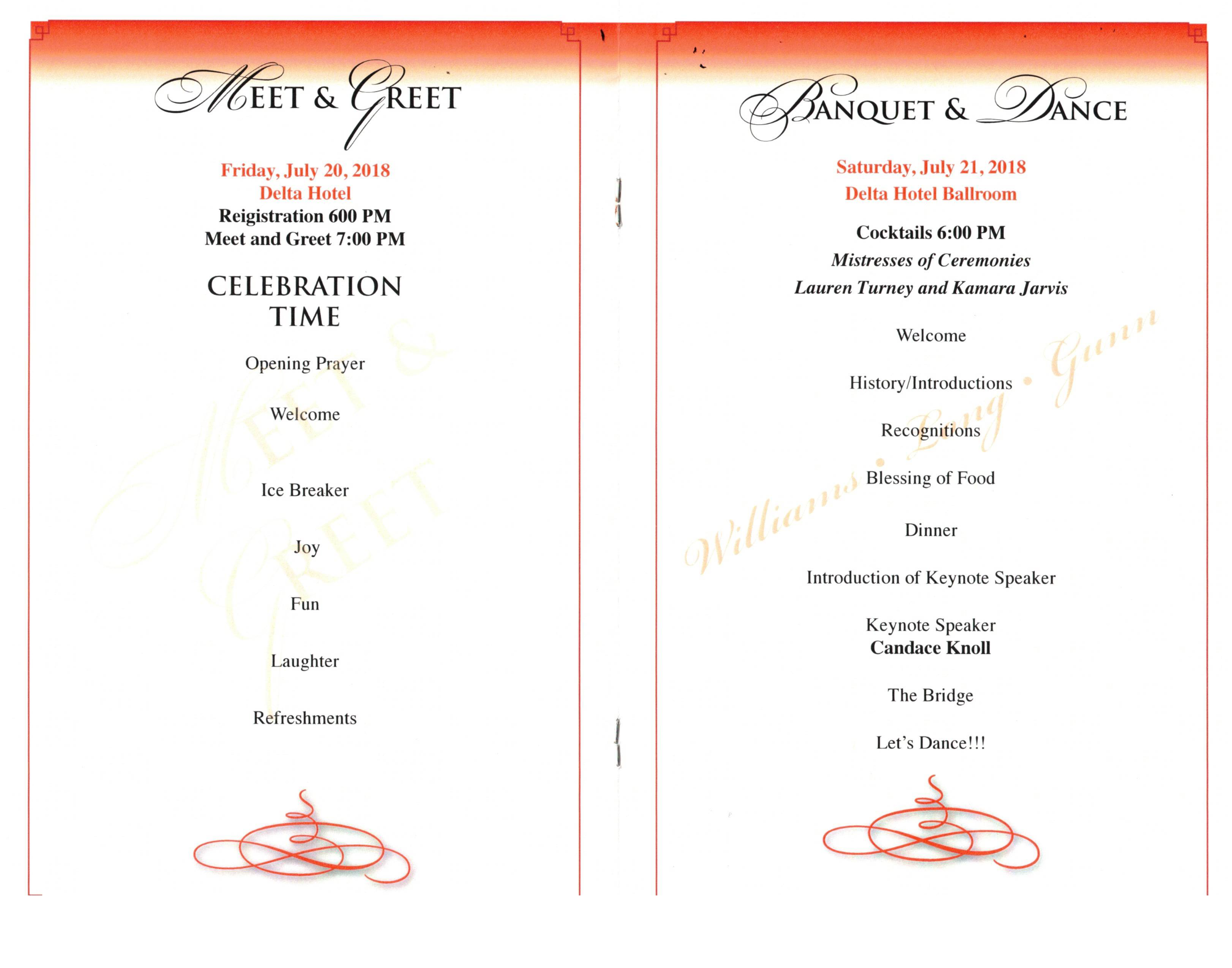
Family reunion programme interior.
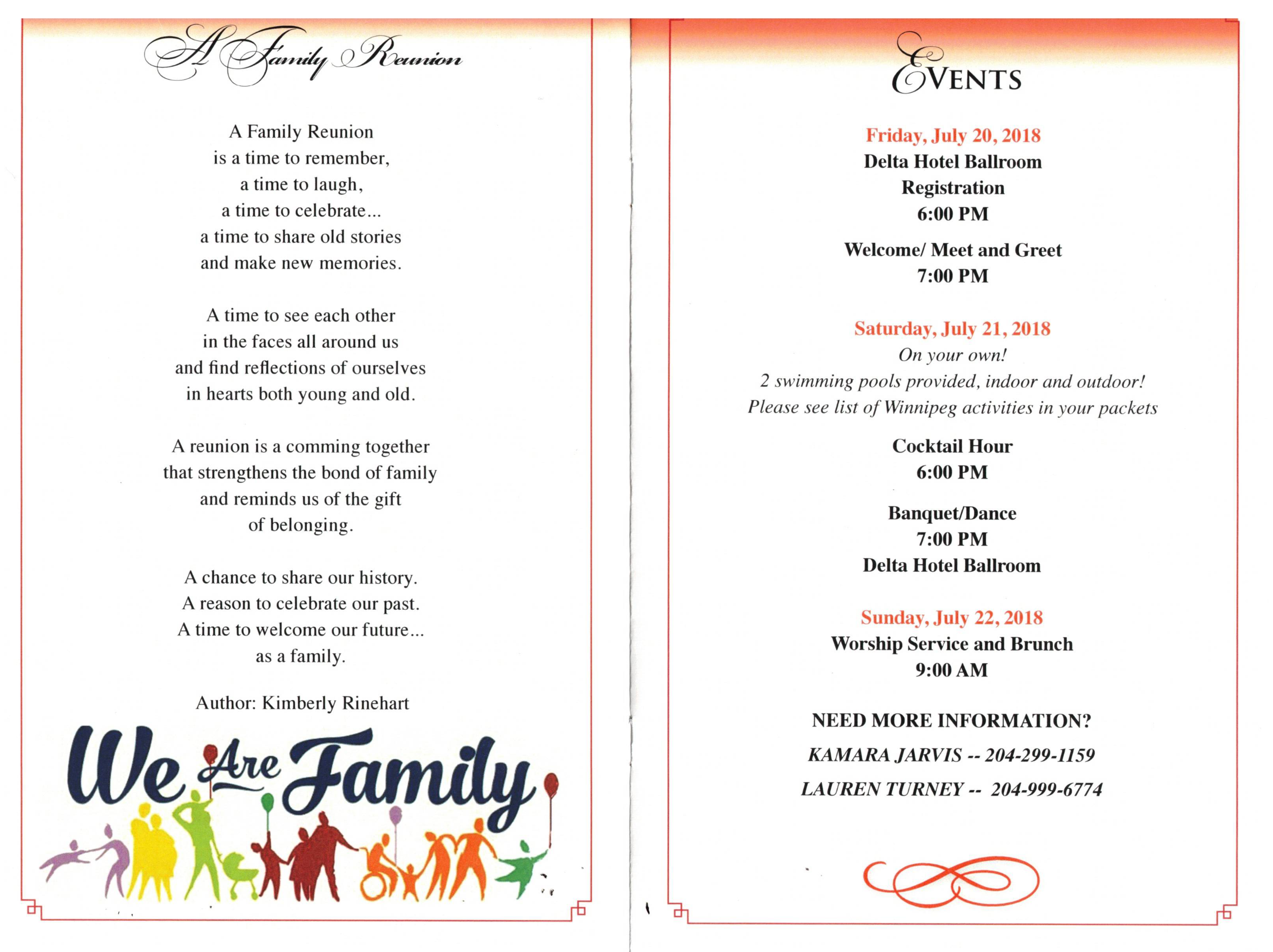
Family reunion programme interior.
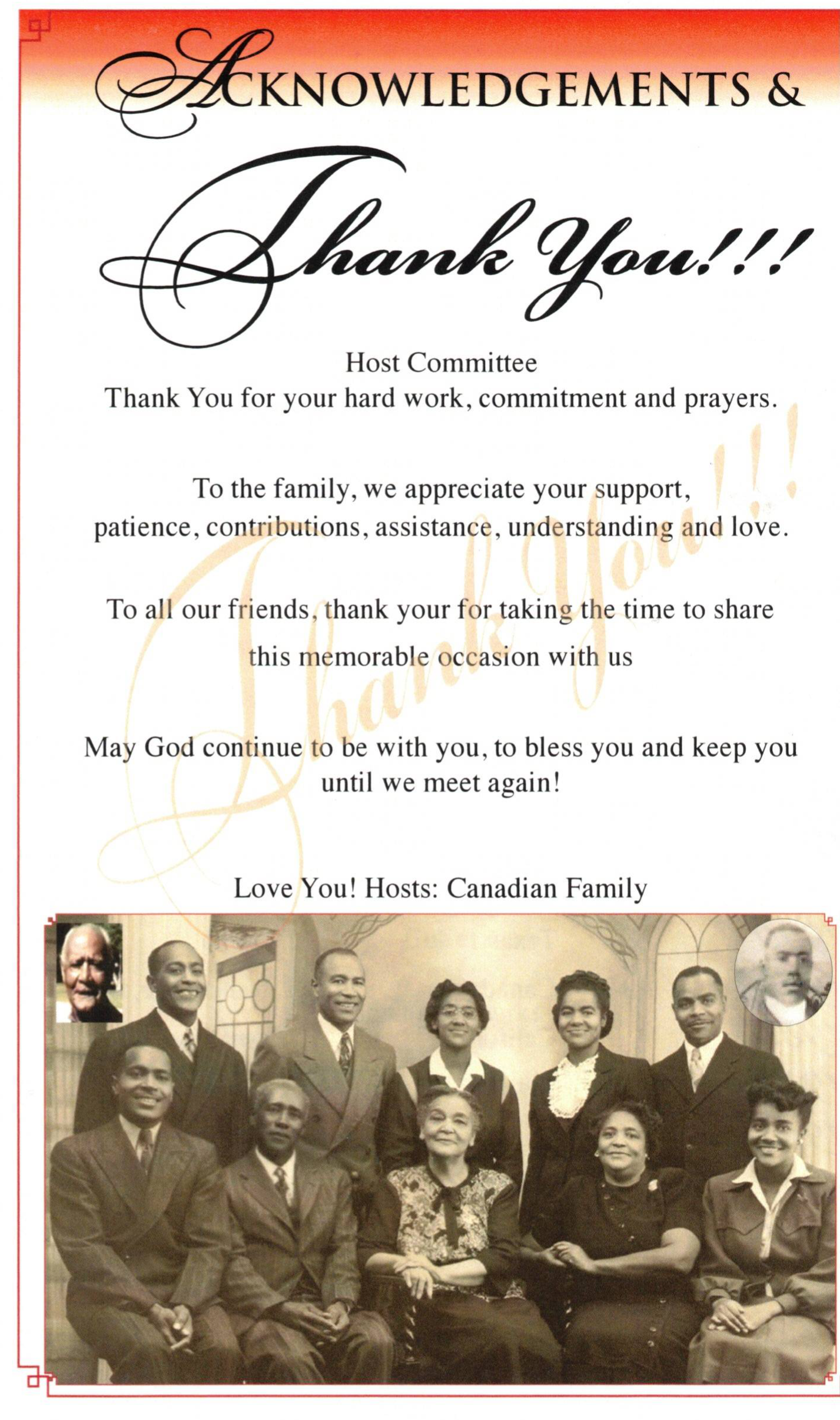
Scans of the program from the Knoll family reunion in Winnipeg, Summer 2018, which Candace organized. The reunion saw more than 300 family members from the Williams, Long, and Gunn families gather for a weekend. The families get together every two years for a family reunion. It is hosted in a different city each time, either in Canada or the United States.
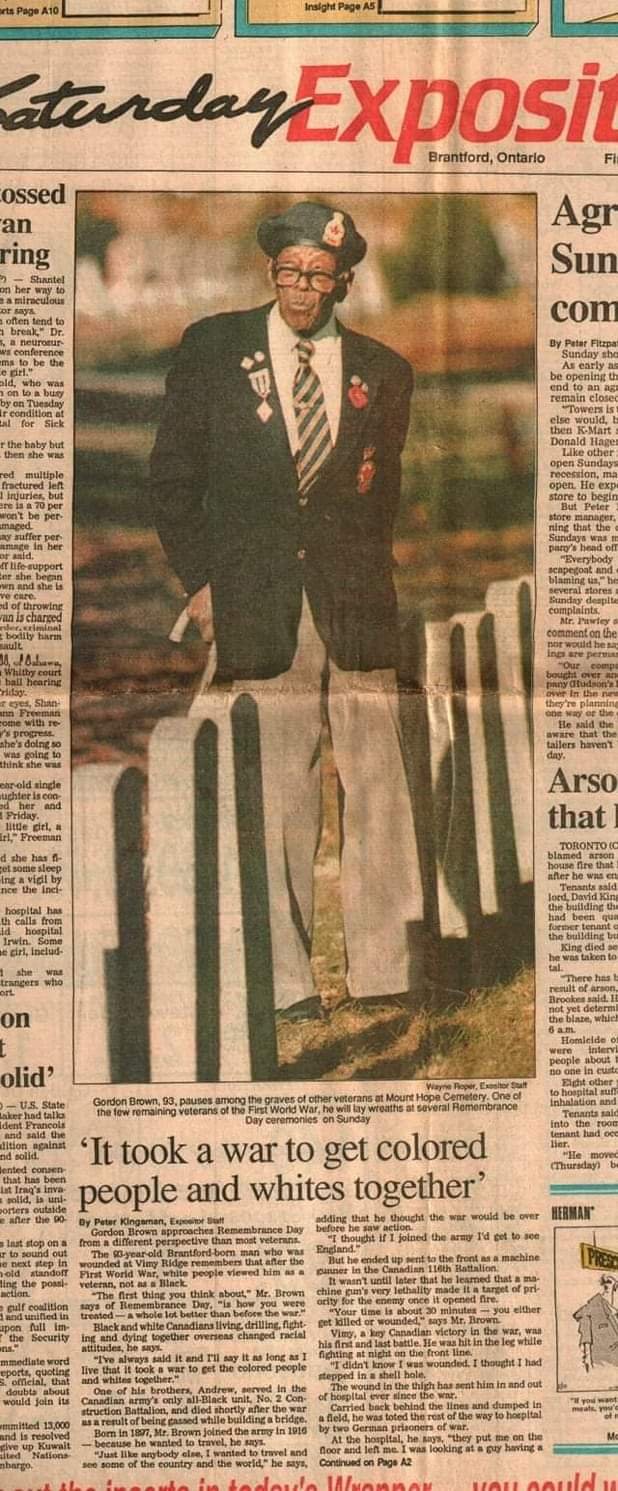
Newspaper article about Gordon “Grandie” Brown, Candace’s paternal grandfather and WWI veteran. He was a member of the 116th Battalion and fought at the Battle of Vimy Ridge in WWI.
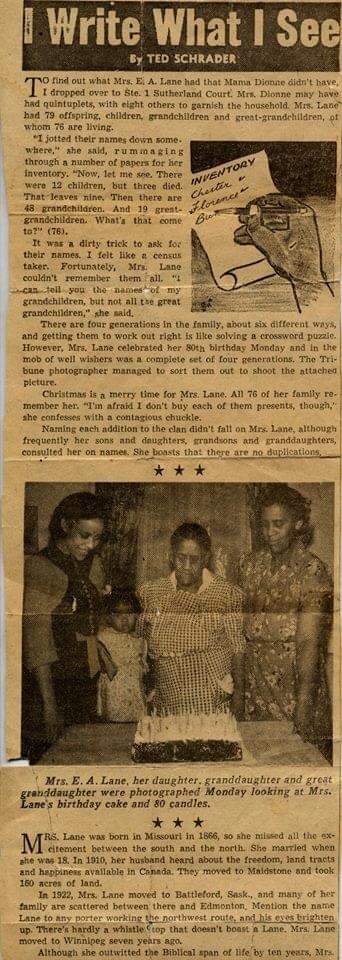
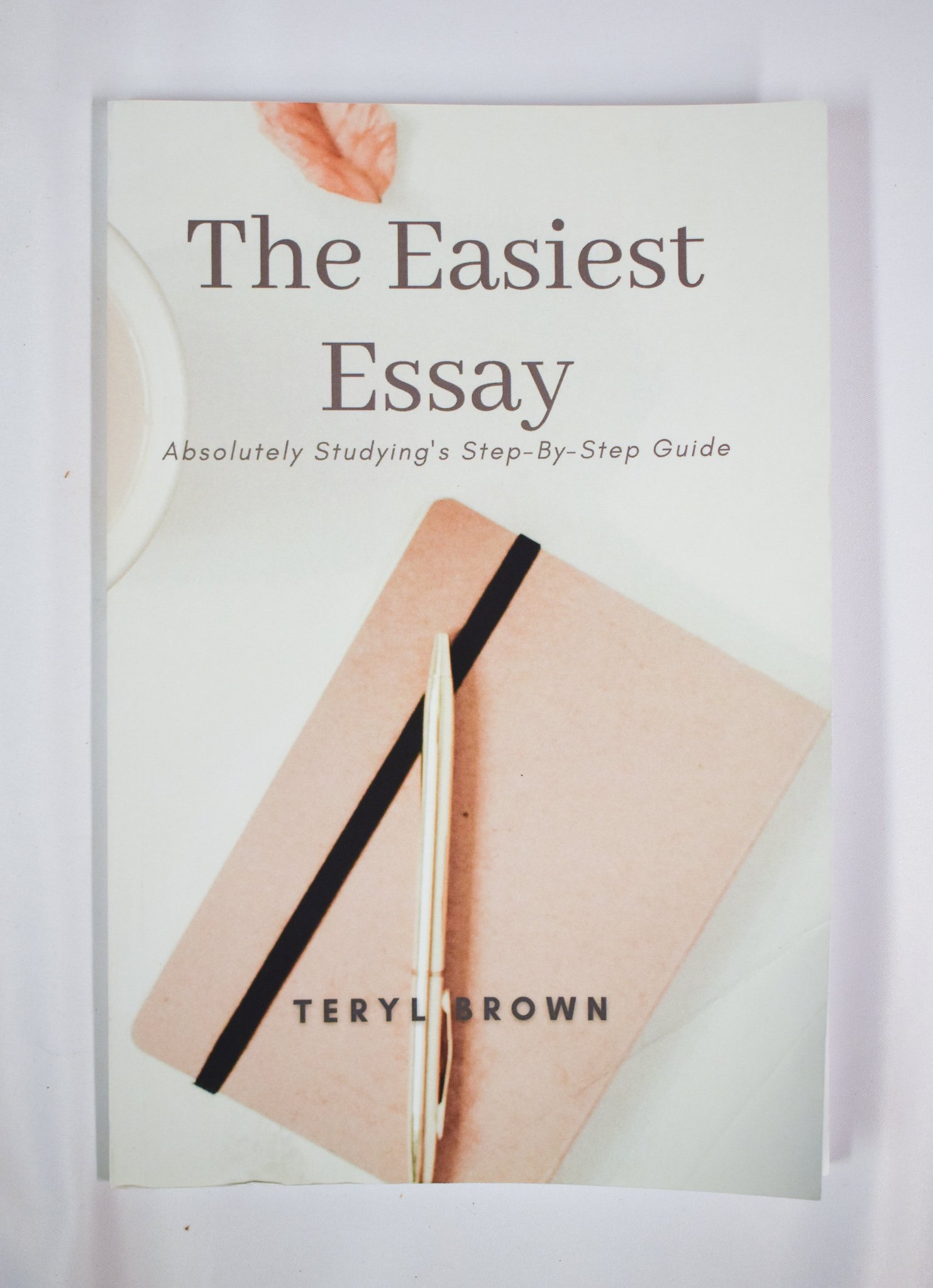
A self-help writing book written by Teryl, one of Candace’s nieces. It was her first publication.
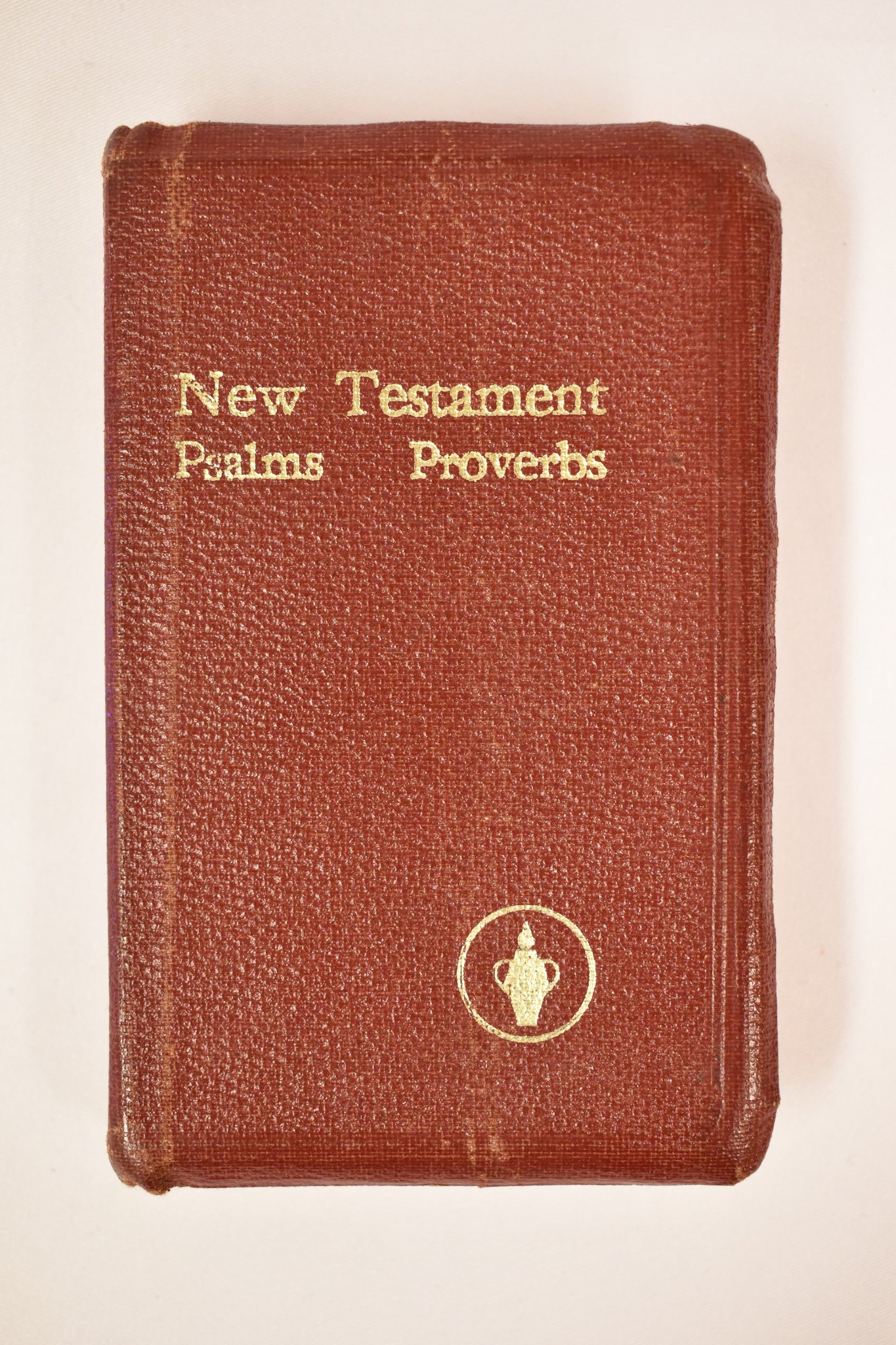
Candace’s copy of the New Testament. Church is very important in Candace’s family, both as a community and religious base, and she grew up attending a century-old church in Winnipeg (Pilgrim Baptist).
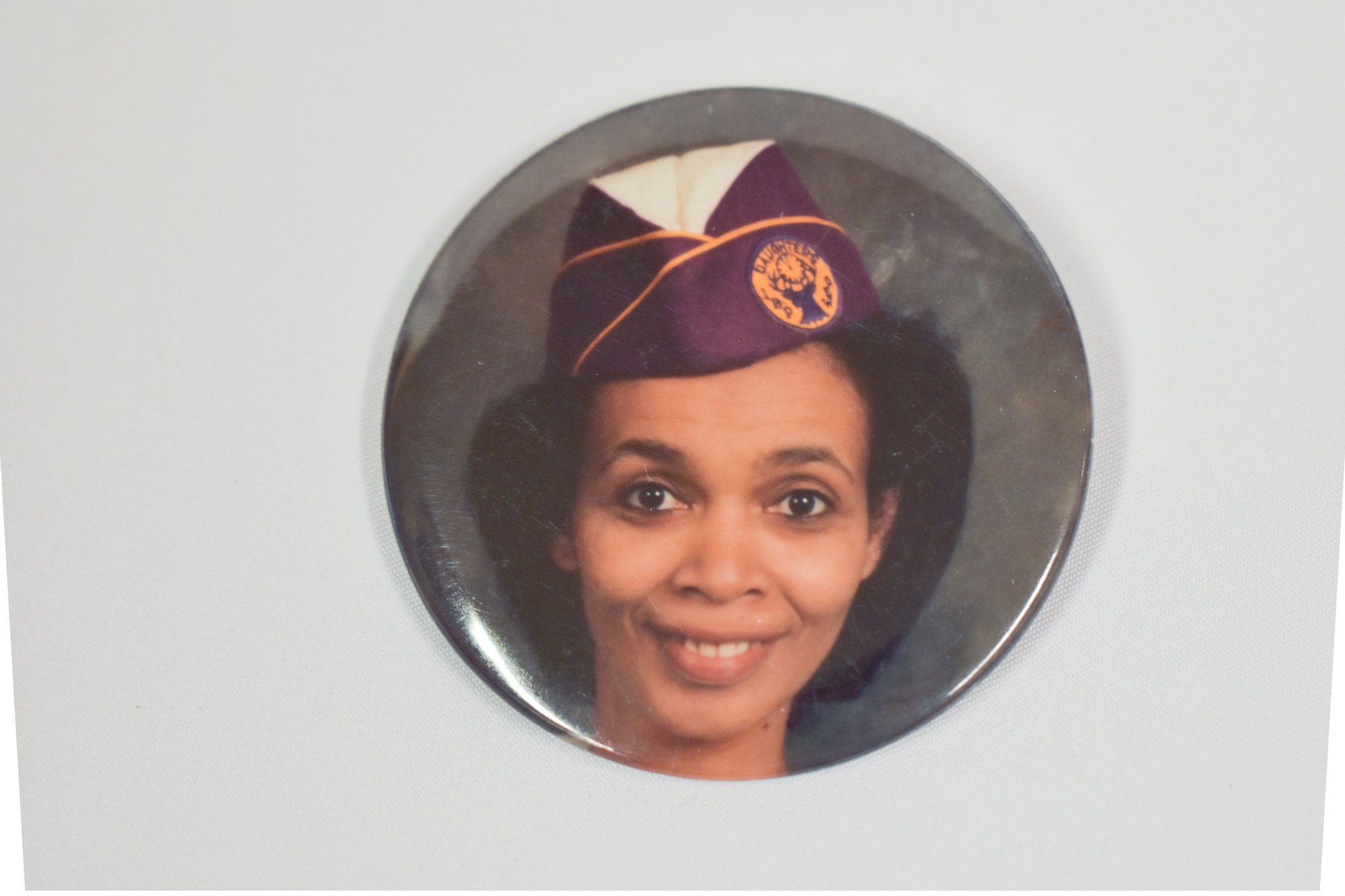
Headshot on a pin of Candace’s oldest sister, Leslie. Growing up in a big family, Leslie often help raise Candace and her younger siblings. Candace has always looked up to her big sister, Leslie. Leslie’s hat has a patch from the Elks, a community organization that Candace’s family was actively involved in.
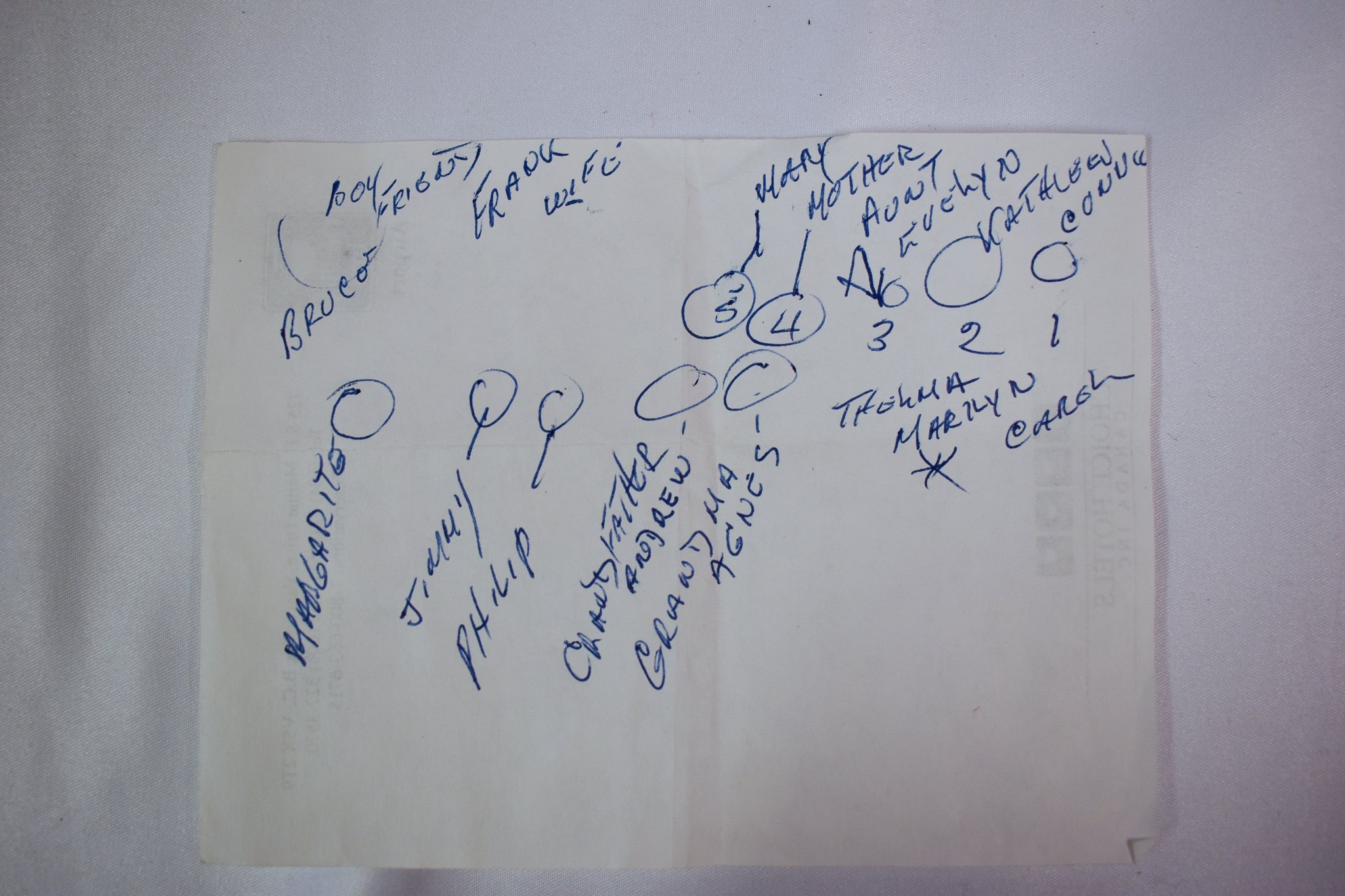
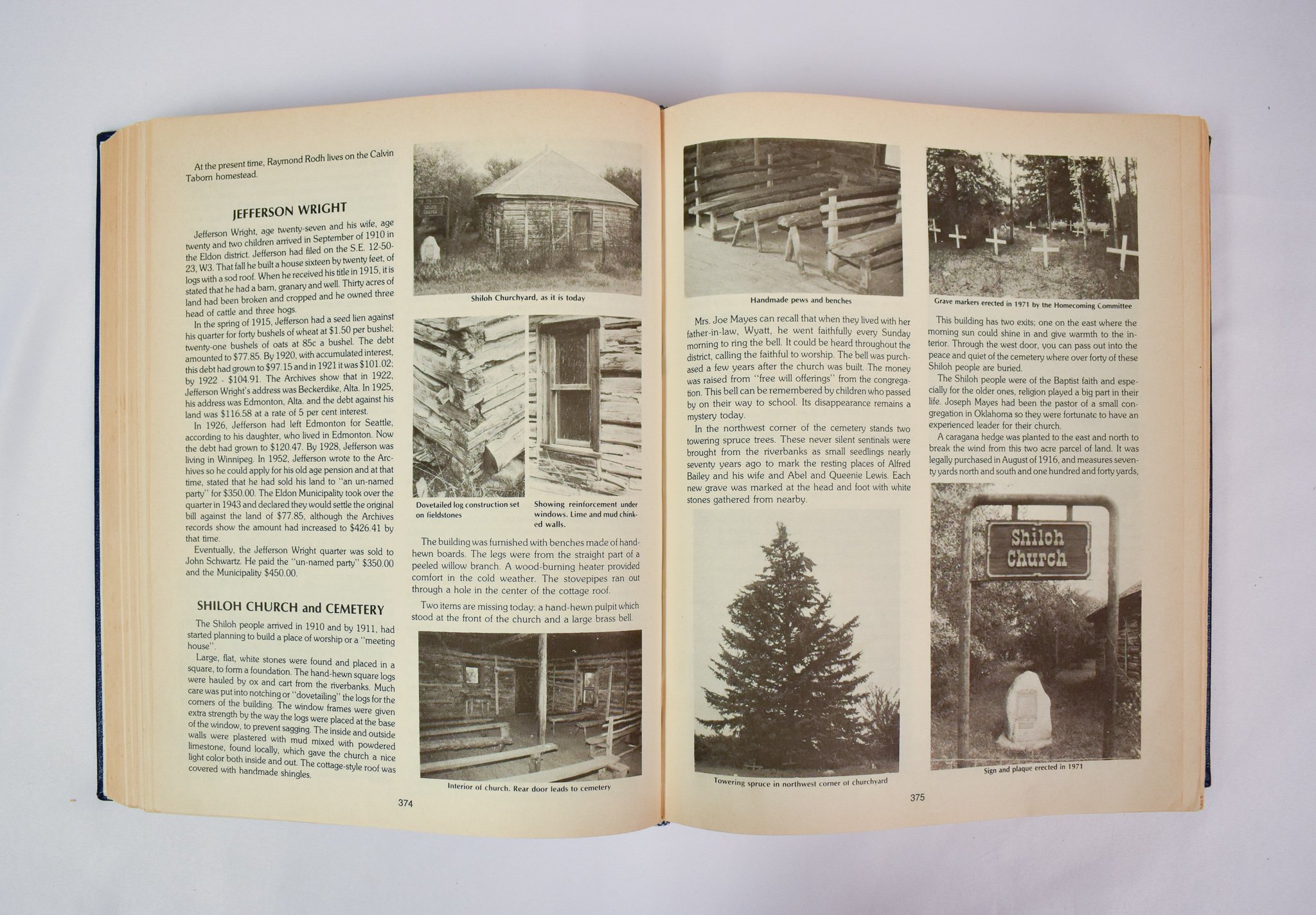
North of the Gully documents the histories of families that settled in Saskatchewan, with a section on the Shiloh people who settled near Maidstone, SK. Candace’s ancestors, the Lanes, are featured in this book. They were part of a group of 12 families of African-Americans who fled to Canada with the promise of free land and refuge from Jim Crow laws being passed in their home state of Oklahoma. The Shiloh community was founded in 1910, with Cecil Lane being one of Shiloh’s original settlers.
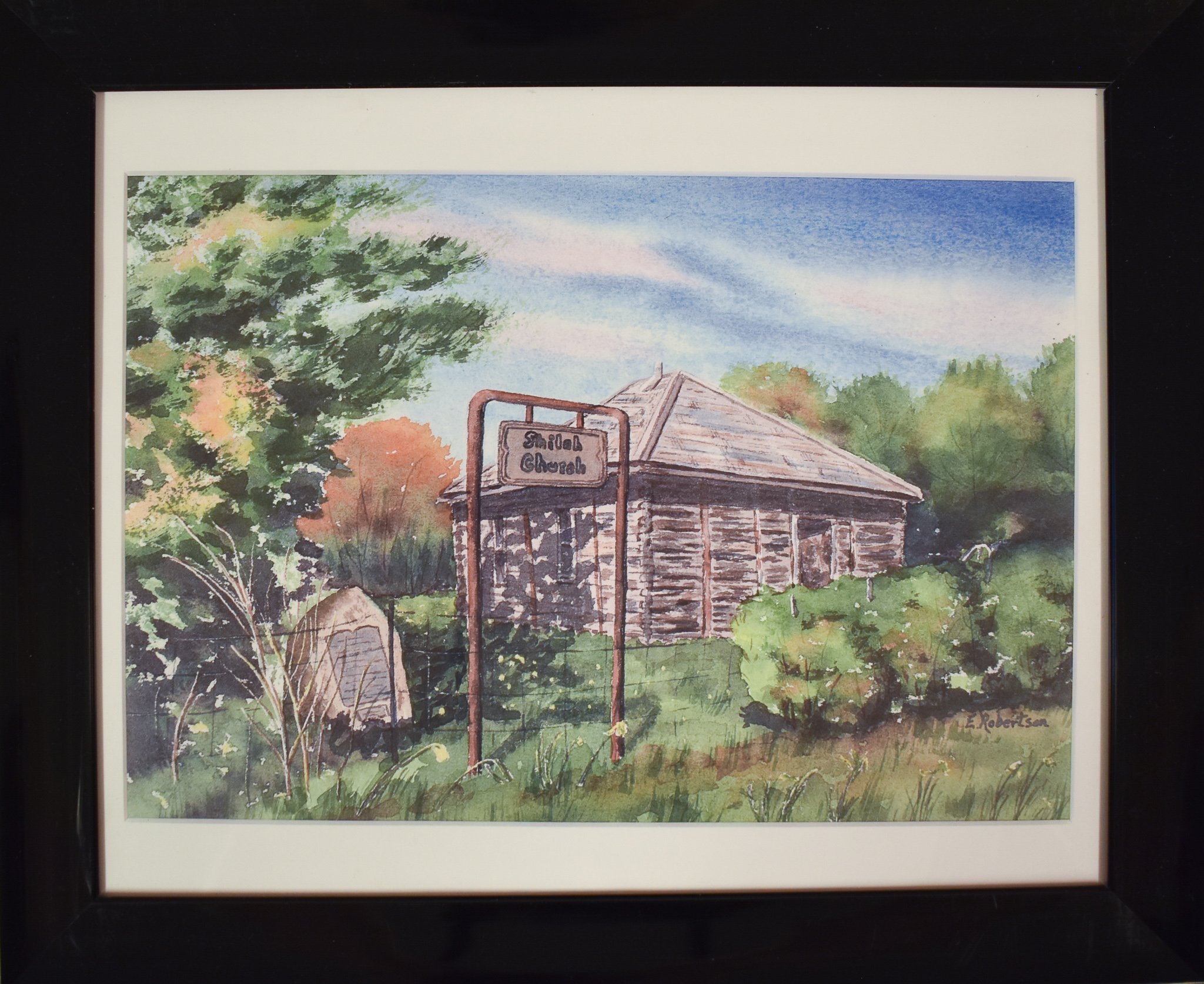
Watercolour painting of the Shiloh church.
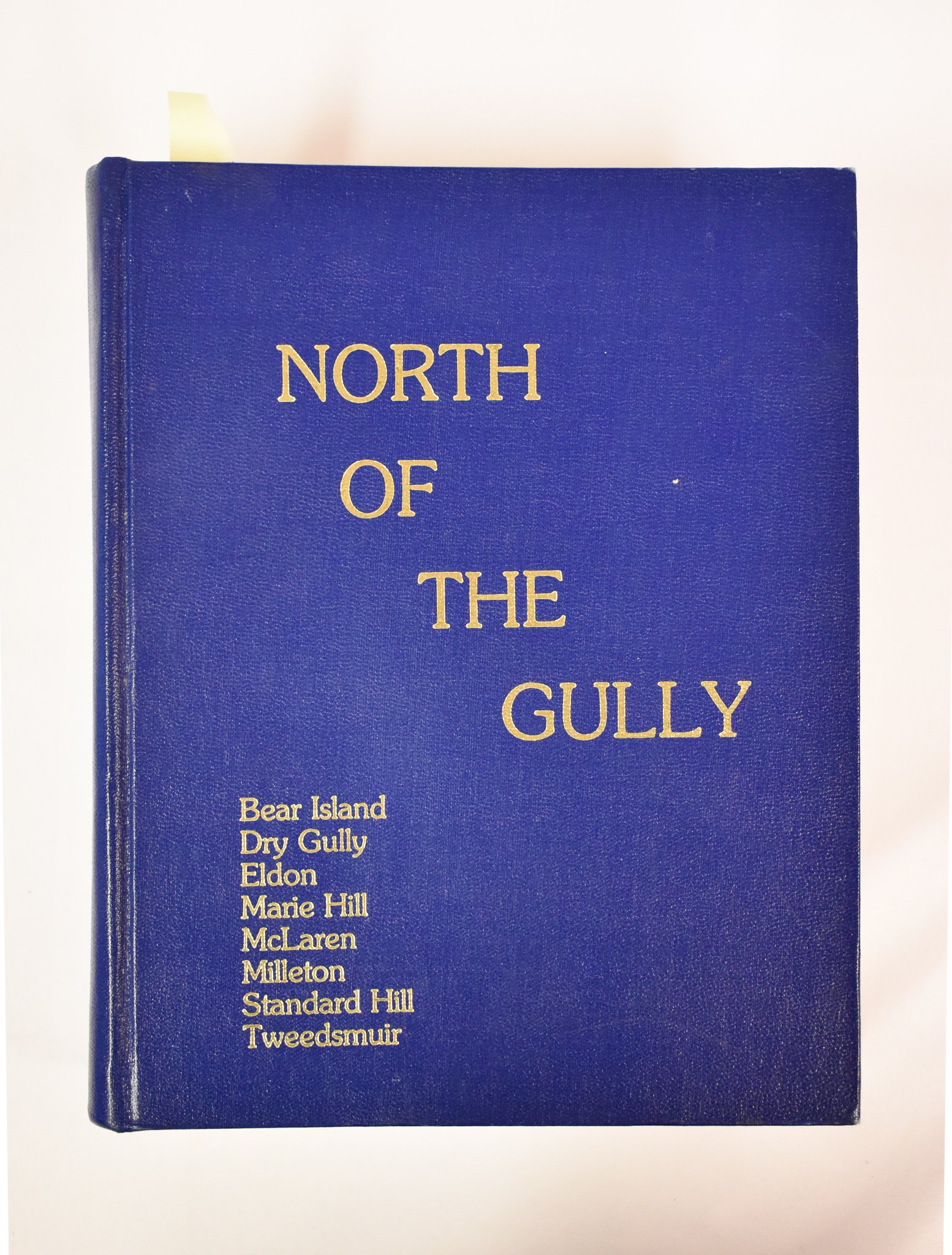
A book about the Shiloh settlement, an African-American Baptist religious settlement established in 1910. In the early 1900’s, a group of 11 families travelled north from Oklahoma with the promise of free land and civil rights in Western Canada; once in Canada, they established a farming settlement north of Maidstone, Saskatchewan. Candace’s paternal great-grandfather, Cecil Lane, was one of the community’s first leaders. In the book pictured, the repainting mentioned on page 374 was done by Candace’s father (see next photo). The church in the poster was attended by Cecil who came with the Mayes family mentioned in the book.

Individual portraits of Candace and two of her sisters. From L to R: Candace, Cassie, and Cara
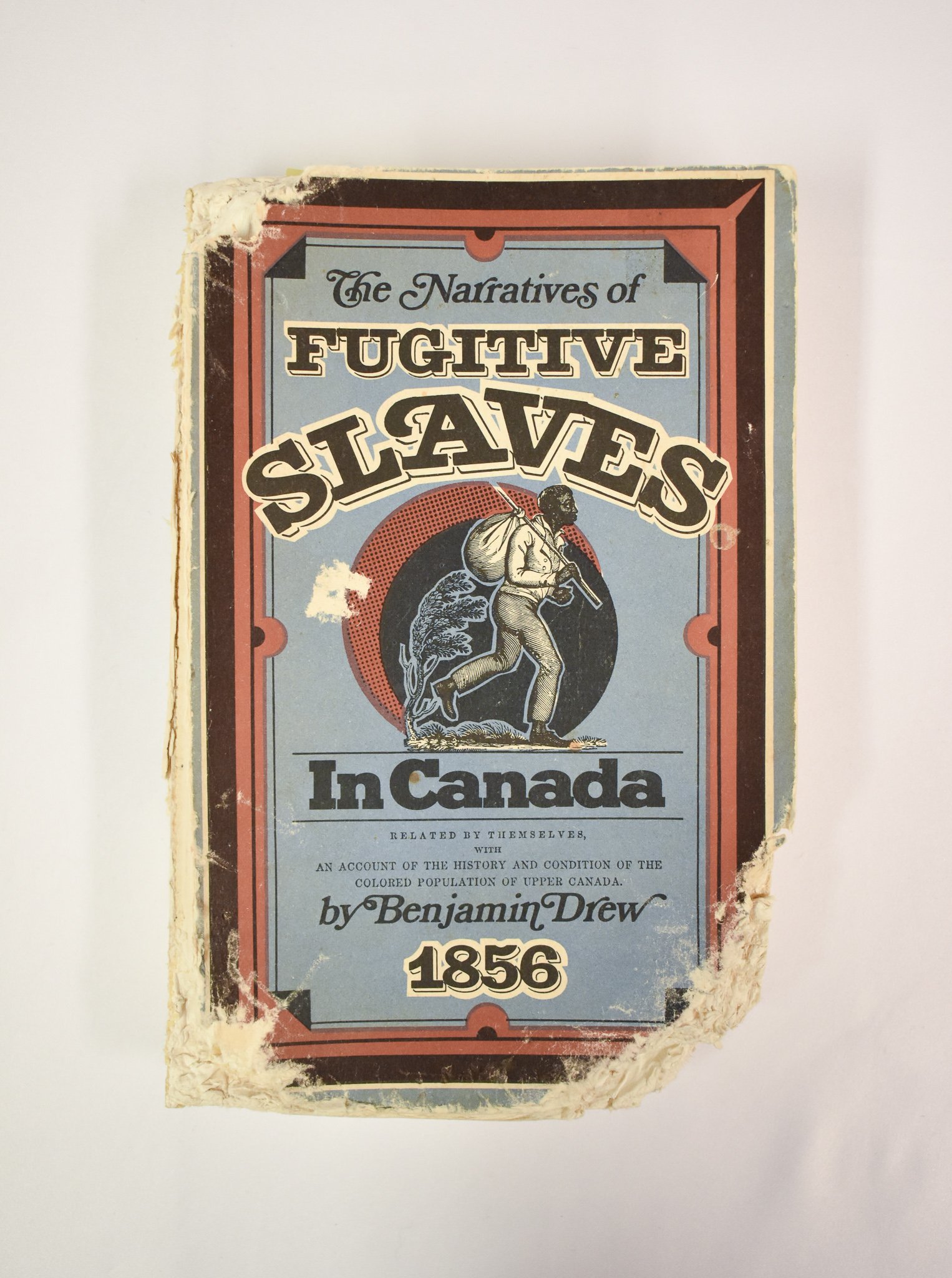
Book about runaway slaves who fled to Ontario. One of the stories in the book is about William Brown, one of Candace’s ancestors, who fled to Canada in the 1870’s.
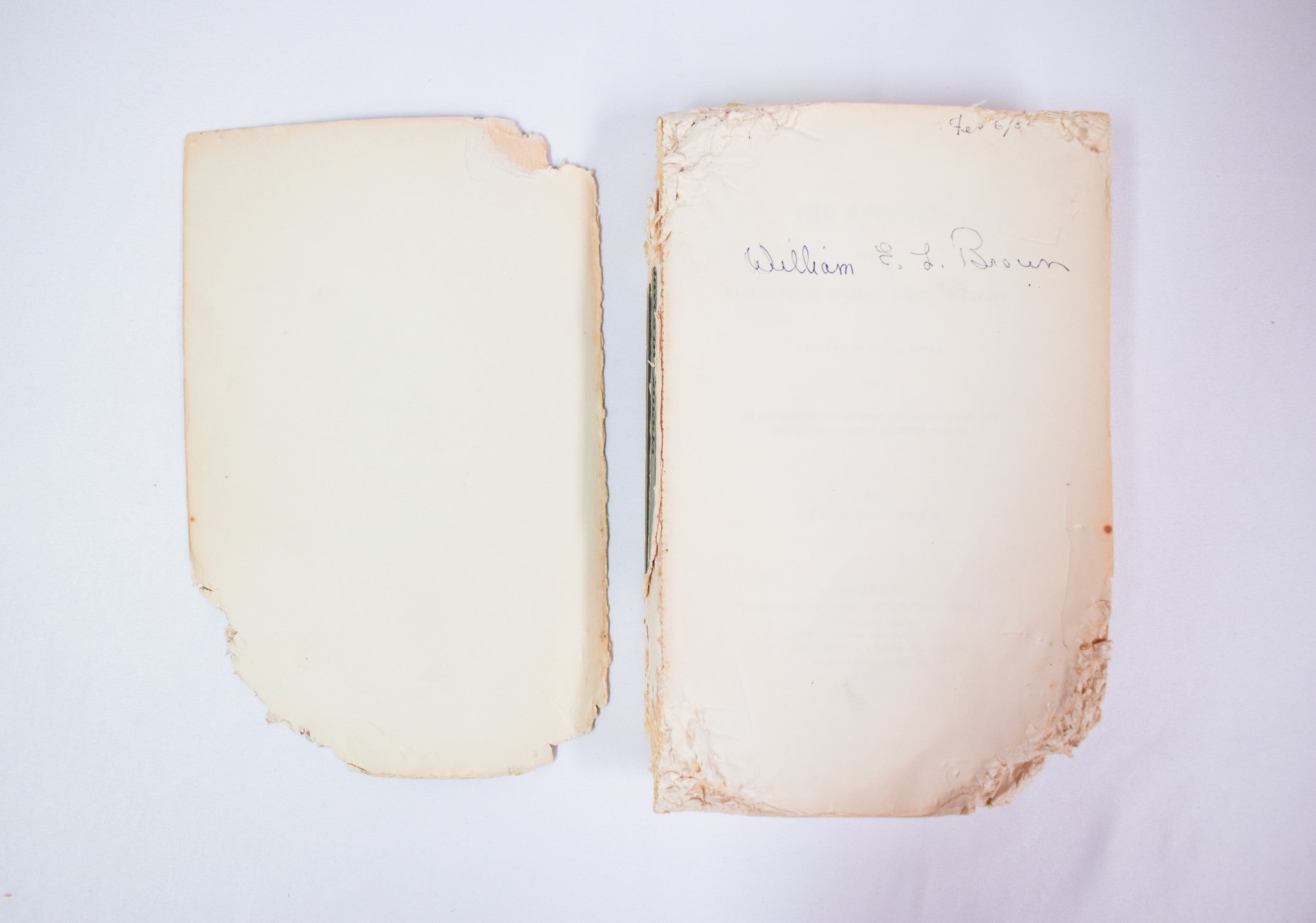
Inside cover of the book, signed by William Brown.
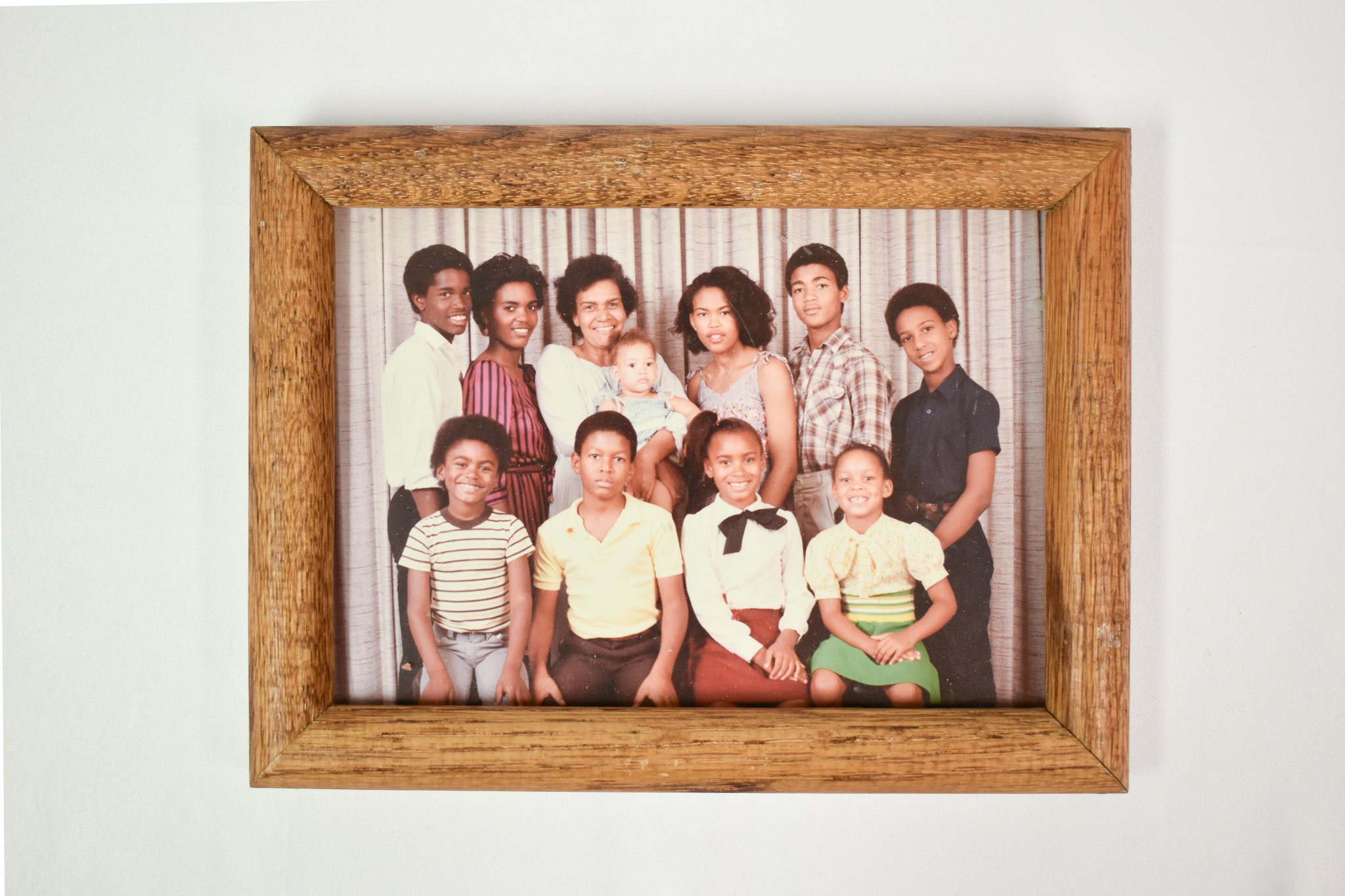
A family portrait from Candace’s childhood in Winnipeg with her mother and siblings; Candace is third from the right in the back row and her mother is holding Candace’s niece, Teryl.
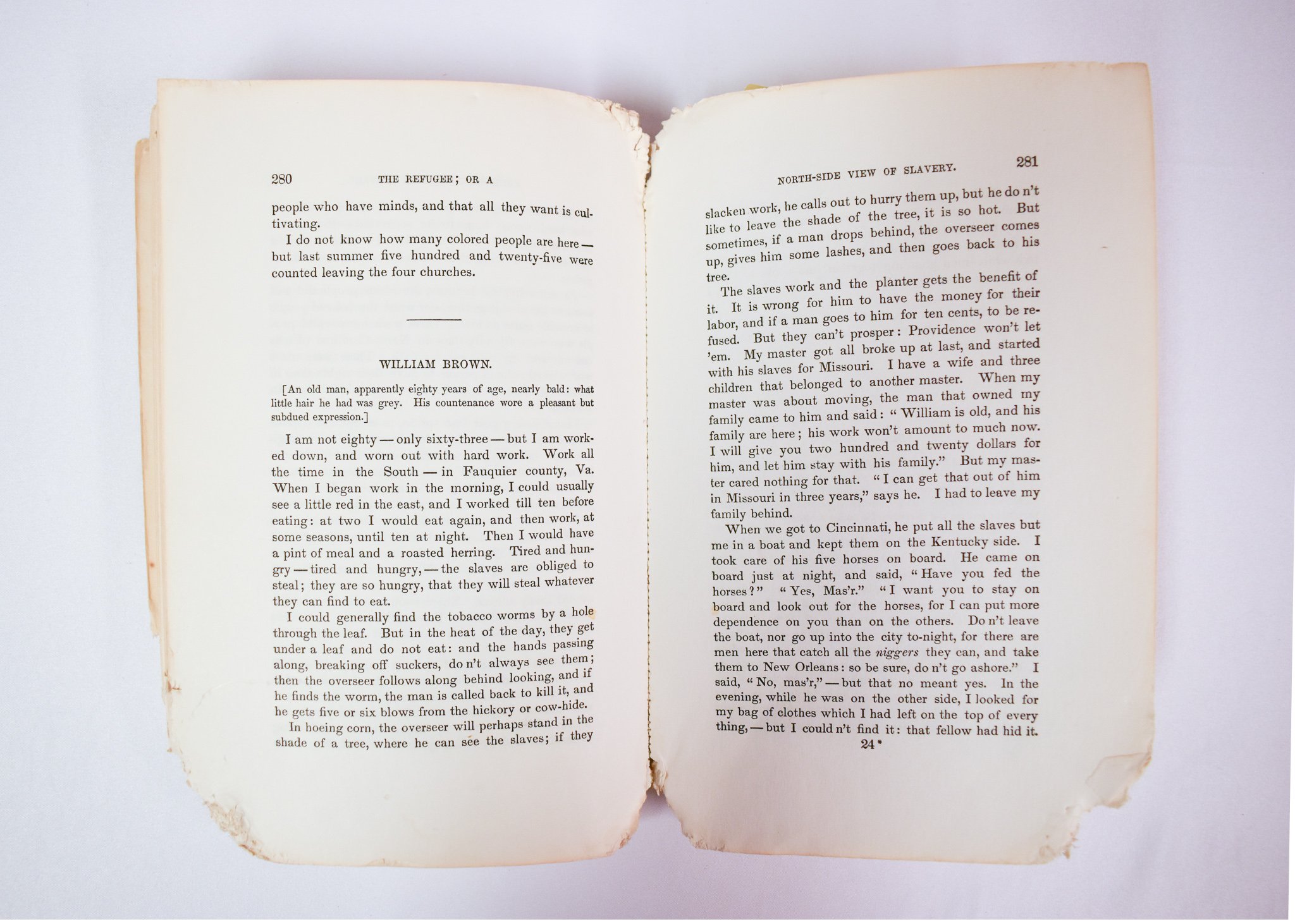
The story of William Brown, one of Candace’s ancestors, who was a slave that escaped to Canada in the 1870’s.
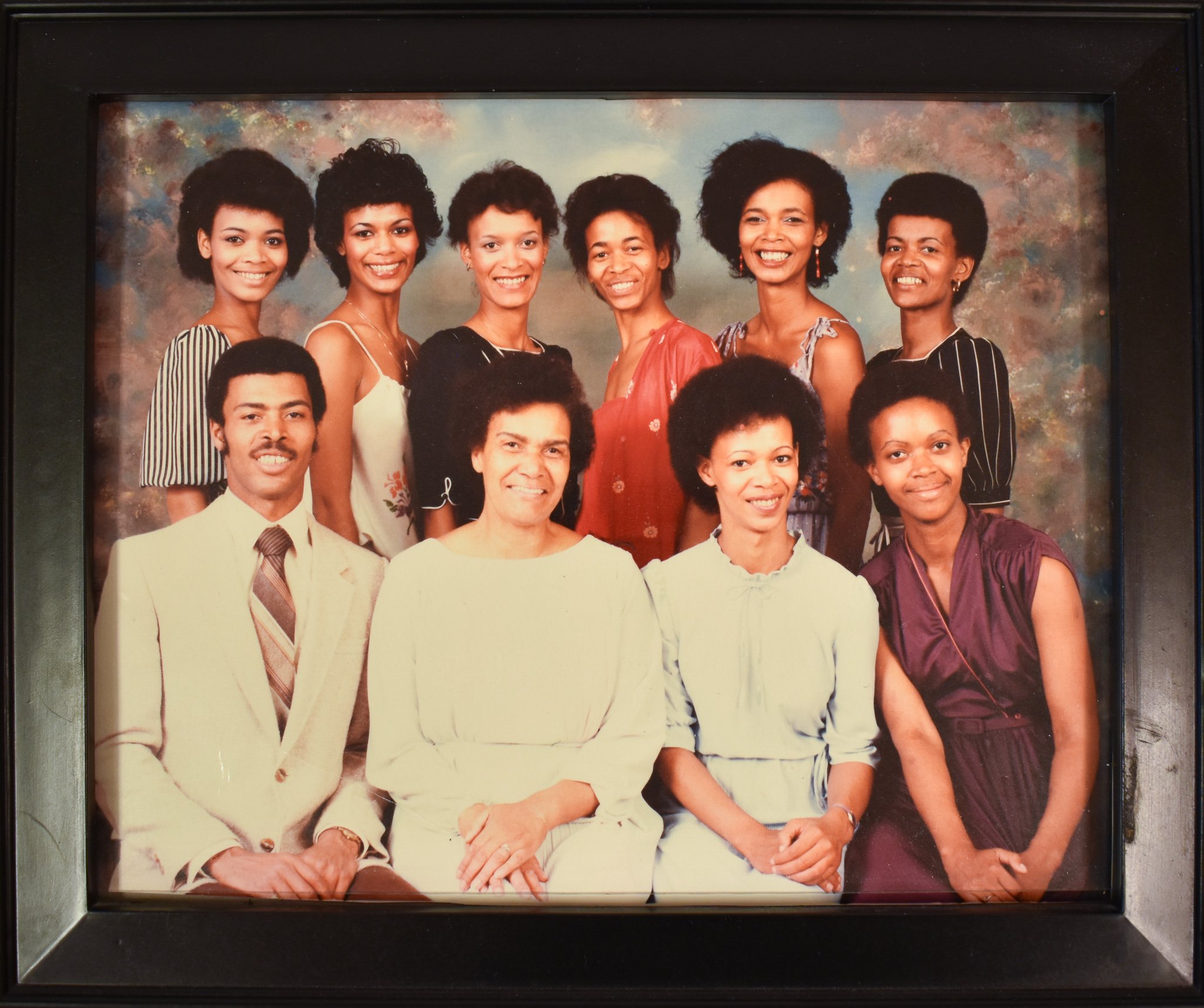
A family portrait with Candace’s mother and siblings. Candace is second from the left in the back row.
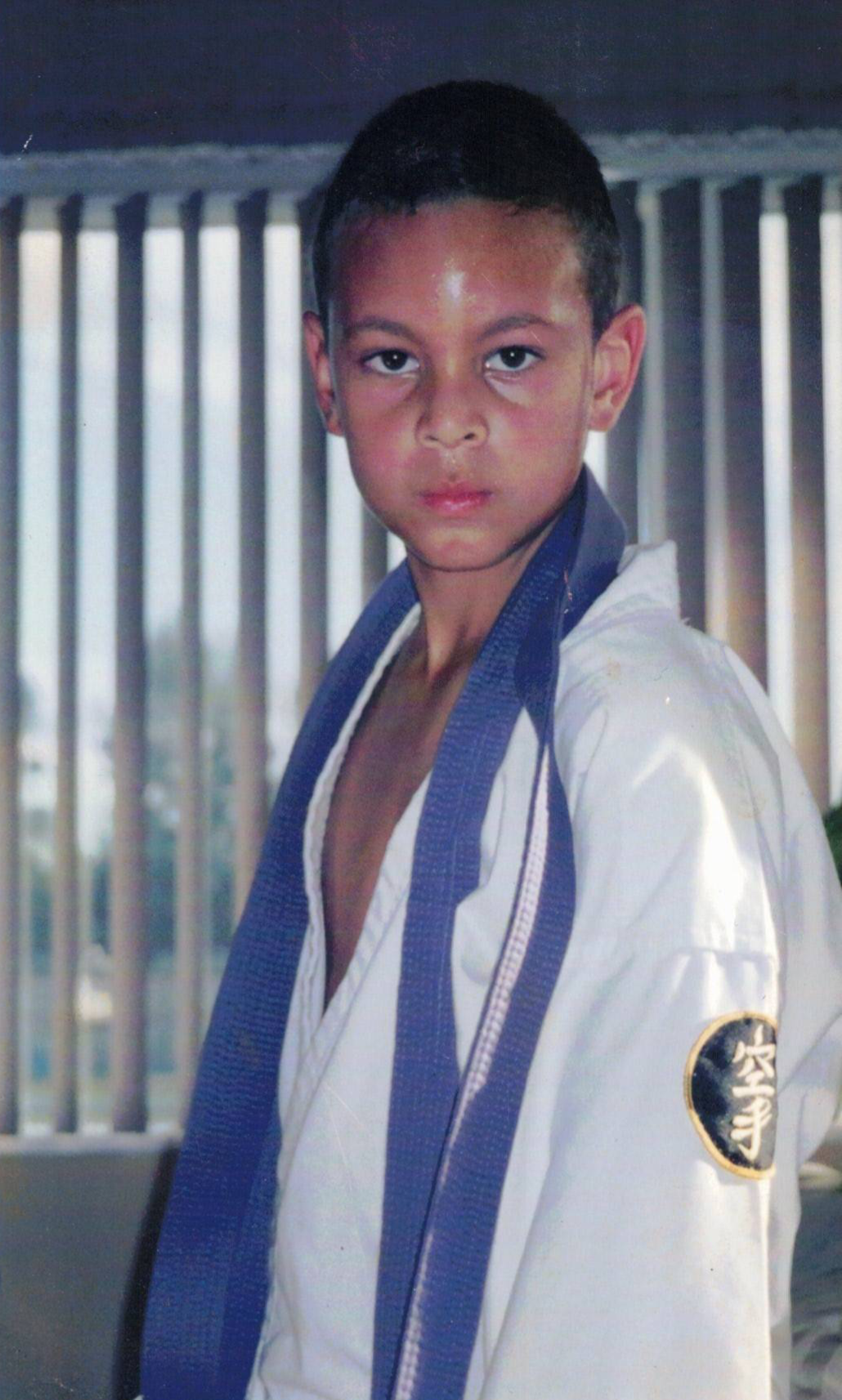
Candace’s son Jesse at a karate class in Coquitlam in the early 2000’s.
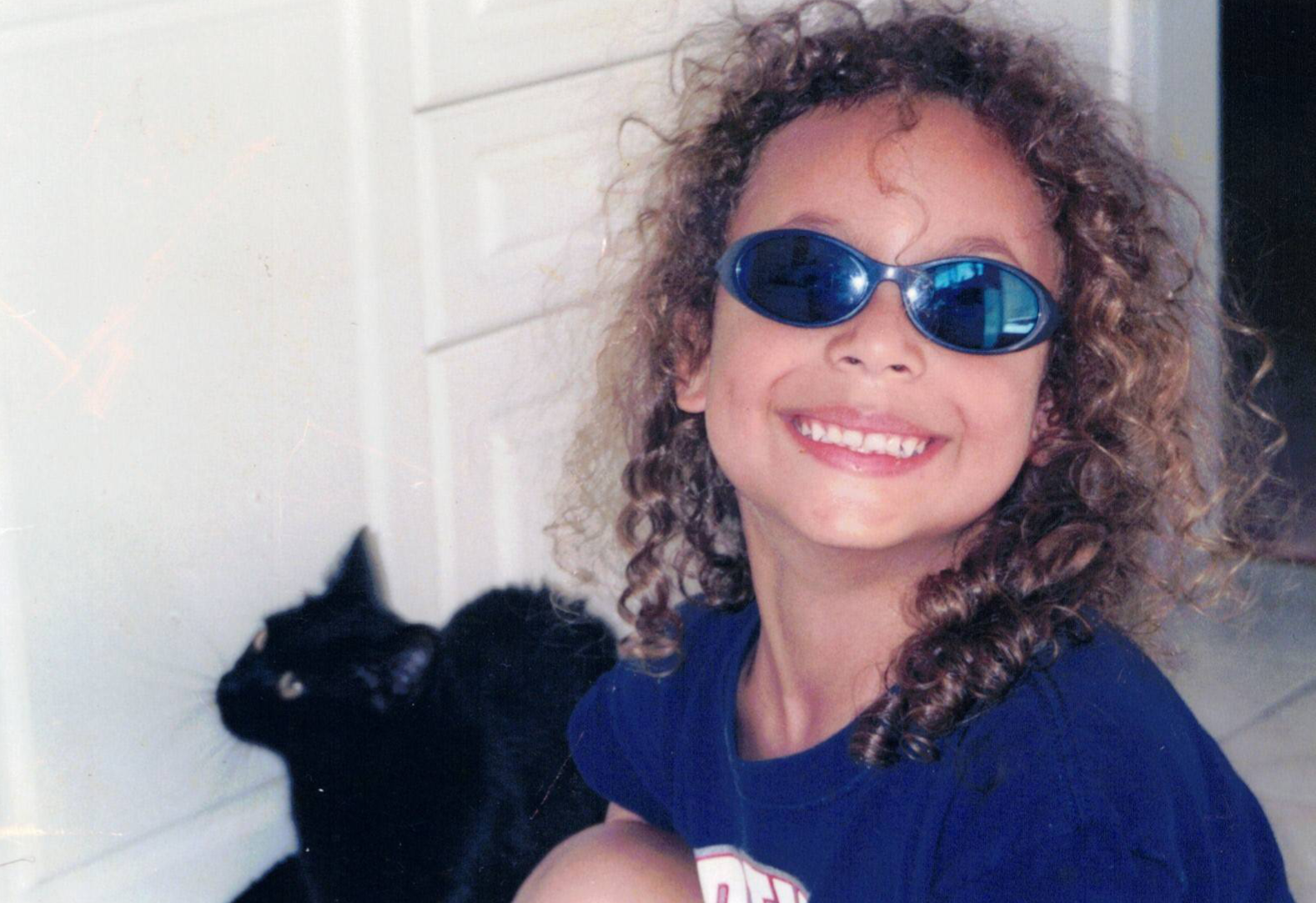
A young Jesse in the family home in Coquitlam.
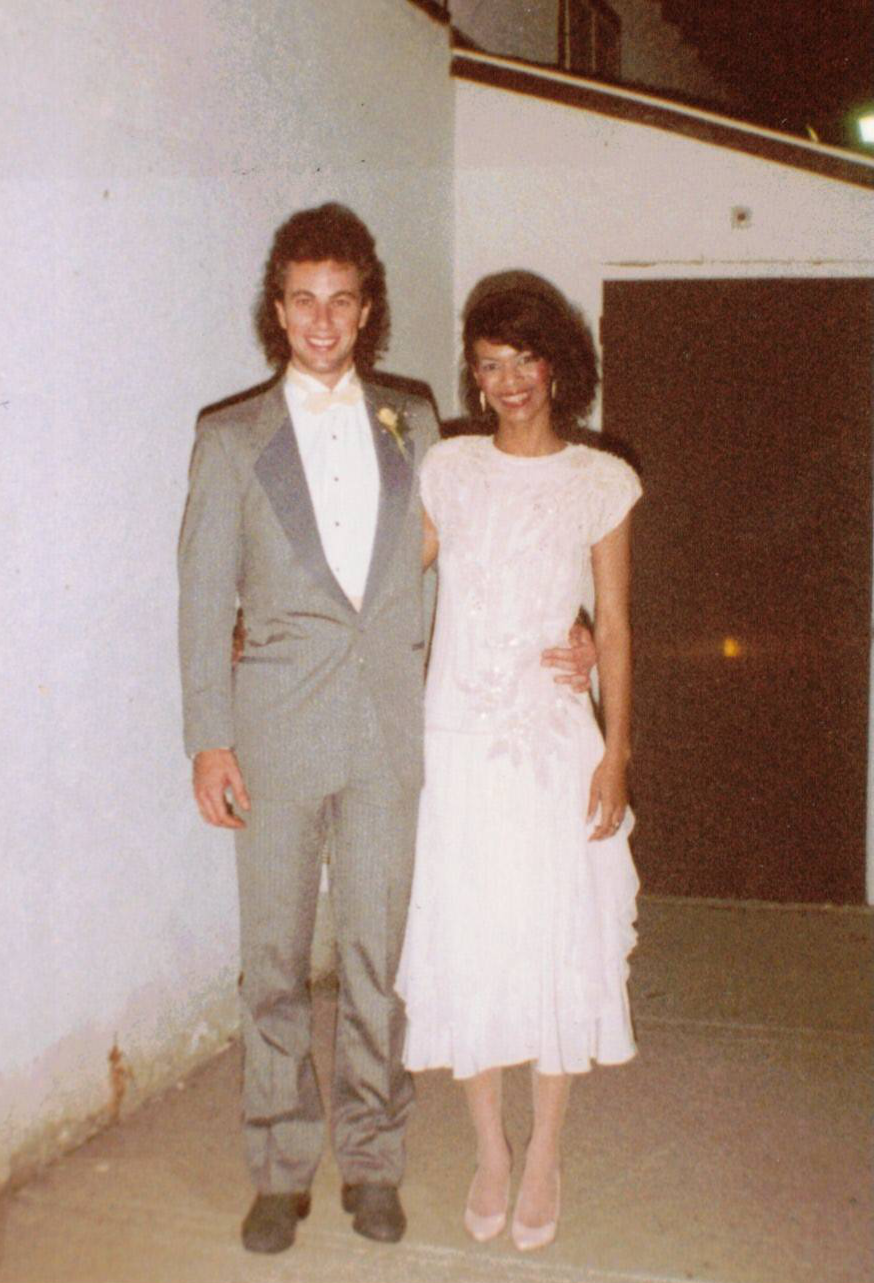
Candace and her future husband Jeff.
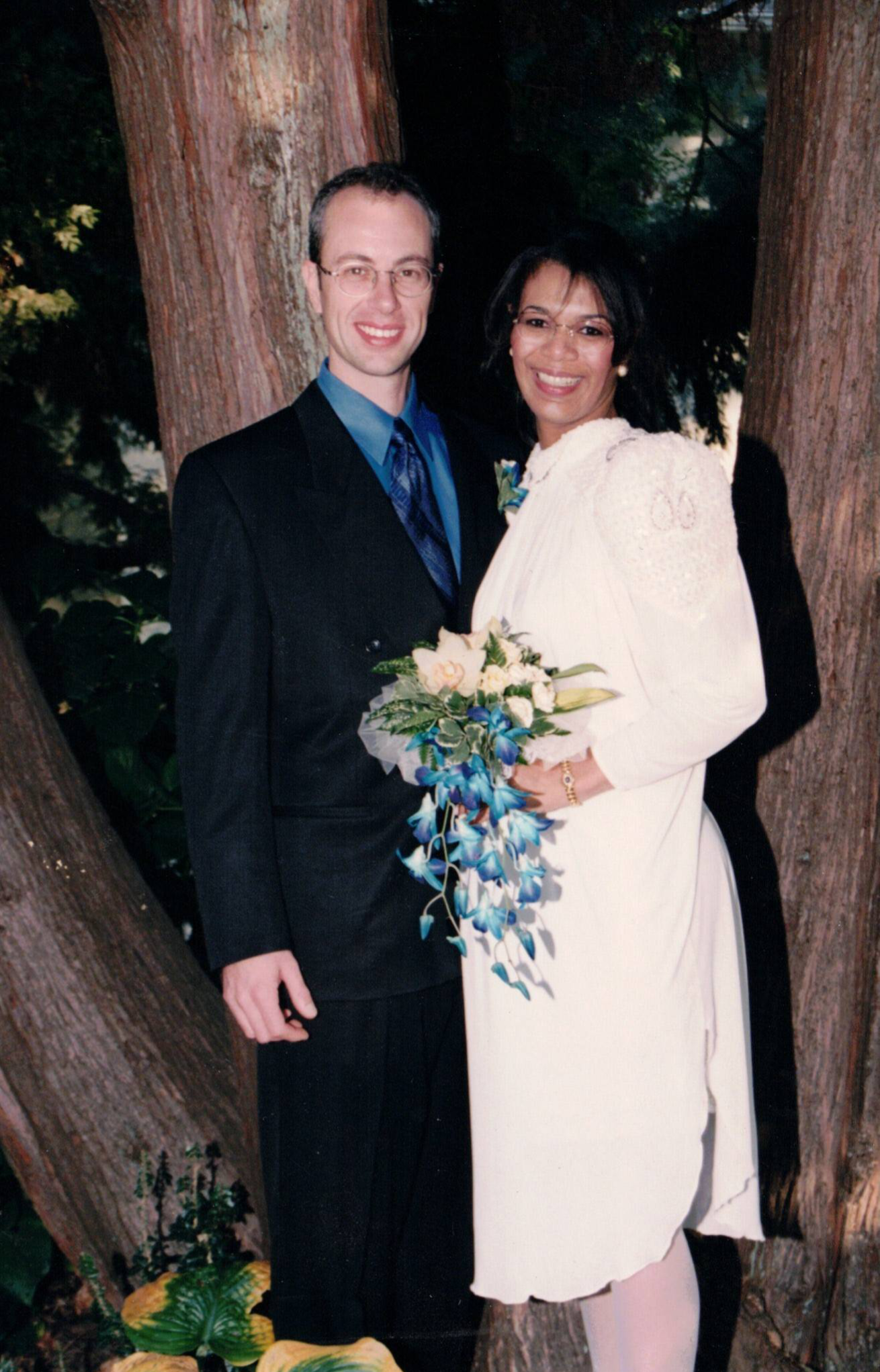
Candace and Jeff at their wedding.
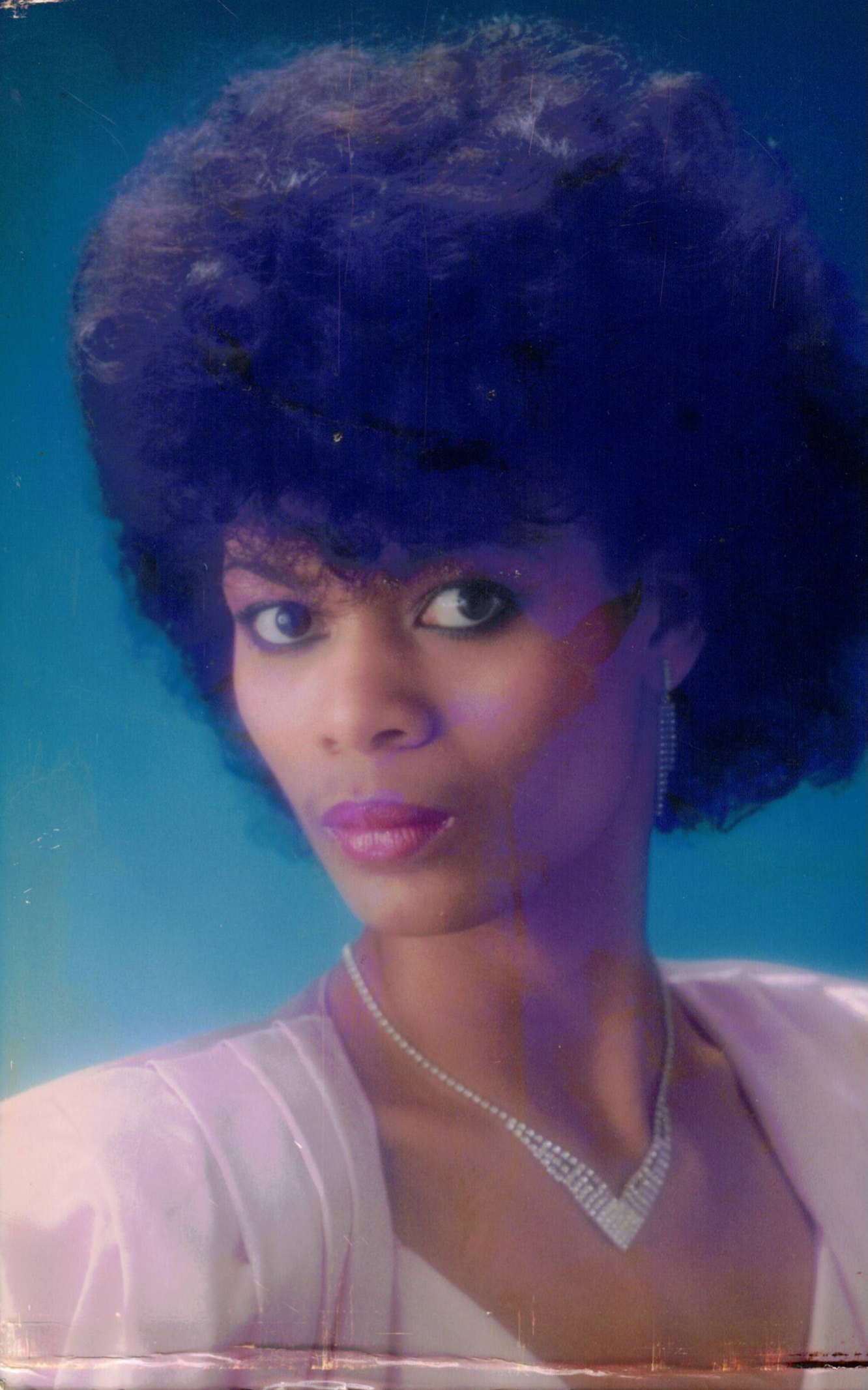
Glamour shot of Candace from 1986.
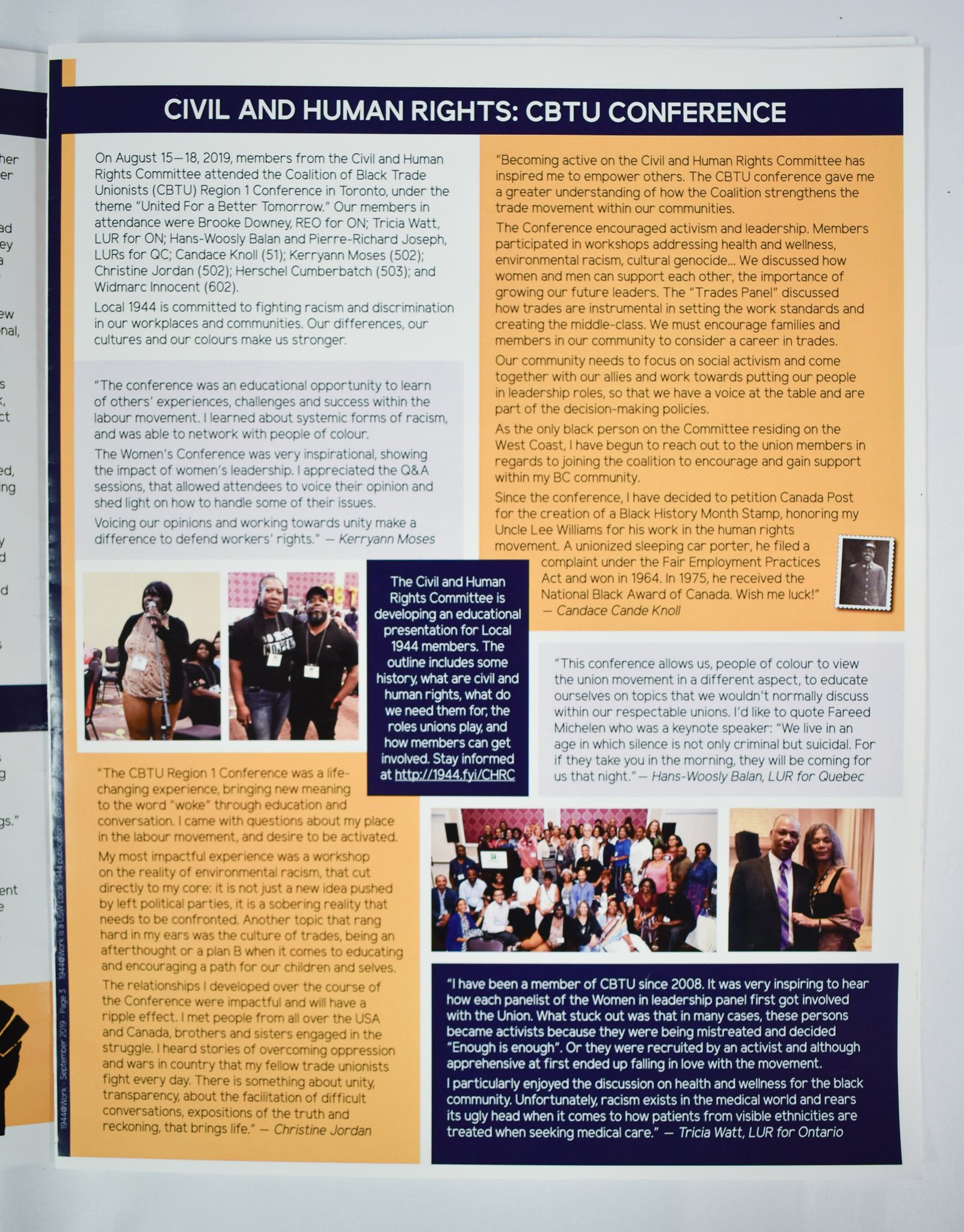
Brochure from the Coalition of Black Trade Unionist’s annual conference in Toronto, where Candace represented British Columbia.
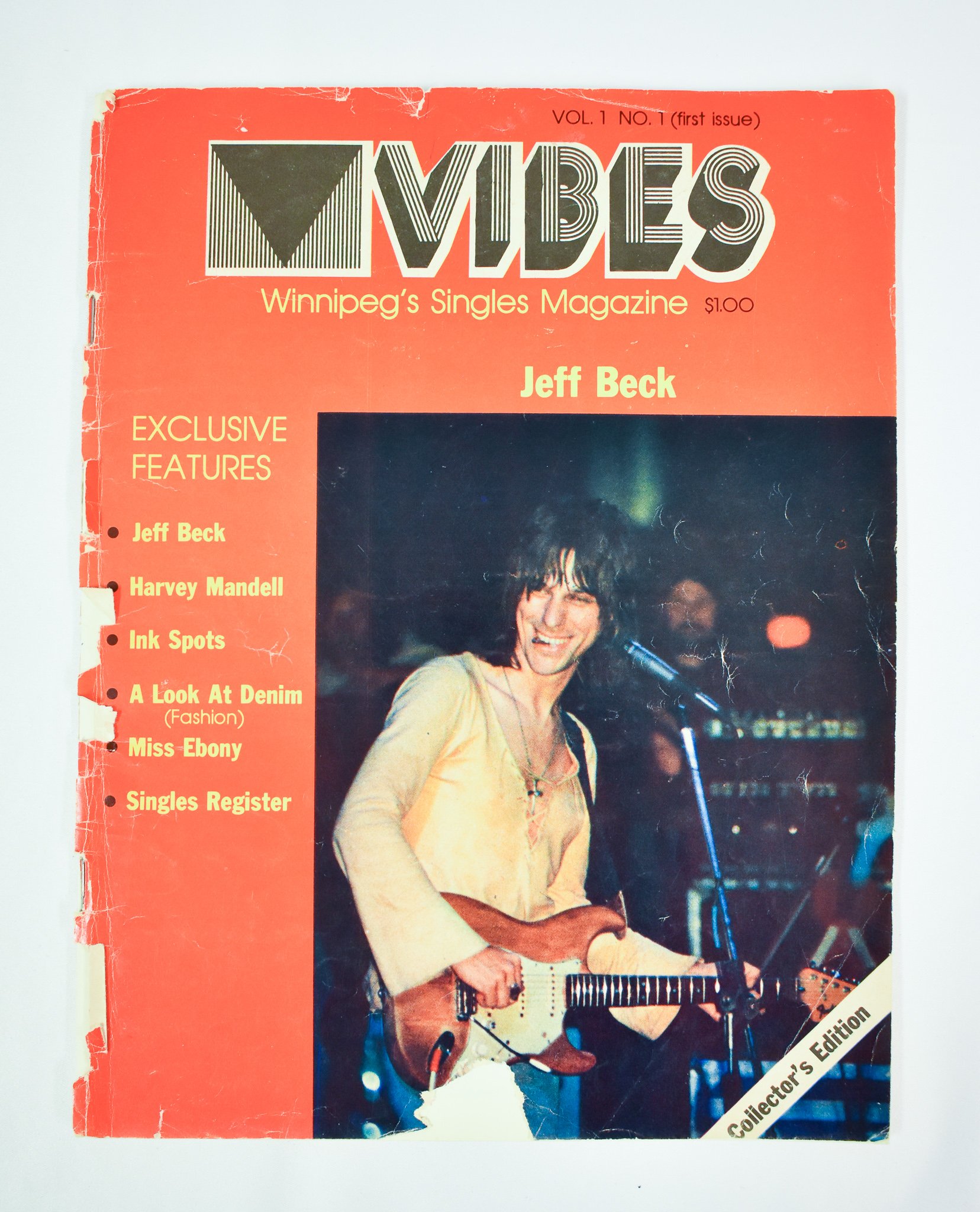
Cover of Vibes, a prominent youth culture magazine from the 1970’s known across Canada. Candace was featured in this issue as a winner of Miss Ebony, Winnipeg.
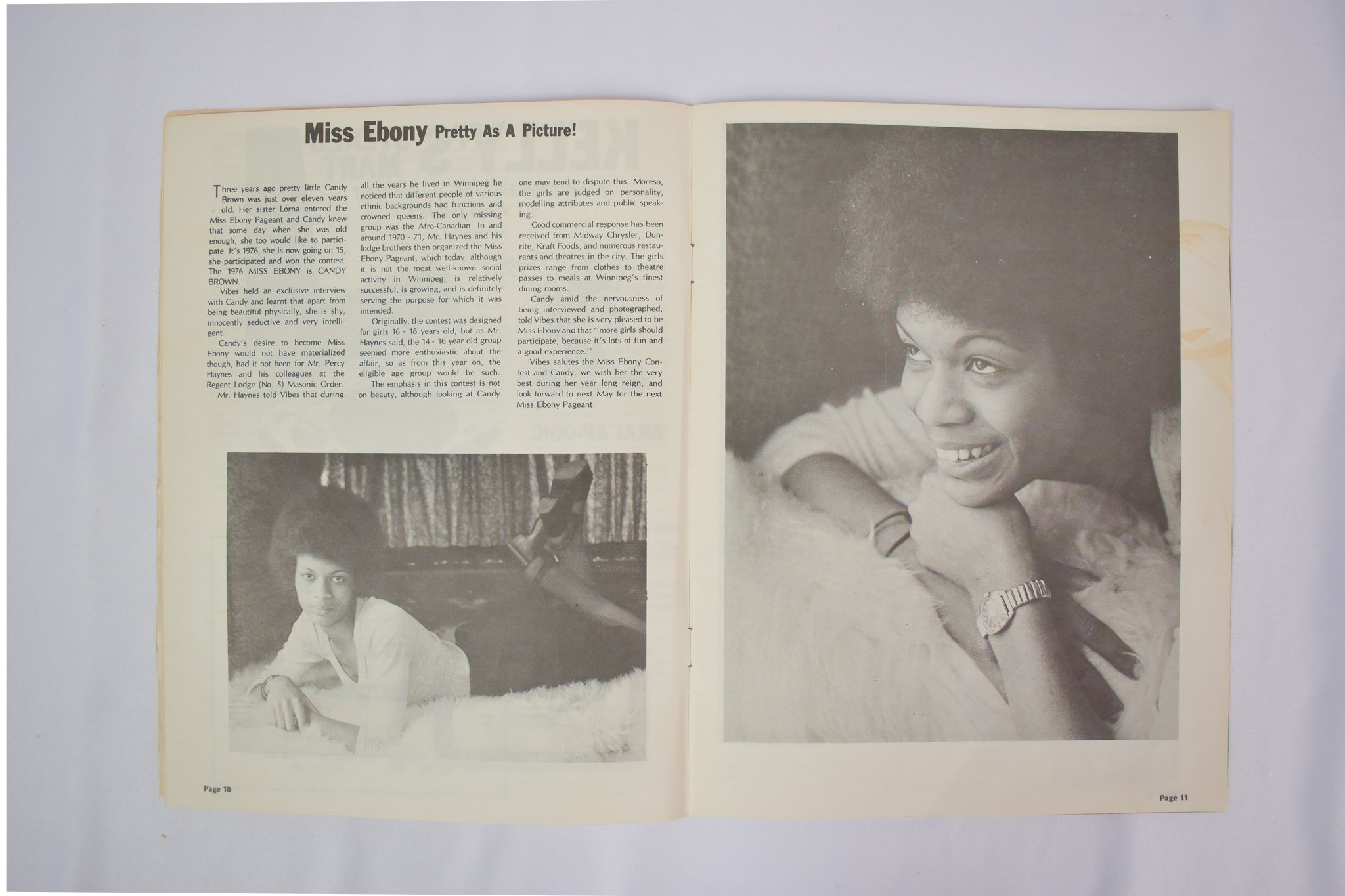
Feature on 15-year-old Candace, aka Candy Brown, who won Winnipeg’s Miss Ebony in 1976.
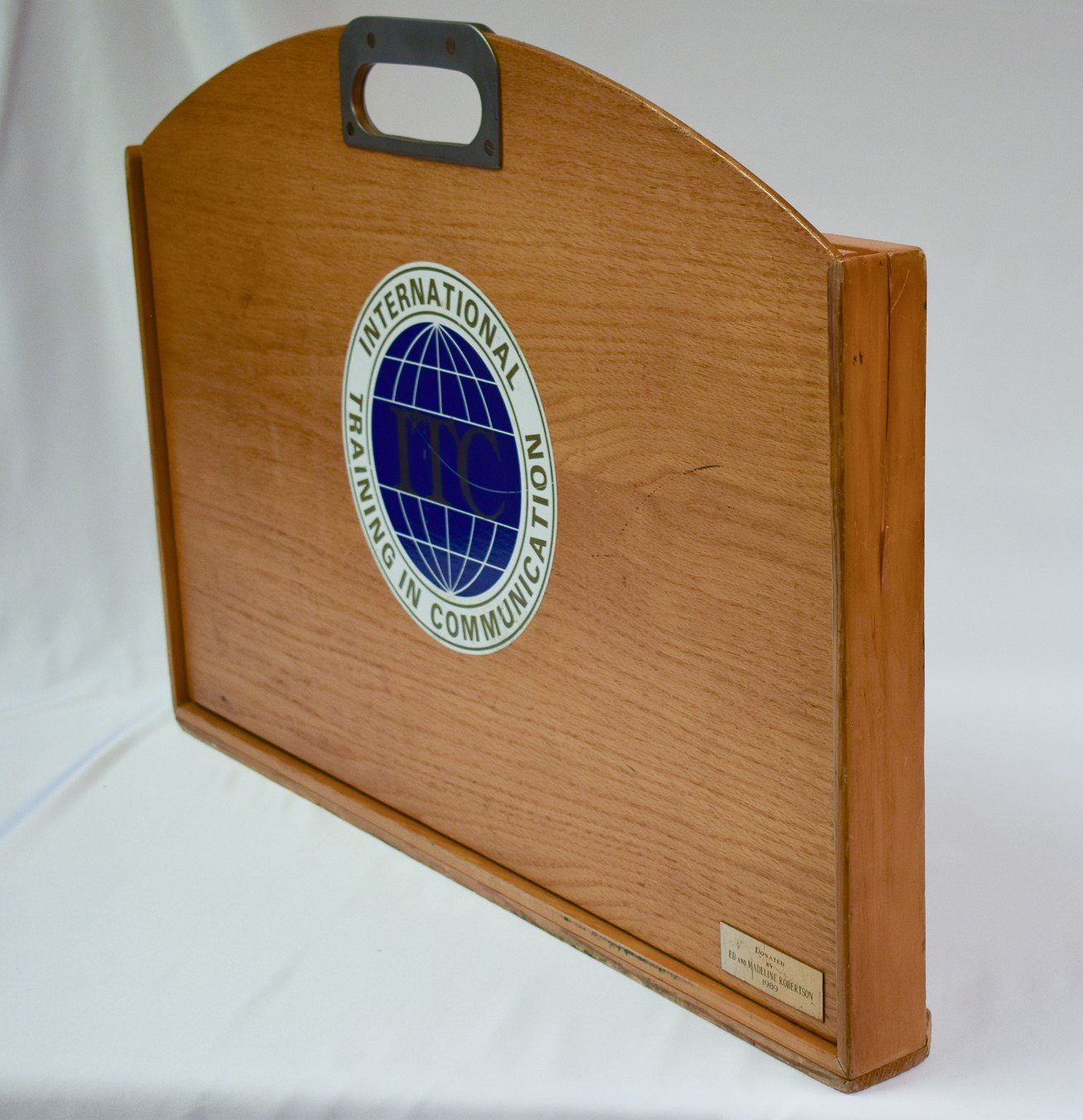
The lectern is over 30 years old and has been used by Candace across Canada at numerous ITC competitions.
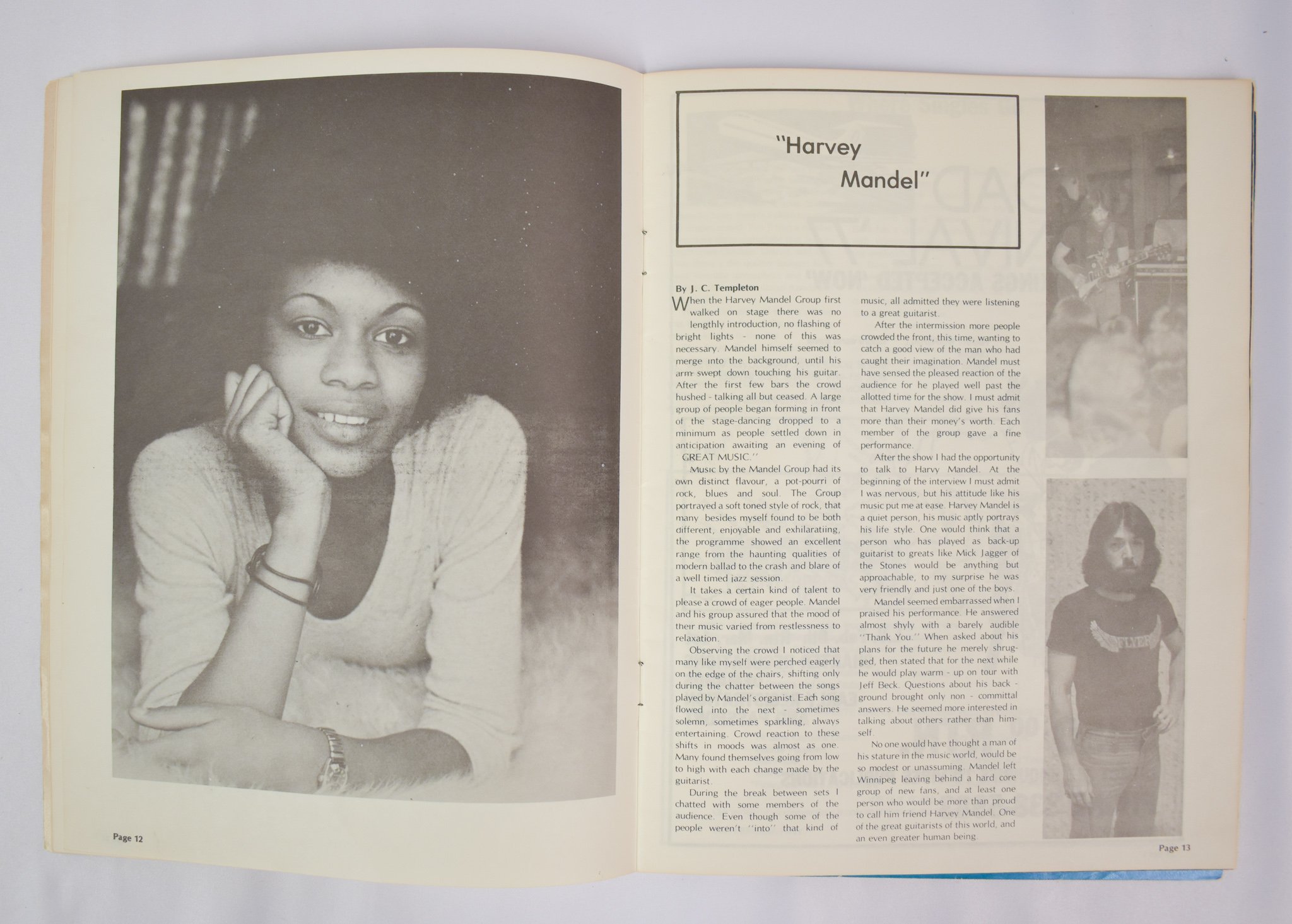
Glamour shot of Candace from Vibe magazine, featuring Candace as Miss Ebony 1976.
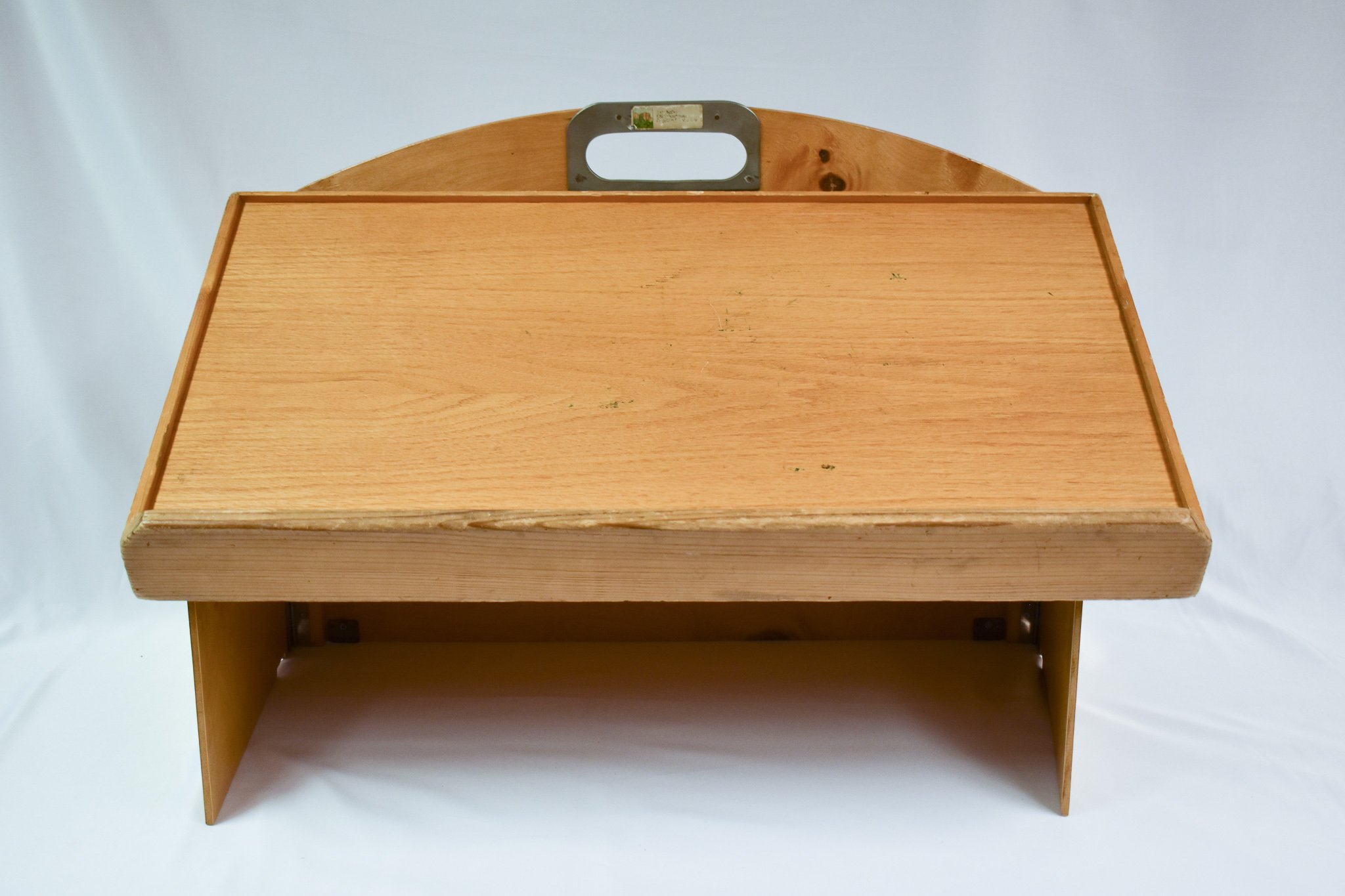
A portable lectern, set up as it would have been used by Candace at ITC.
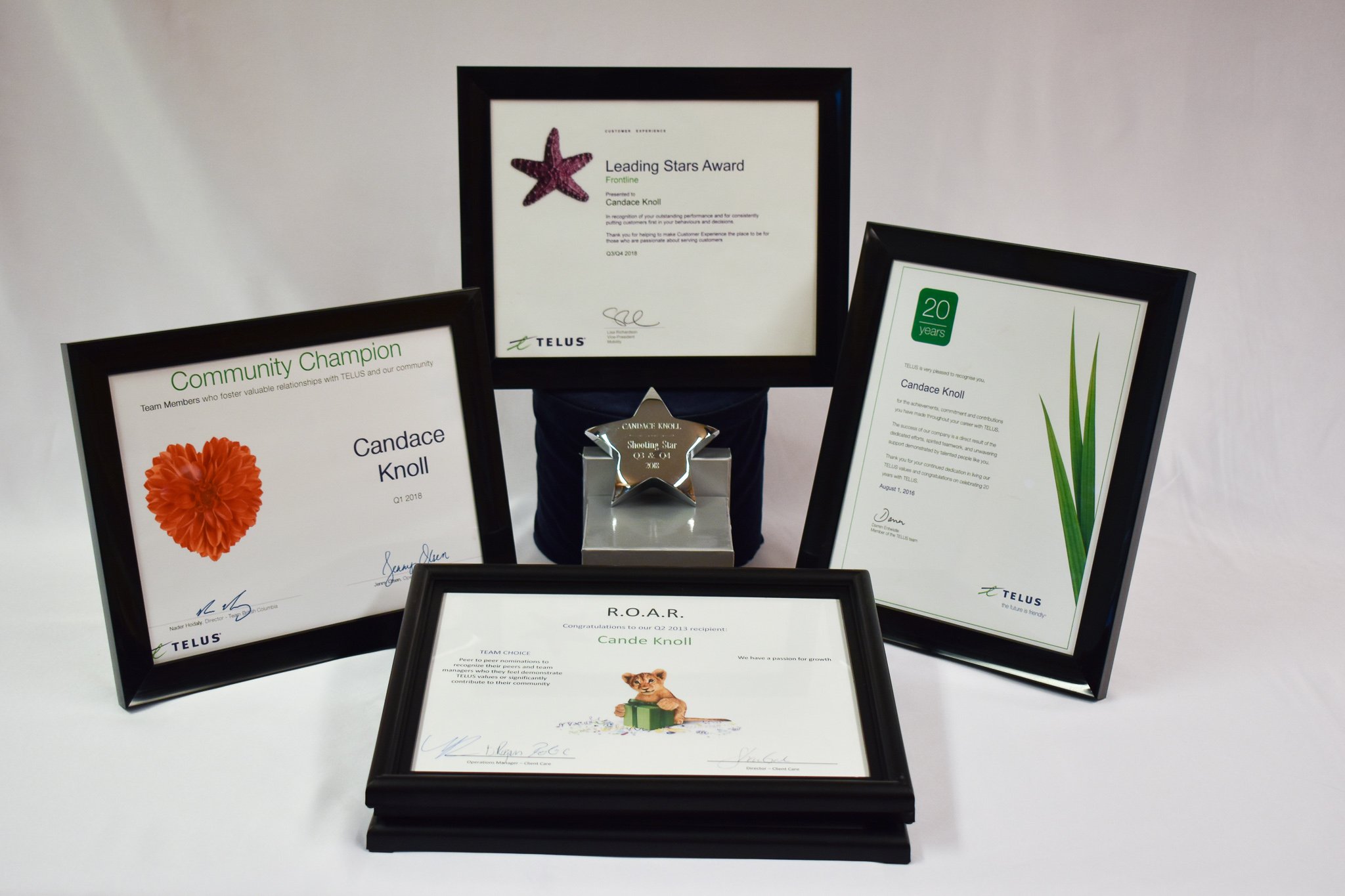
Memorabilia and awards from Candace’s time working at Telus over the past 20 years. Pictured are leadership and community involvement awards.
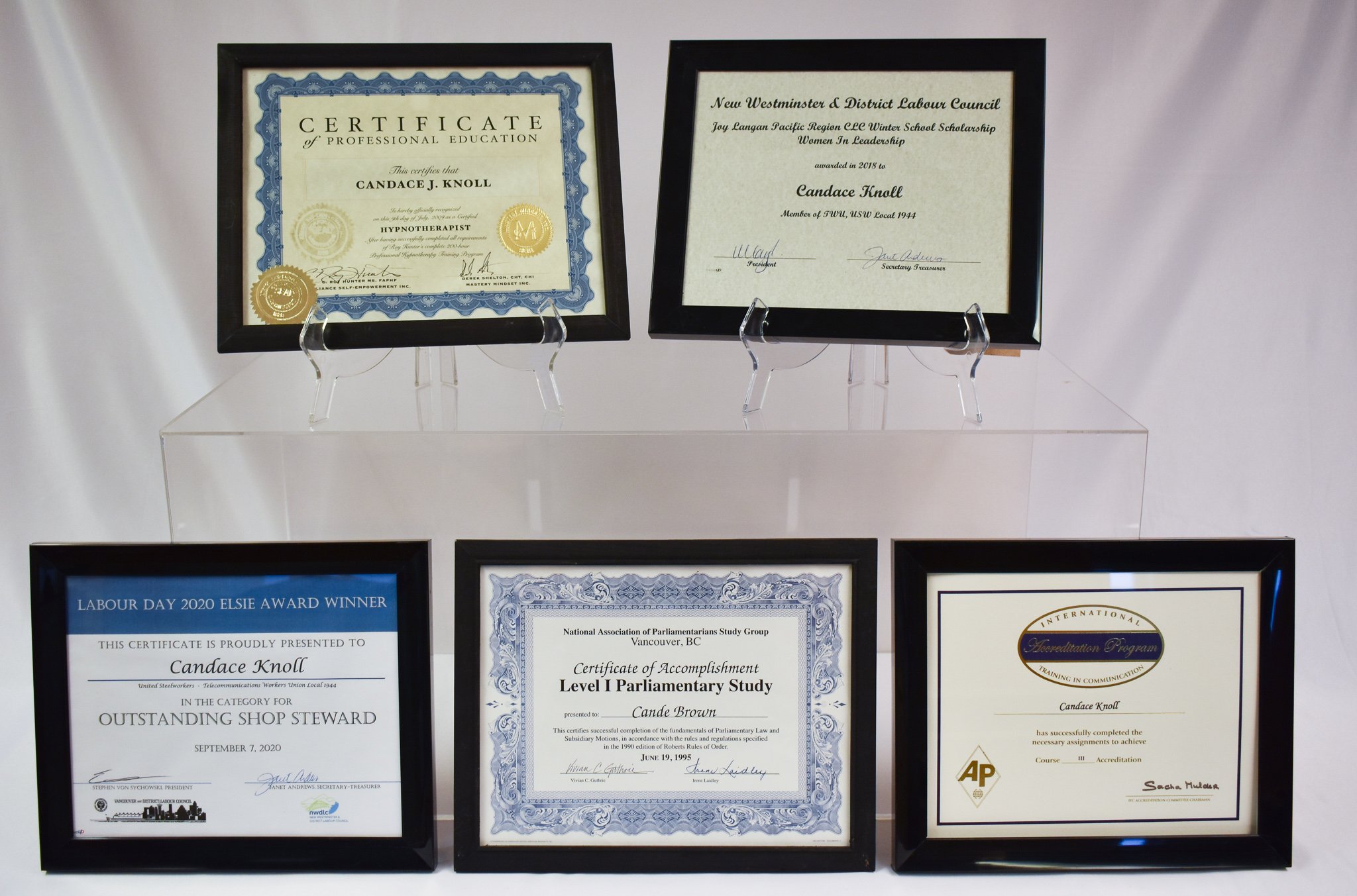
This items in this image are an abbreviated overview of Candace’s many accomplishments. Top row (L to R): Hypnotherapy certification; award from New Westminster & District Labour Council given to Candace for her leadership role in her union. Bottom row (L to R): 2020 Outstanding Shop Steward award from Vancouver and District Labour Council; Certificate of Accomplishment from the National Association of Parliamentarians Study Group; certification for Course III Accreditation for International Training in Communication.
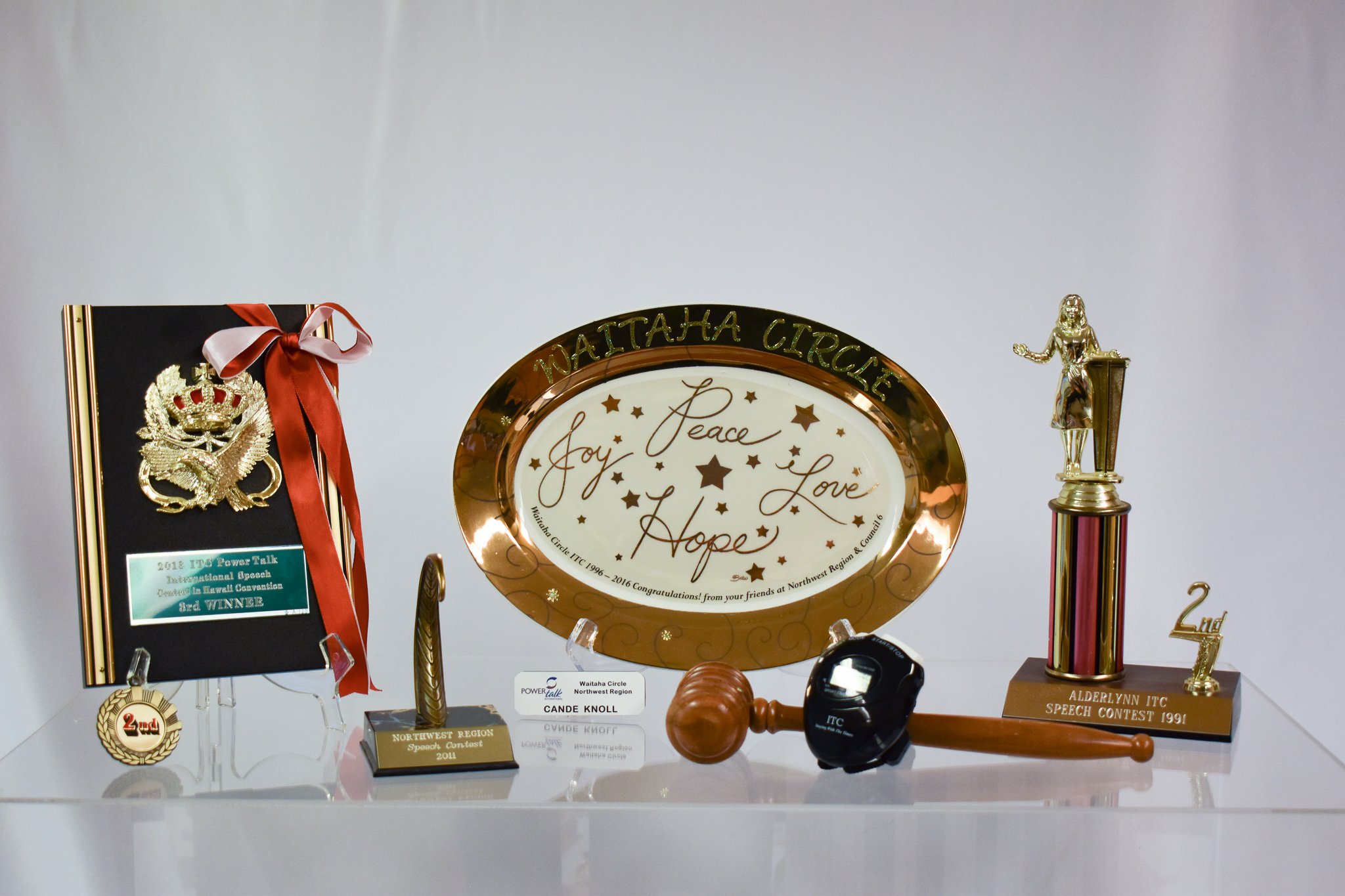
This photograph shows some items from Candace’s involvement with Toast Mistresses, (now ITC). (L to R): 3rd place award from the 2018 ITO PowerTalk Convention (competition for public speaking); 2nd place award from 2011 Northwest Region Speech Contest; PowerTalk nametag from Candace’s time as President of the Northwest Region; commemorative plate celebrating 20 years of involvement in the Northwest Region in 2016; gavel and stopwatch used at public speaking competition; Candace’s first trophy for public speaking from the 1999 Alderlynn ITC Speech Contest.
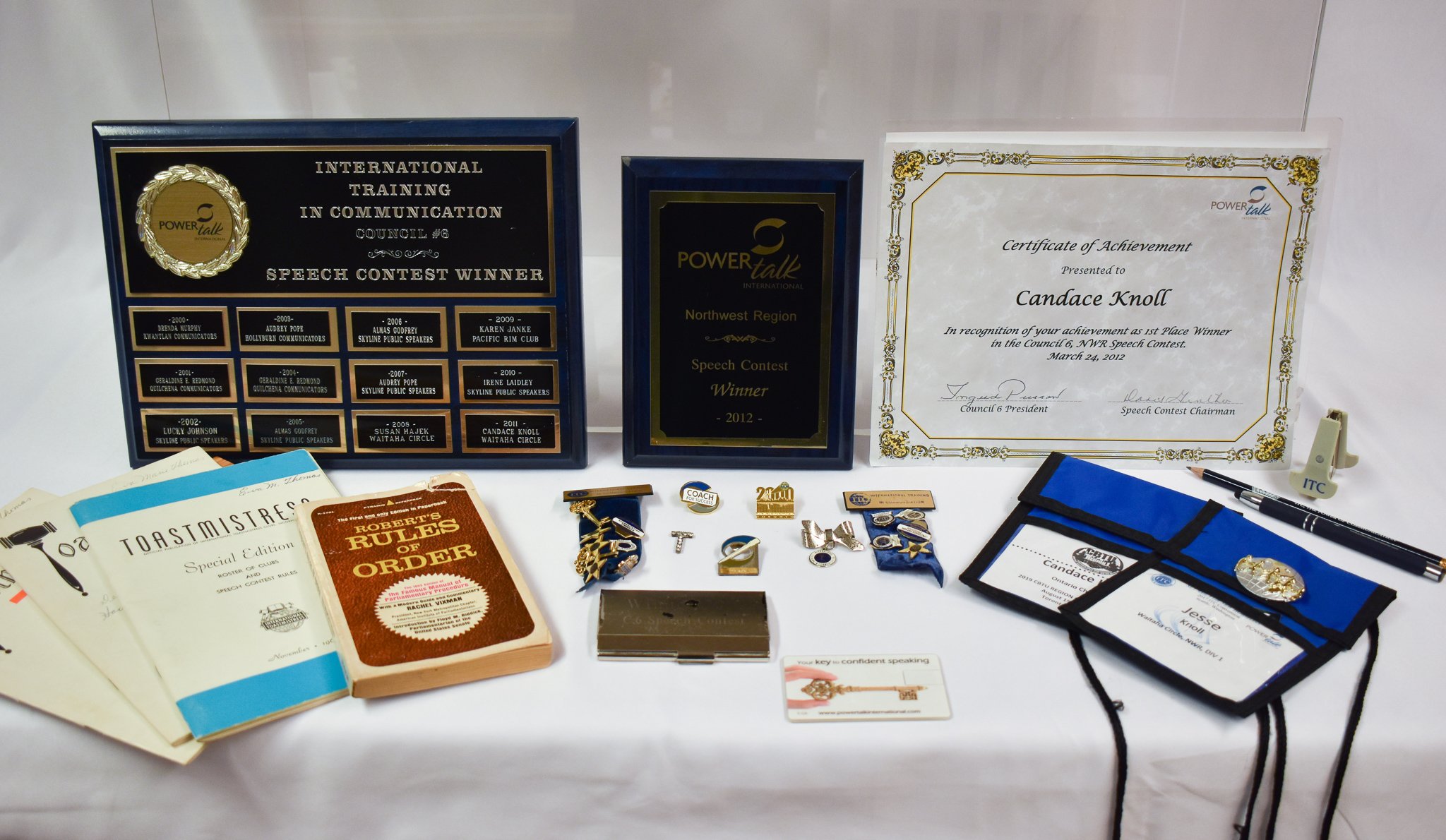
Some more Toast Mistress souvenirs and awards. Back row (L to R): plaques from various PowerTalk competitions where Candace won speech contests. Front row (L to R): Various editions of rule books for Toastmistresses; pins from various Toastmistress events and competitions; nametags from major union conferences attended by Candace.
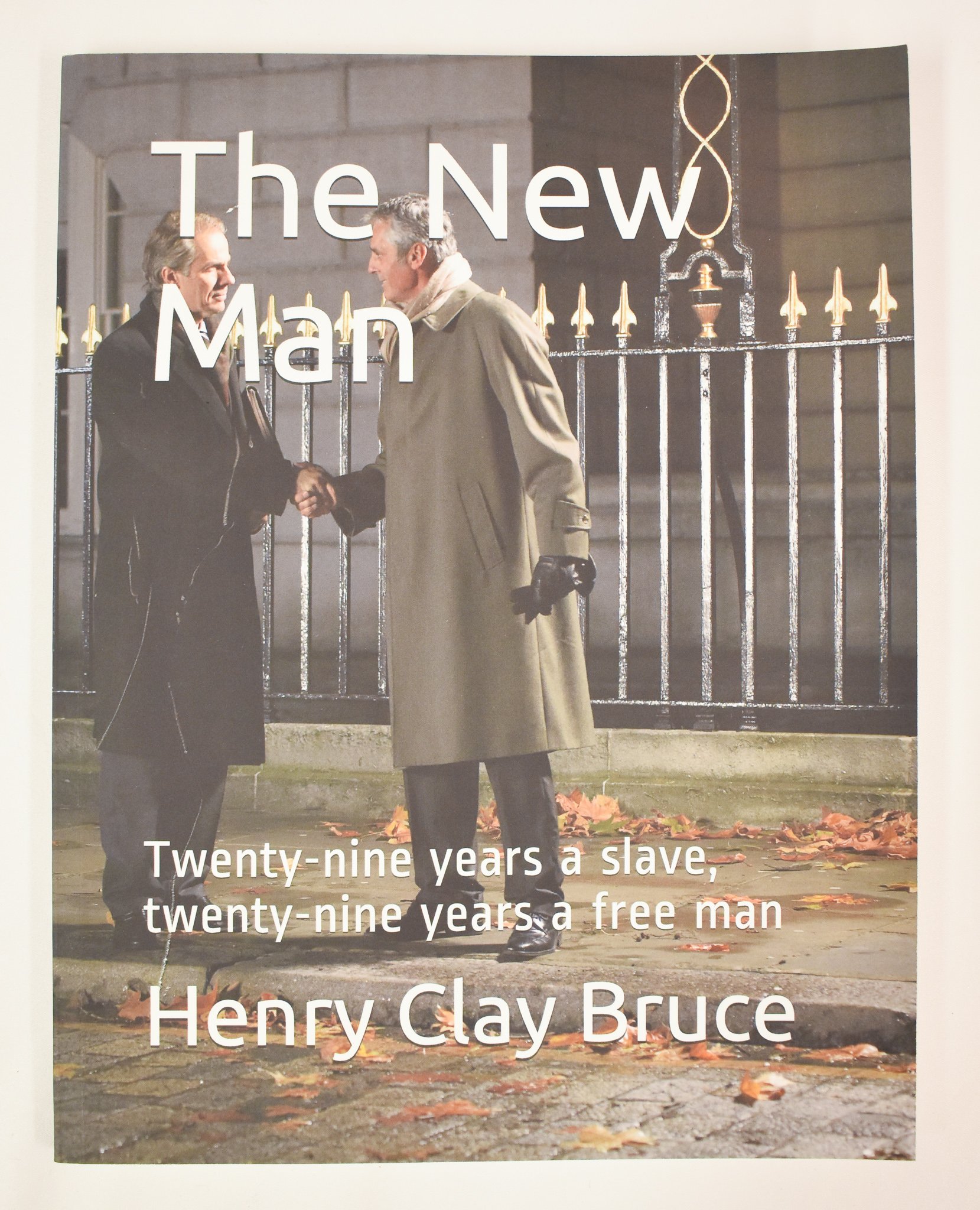
“The New Man: 29 Years a Slave, 29 Years a Free Man” is about Henry Clay Bruce, BK Bruce’s brother, who was also born into slavery. They had the same mother, but Henry’s father was their mother Polly’s first owner. Henry and his wife escaped slavery in 1864.
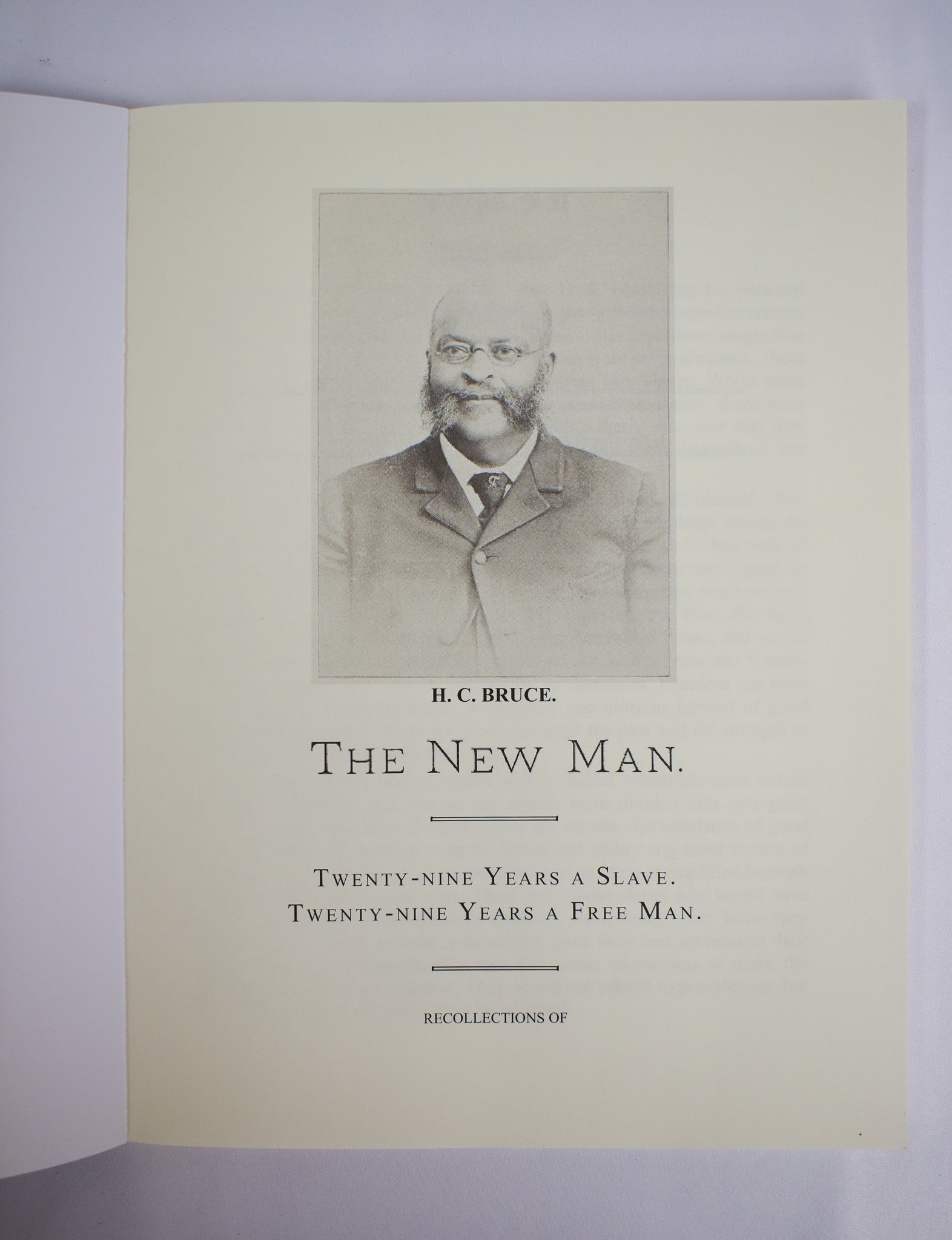
Frontispiece of “The New Man.”
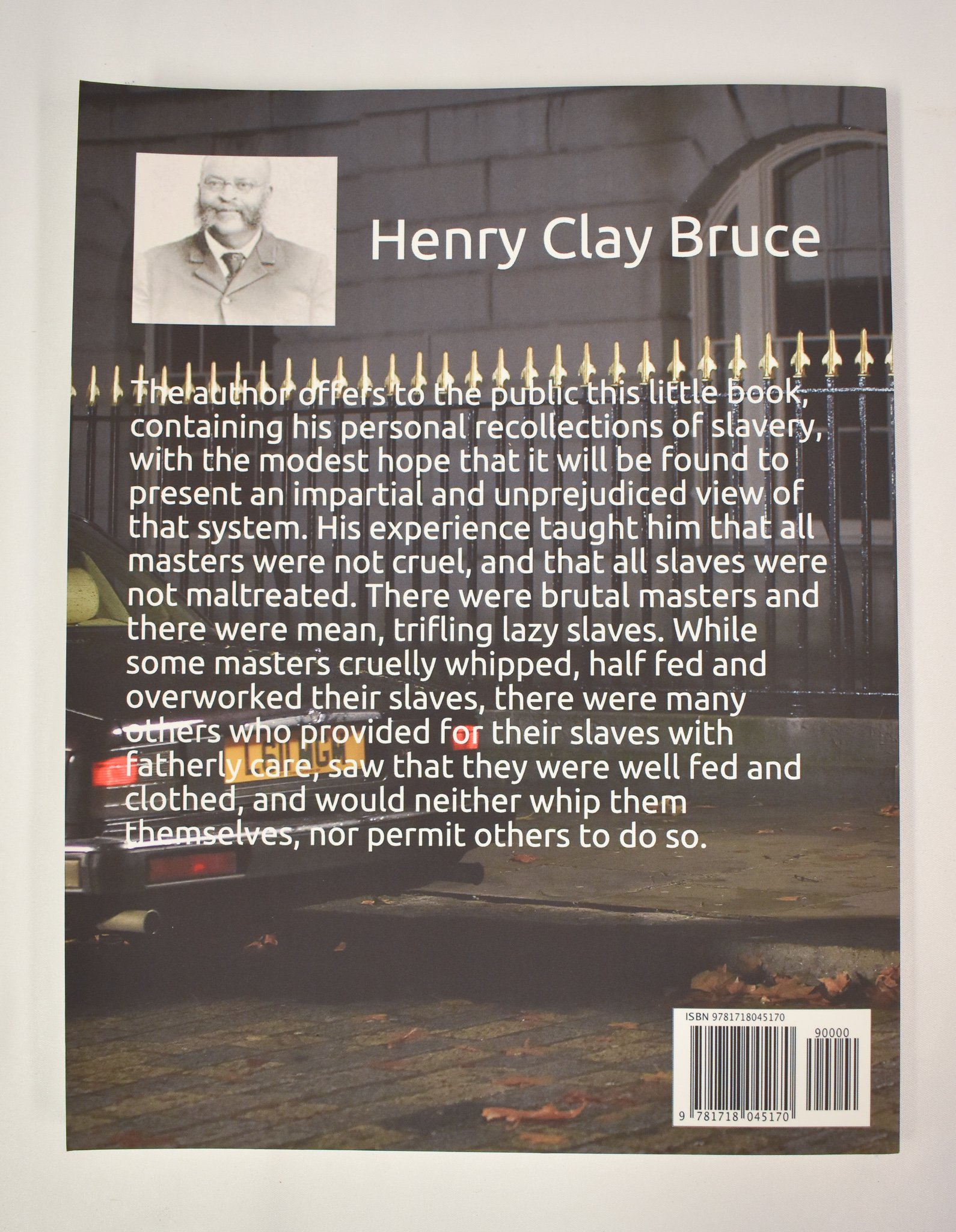
Back of the book, a brief description about Henry Clay Bruce, an abolitionist and Candace’s great-great-granduncle.

The Senator and the Socialite is about Blanch Kelso Bruce, aka B.K. Bruce, who was the son of a slave woman, Polly Bruce, and her second white owner. This book tells his story and how he became the first Black man to serve a full term in the U.S. Senate. Candace is a descendent of the Bruce family through her maternal grandmother, Cornelia Williams.
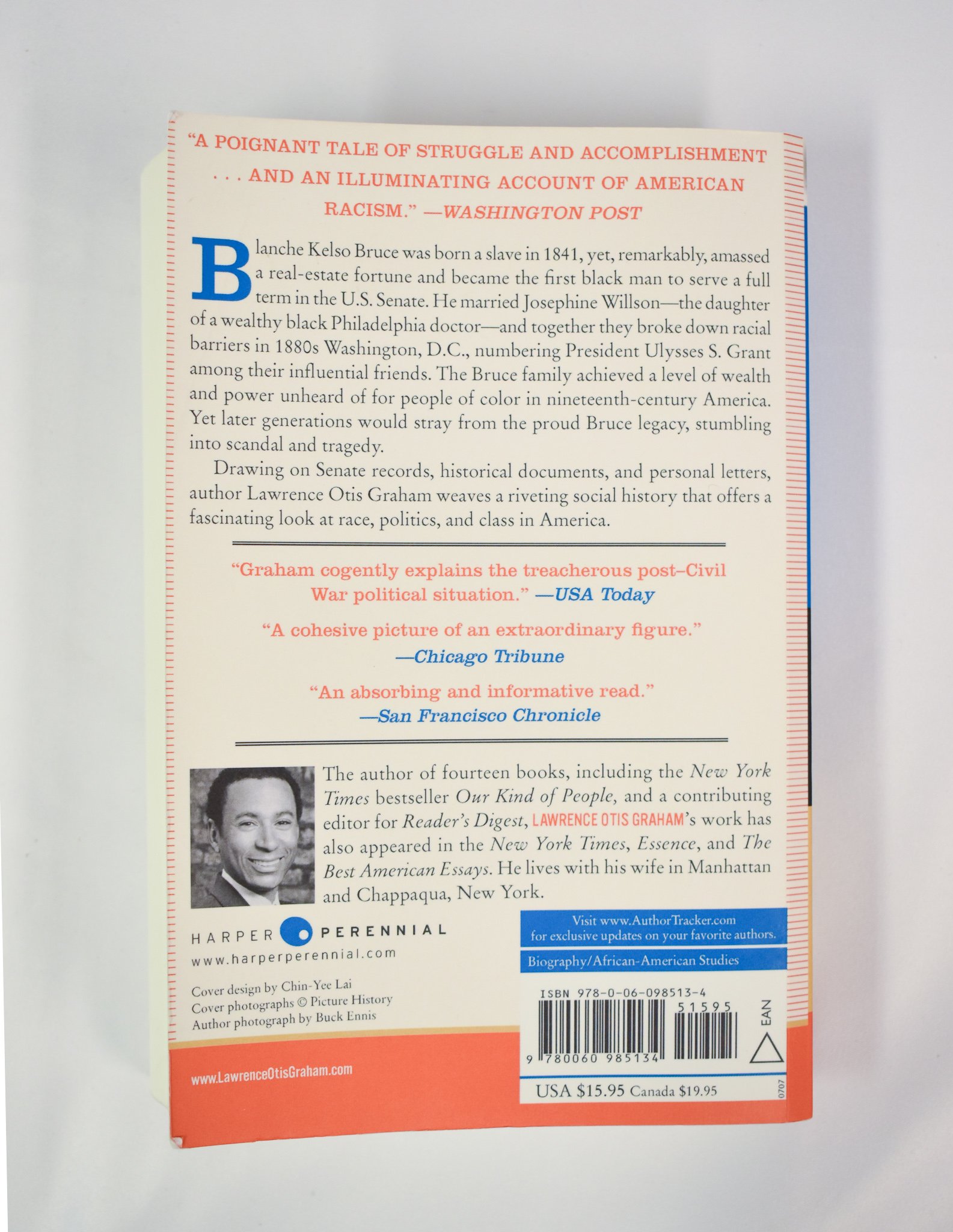
B.K. served as Senator for Mississippi from 1875 to 1881, presiding over the Senate in February, 1879, and even receiving eight votes for the office of Vice President at the 1880 Republican National Convention, becoming the first African-American to do both.
Florence and Ernest Daddey
Florence Daddey was born in Ghana, the seventh child in a large family. While Florence’s mother sought opportunities in the UK, Florence grew up with her aunts and uncles along with four other kids. After graduating high school, Florence joined her mother in England and passed her A-Levels before attending Nottingham Trent University. She then worked as a trainee accountant and in banking before earning a post-secondary teaching certificate. Despite having her own home and career opportunities in England, Florence moved to Burnaby in 2003 with her boyfriend.
The move was a significant change for Florence, but she was prepared by her experiences in England and knew her worth; she had faced significant racism in England but took initiative in Canada and did not let doors close on her. For example, as an educator, Florence has to regularly contend with her students’ ignorance and prove to them that they can rely on her; in addition to teaching, she has to set an example. She worked with the Open Learning Agency in Burnaby and, when the organization merged with University College of the Cariboo, she moved to Kamloops to work for Thompson Rivers University whilst her husband was commuting to the United States for work. Florence moved back to Coquitlam when her daughter arrived, and eventually accepted a job with the Justice Institute of BC, where she worked for ten years before moving to Douglas College.
Currently, Florence teaches business management at Douglas College and is passionate about advocating for the use of open education resources which is creating free, or zero cost teaching and learning materials to reduce the educational costs for students. Her daughter plays soccer and field hockey in the Tricities and has performed in plays at Evergreen Centre. Florence is also a devout Christian and attends North Side Church. She takes Christmas and Easter particularly seriously, not just for the gift-giving and celebration, but for the deep religious significance of the holidays. She is also active in the West African and Ghanaian communities in Vancouver, having sought them out after first moving to Burnaby. Florence believes in engaging with your community and participates in events and activities that seek to make a positive contribution in the community.
Florence Daddey oral history coming soon.
Ernest Daddey was born and raised in Ghana before moving to the U.K. for university where his parents were both nurses. He has two brothers and sisters who live near London. Ernest attended Greenwich University, London, where he studied to become a materials scientist/engineer, and graduated with honours. Following several years of professional studies, Ernest worked with multinationals and regional companies in the materials science field for over ten years while living in London, the Alsace region of France, and Cambridge, England. He met Florence in the U.K. in 2000. Florence suggested that they come to Canada since the application was only $995, and since Ernest had already made some connections with a Canadian company two years earlier.
The initial offer to move came in 2002 as Ernest was a trained engineer and had experience in several industries. His first job offer came in May 2002 and he began working at Creo, Inc., Burnaby, in July 2002 as a Materials Chemist. He enjoyed his first job, as the work culture was positive and social and the team he was working on was very multicultural and multi-disciplinary. After three years, Ernest then moved on to working at technology startups through his consulting entity, EOK Consulting Inc., working with clients from both Canada and internationally. He has worked with several other large, successful engineering and consulting firms, including a stint as Executive Director of an entrepreneurial incubator in Prince George under the government of BC strategies to focus on innovation to commercialization.
This work culture and experience was in line with his African upbringing, with its push towards higher professions and skills. In Canada, Ernest saw that trades were more valuable; this was good as he is good at tinkering. Ernest was also an accomplished networker and developed a significant social circle in Canada. Within three years of arriving, he had become President of the Ghana Canada Association of BC, was involved in several other large African groups, and mentored through S.U.C.C.E.S.S.
Ernest has found much success in Canada, running and starting several successful companies, filing patents, and becoming a well-respected businessman and engineer. He has earned many professional recognitions and is very well-respected in the professional management and technology fields.
Tara Self (née Perry)
Tara Self, nee Perry, grew up near Riverview Hospital when it was still a mostly rural area. She attended Meadowbrook School, then Parkland and completed high school at Centennial. She completed her post-secondary education at Simon Fraser University. Tara currently lives in the Ranch Park area with her husband and twin daughters. Both Tara and her brother, Jason, were coached by her father, Percy. Jason played high school football, and Tara pursued track and field. She competed in 100 meter and 200 meter sprints, and her career as a sprinter lasted for over 15 years. As her career progressed, Tara was coached by Coquitlam’s Mike Murray, then later, while training in San Diego, she was coached by Rahn Sheffield. She has competed at every major championship with some significant successes. At the 1999 World Championships she placed 6th, placed 4th at the World University Games (1997), and has also added Canada Games Champion (1993), Canadian National Junior Champion (1993), and Canadian National Senior Champion (1996), to her list of accomplishments. Tara has also been a member of Canada’s Olympic Team twice, in 1996 and 2000. Tara is also featured at the Coquitlam Sports Hall of Fame.
Tara has taken her experience and applied it back to her community, coaching numerous young athletes to national and provincial championships. She is also following in her father’s footsteps and has been the head coach for the Coquitlam Cheetahs since 2004. Tara’s husband Paul, is also a Cheetahs coach, and the couple’s children have started playing for the Cheetahs. The Perry legacy continues.
Photo credit: Courtesy of The Coquitlam Sports Hall of Family
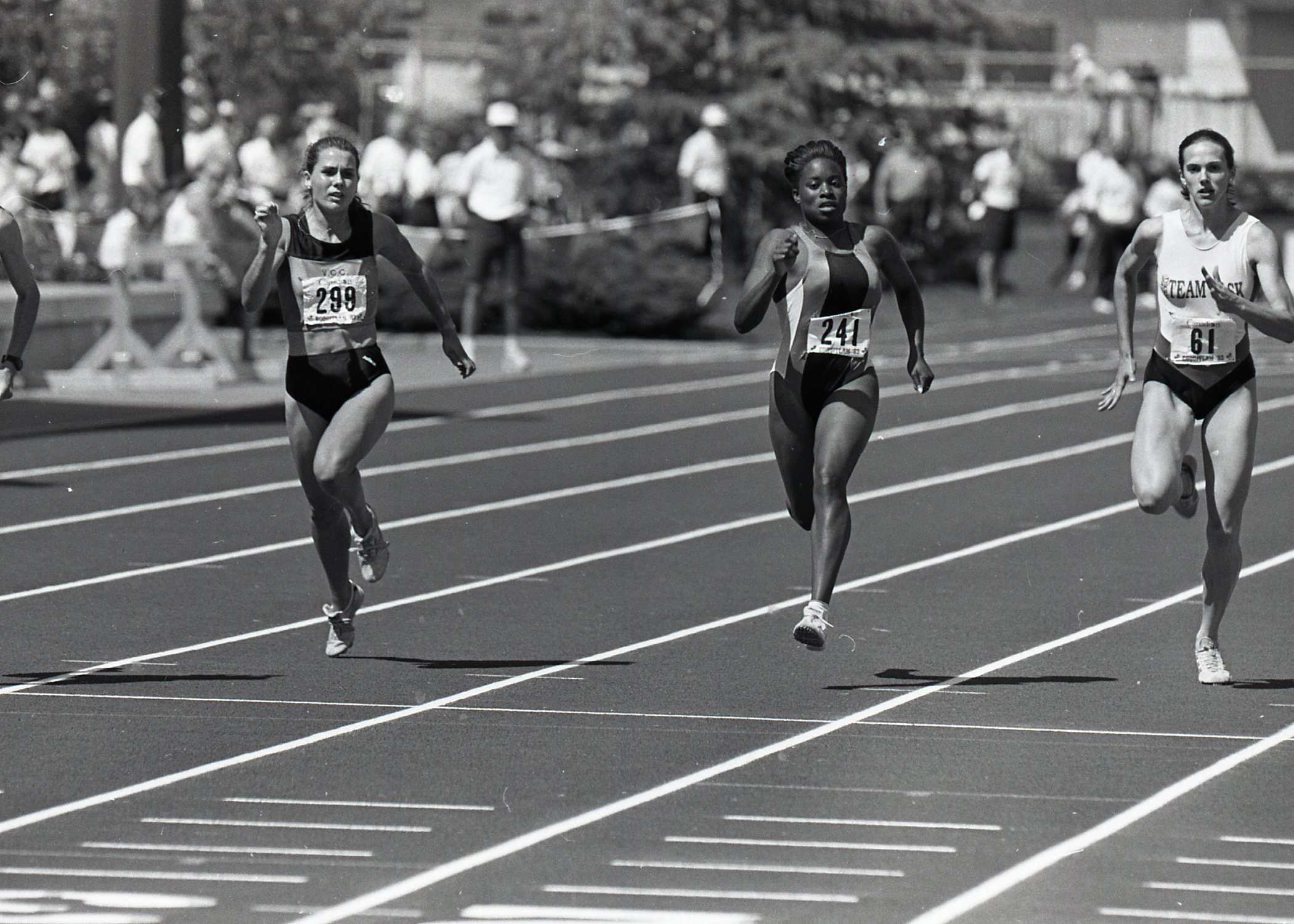
Tara Perry and Dena burrows (F13-93-2238_002, Tri-City News, City of Coquitlam Archives)

Tara’s running shoes used at the 1996 Summer Olympics.
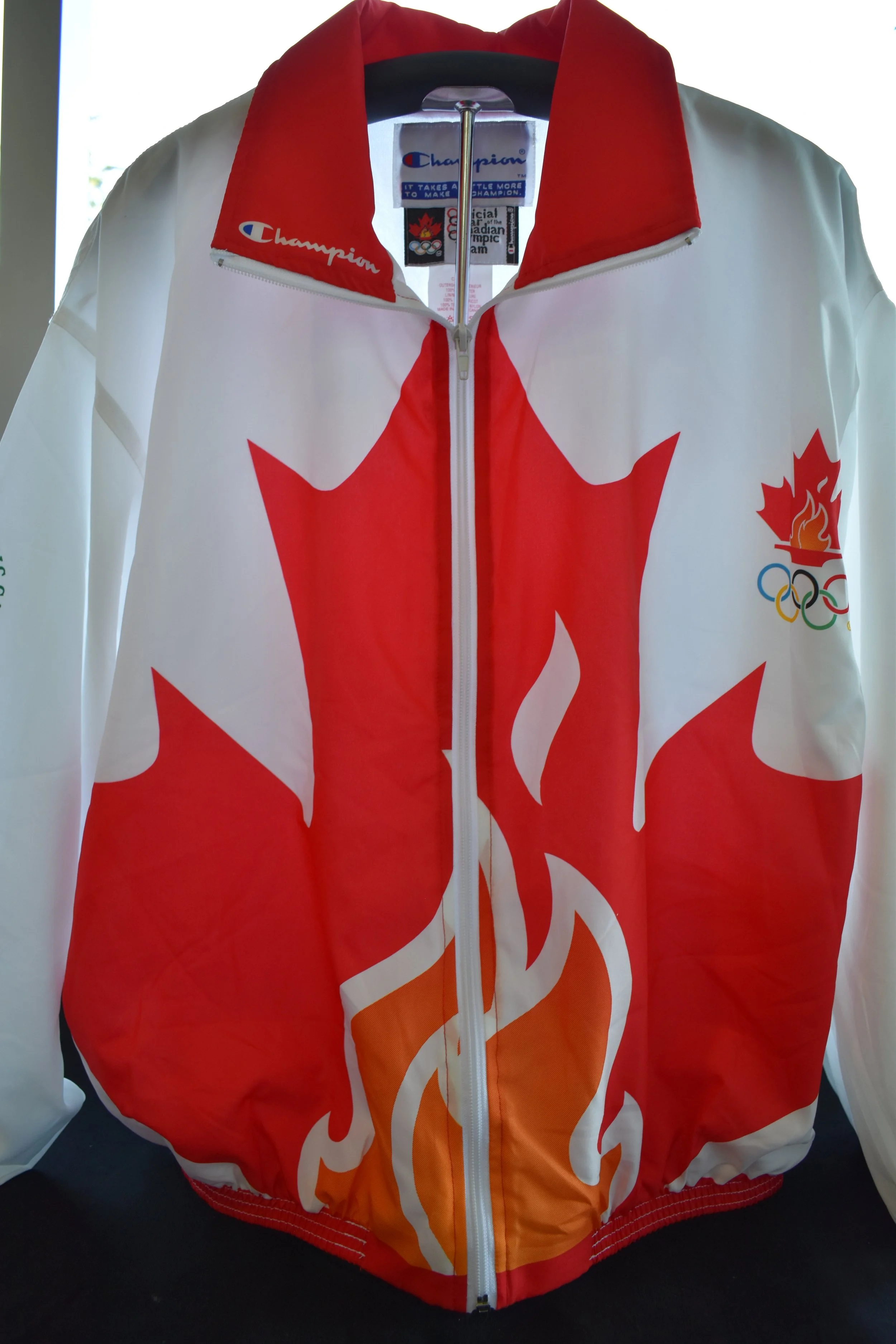
Warmup tracksuit worn by Tara Self at the 1996 Summer Olympics. Photo courtesy of Coquitlam Sports Hall of Fame.
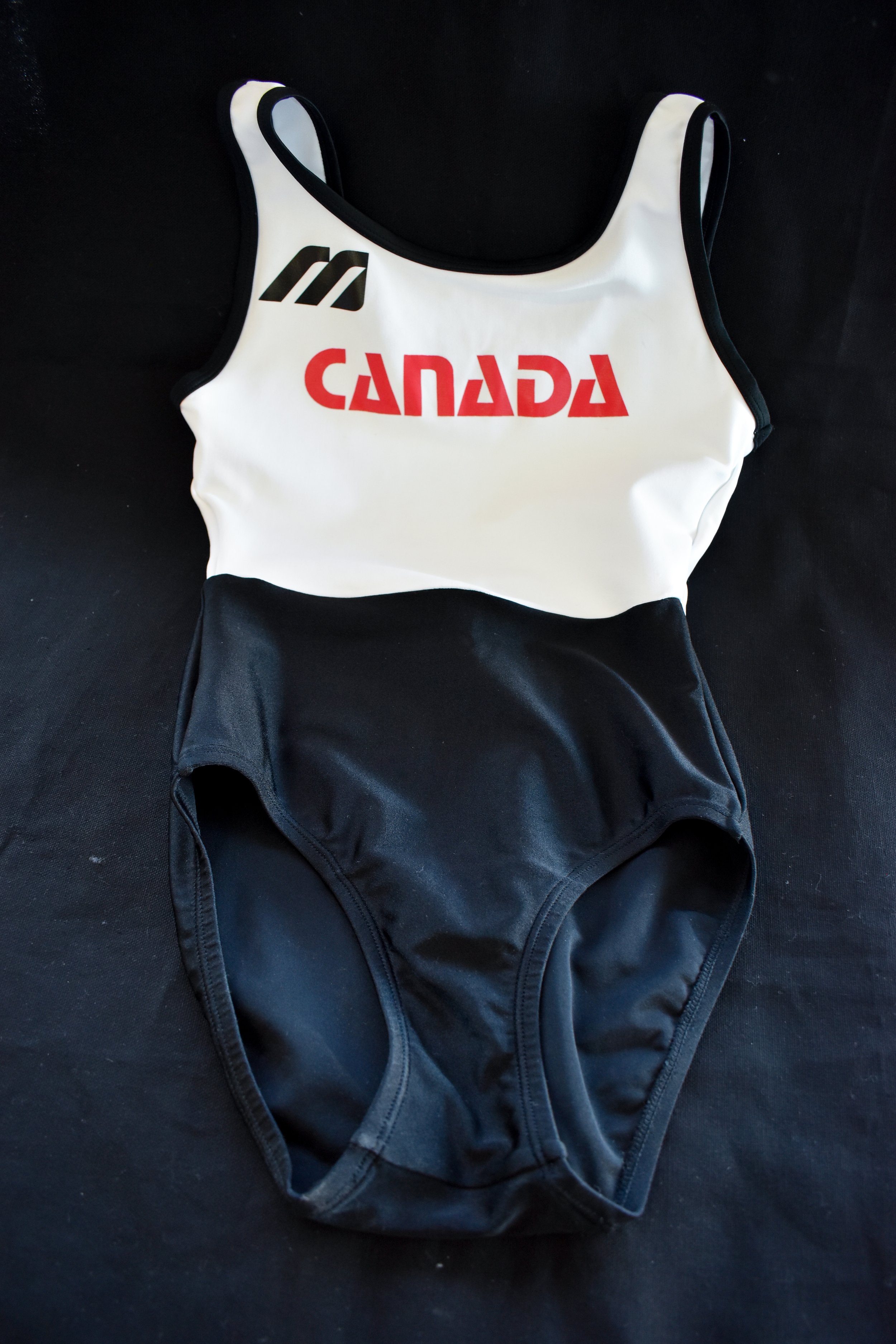
Tara Self’s running singlet. She wore number 2136 at the Olympics. Photo courtesy of Coquitlam Sports Hall of Fame.
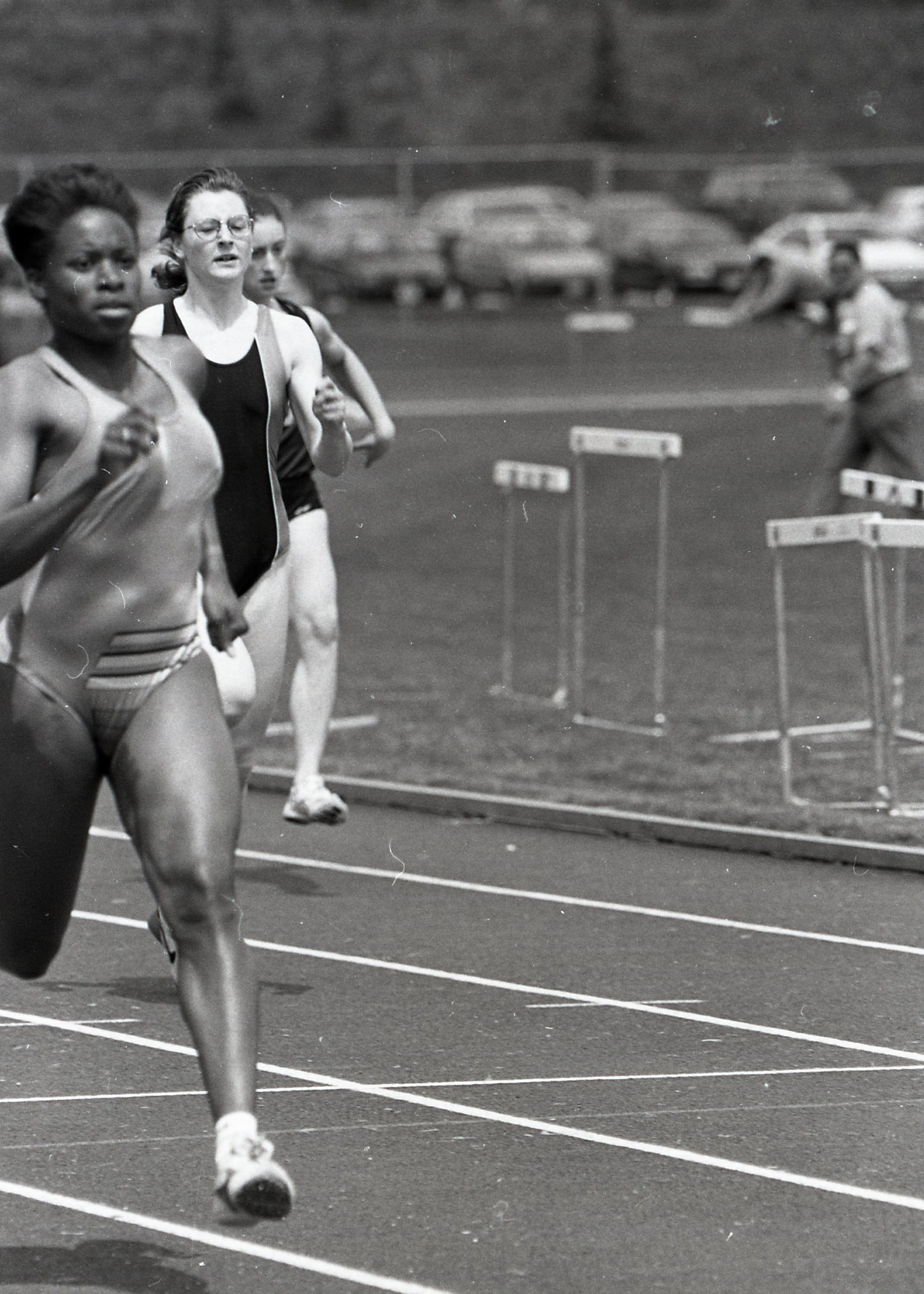
Lloyd Swindells Relays at Coquitlam Town Centre, with Tara Perry competing in 100m. Taken at B.C. High School track and field championships in 1994. (F13-94-1535_003, 1994, Tri-City News, City of Coquitlam Archives.)
The Ryan Family
1984, CA CCOQ F19, Tri City News, City of Coquitlam Archives, Coquitlam Now (May 1 1984 pg 10)
The Ryan Family came to Canada in the 1960s. Alex Ryan left St. Kitt’s for England, as a young man, then moved on to do his undergraduate degree in the United States. In 1965, he began working for the Ministry of Social Services in Prince Rupert as a Social Worker. At that time, in Prince Rupert, there were many single men who worked and lived in hostels. Part of his position was to work with the hostel to understand who these men were and what their needs were, while in the city. Eventually, he travelled home to St. Kitts where he married Mary Christmas, and the two came to Canada. After living for some time in New Westminster, they purchased a home in Coquitlam in 1971. They raised three children, Larry and Willem, and adopted their niece, Varetta.
Alex worked at Riverview Hospital as a social worker in the East Lawn’s Women’s Sector, and after retirement became an ordained minister in the Church of God, in Richmond.
Larry went to school at Rochester Elementary, followed by Montgomery Middle School, then Centennial High School. He received an undergraduate degree from Simon Fraser University in psychology, which he later followed up with a Master’s degree from Trinity College. He works as a vice principal in Coquitlam.
His brother, Willem, was a sprinter who was coached by Percy Perry.
The Clarke Family
The Clarke family came from Jamaica to settle in Coquitlam, via England and northern Saskatchewan. Neville and Vashti Clarke boarded with a Maillardville family, Sue and Orel Remillard and their five children, until they were able to purchase the house next door. Sue Remillard recalls Vashti stepping outside in a cotton dress on a cold winter day, hoping to warm up in the sun. Neville’s brothers, Claude and his wife and two boys, and George and his wife Veronica, also came to Coquitlam; Claude and George via England and Neville directly from Jamaica. Neville and Vashti’s daughter, Wilma, in a conversation at Mackin House, recalls her dad and uncles going up to the Coquitlam Legion. Her grandfather, Ralph Clarke, was in the RAF and would have worn a uniform similar to the one shown here.
This Airforce uniform, and the great coat with the Barbados insignia, belonged to Eustace W. Heath, Coquitlam. He was born in Barbados, and was working in Trinidad when he volunteered with the RAF. He did Air Corp Officer training in Moncton, New Brunswick, #1 Learning Pool, and was a 2nd grade pilot in the Airforce. He later completed elementary and senior flying training. He did not see active combat, but instead served as a training officer for glider pilots.
The Caribbean Air Crew website lists him as follows: 605749 – E.W. Heath – Trinidad – attested 1.12.43 – Sgt. Pilot #217 SFTS
Local research failed to turn up any current information about Mr. Heath.

Portrait of Tricia Clarke, sprinter for Coquitlam Cheetahs and Centennial High School. (F13-95-1357_002, Tri-City News, City of Coquitlam Archives)

Tricia at the 1991 BC Summer Games after winning the 100m sprint.
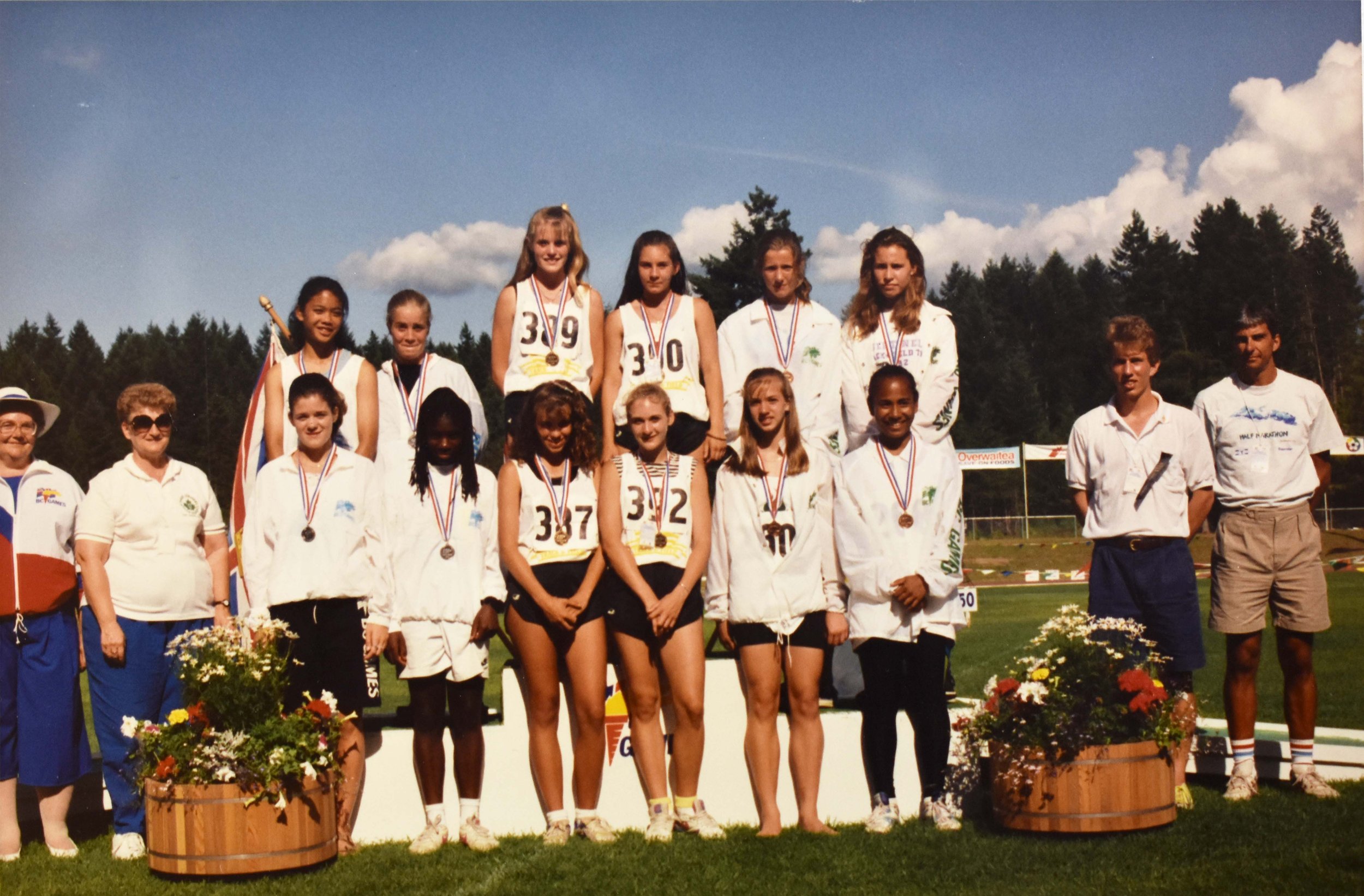
Tricia at the 1991 BC Summer Games after winning the 100m sprint.

Group photo from the 1991 BC Summer Games at Percy Perry Stadium. Patricia Clarke competed in Track & Field at the games.

Tri-City News, May 1994 (1994, 94 1535, Black Press Fonds, City of Coquitlam Archives)
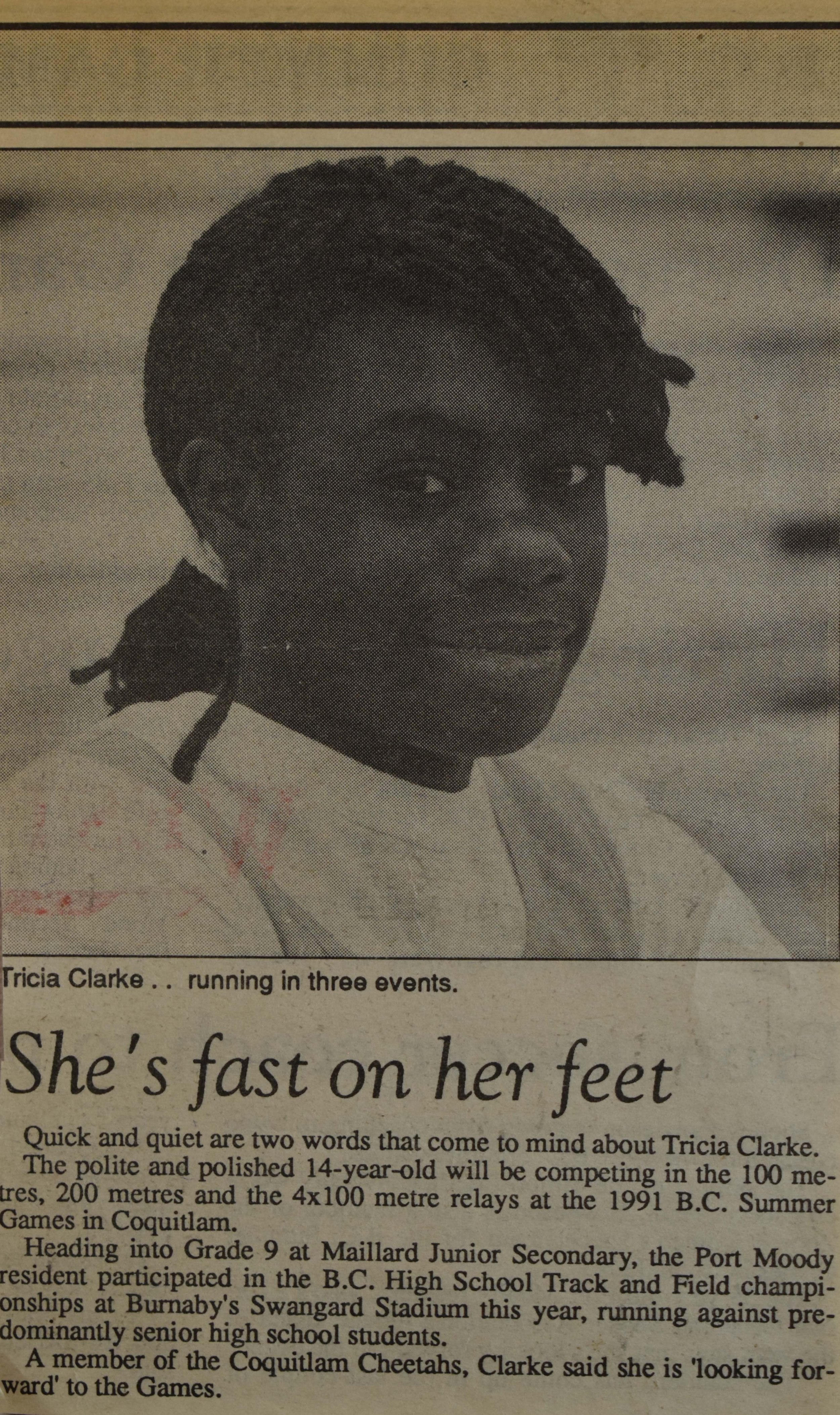
Clipping of a spotlight profiling 14-year-old Tricia Clarke before the 1991 BC Summer Games.
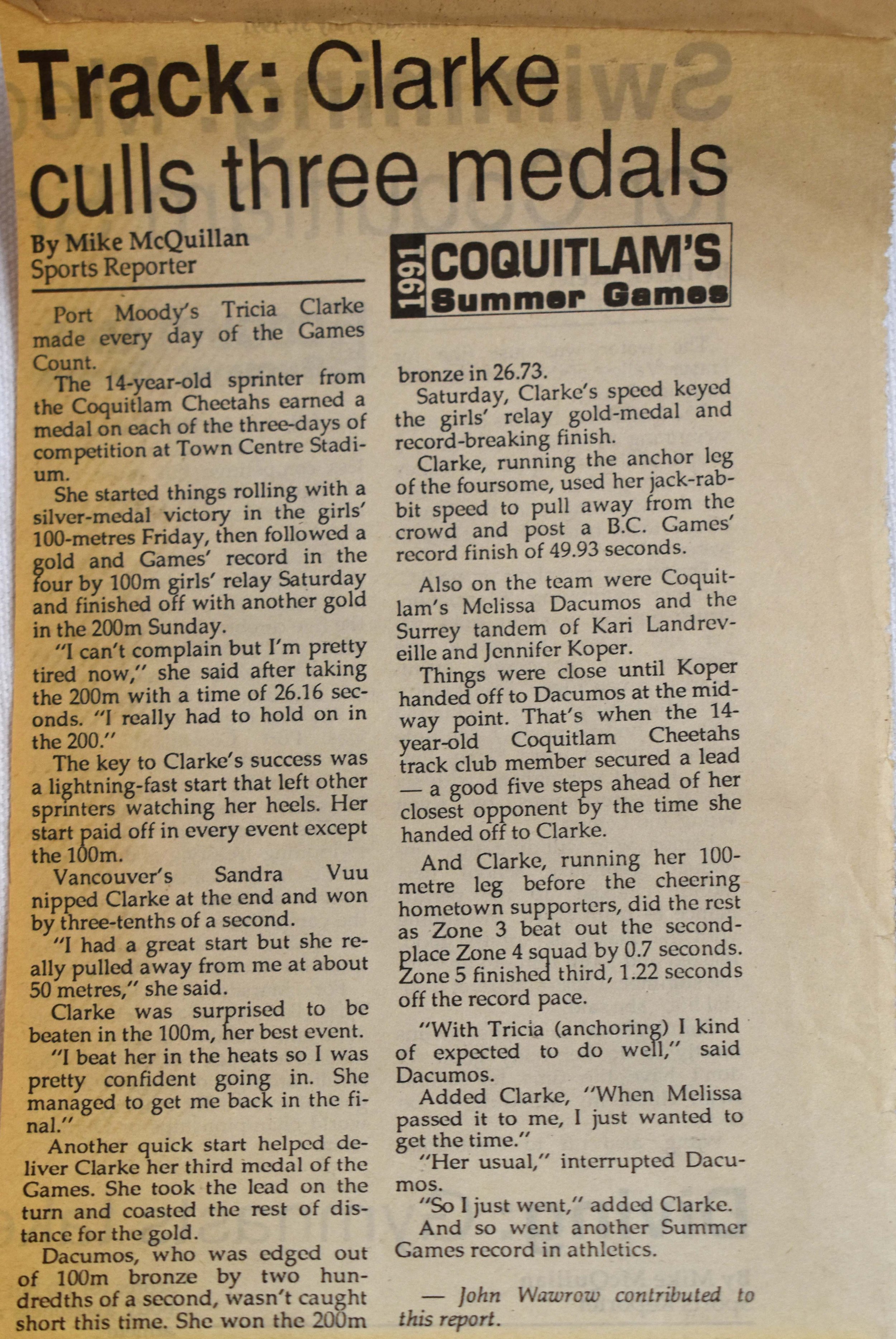
Tri-City News Article clipping about Tricia Clarke’s success at the 1991 BC Summer Games.
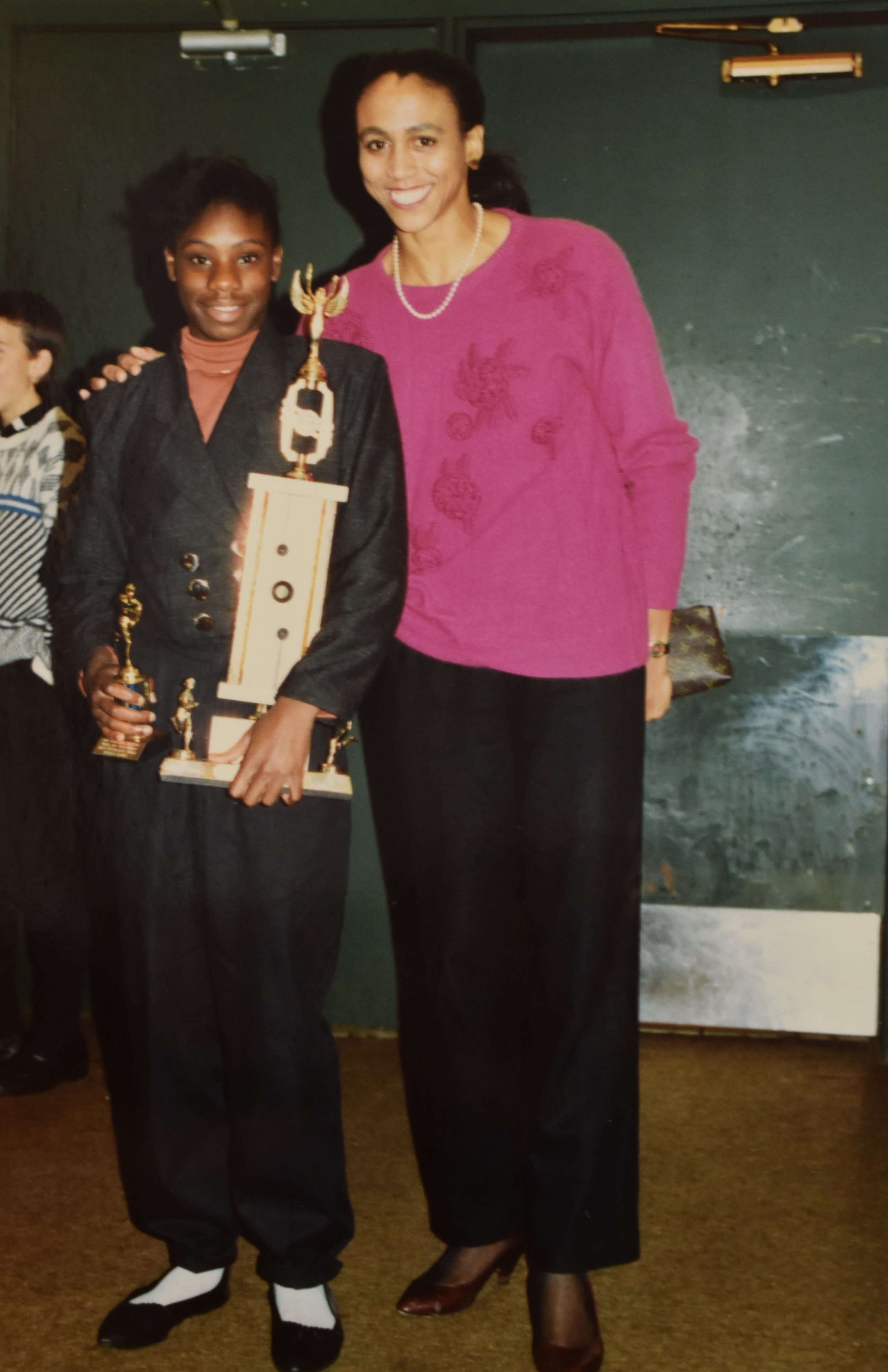
Tricia with one of her many awards.
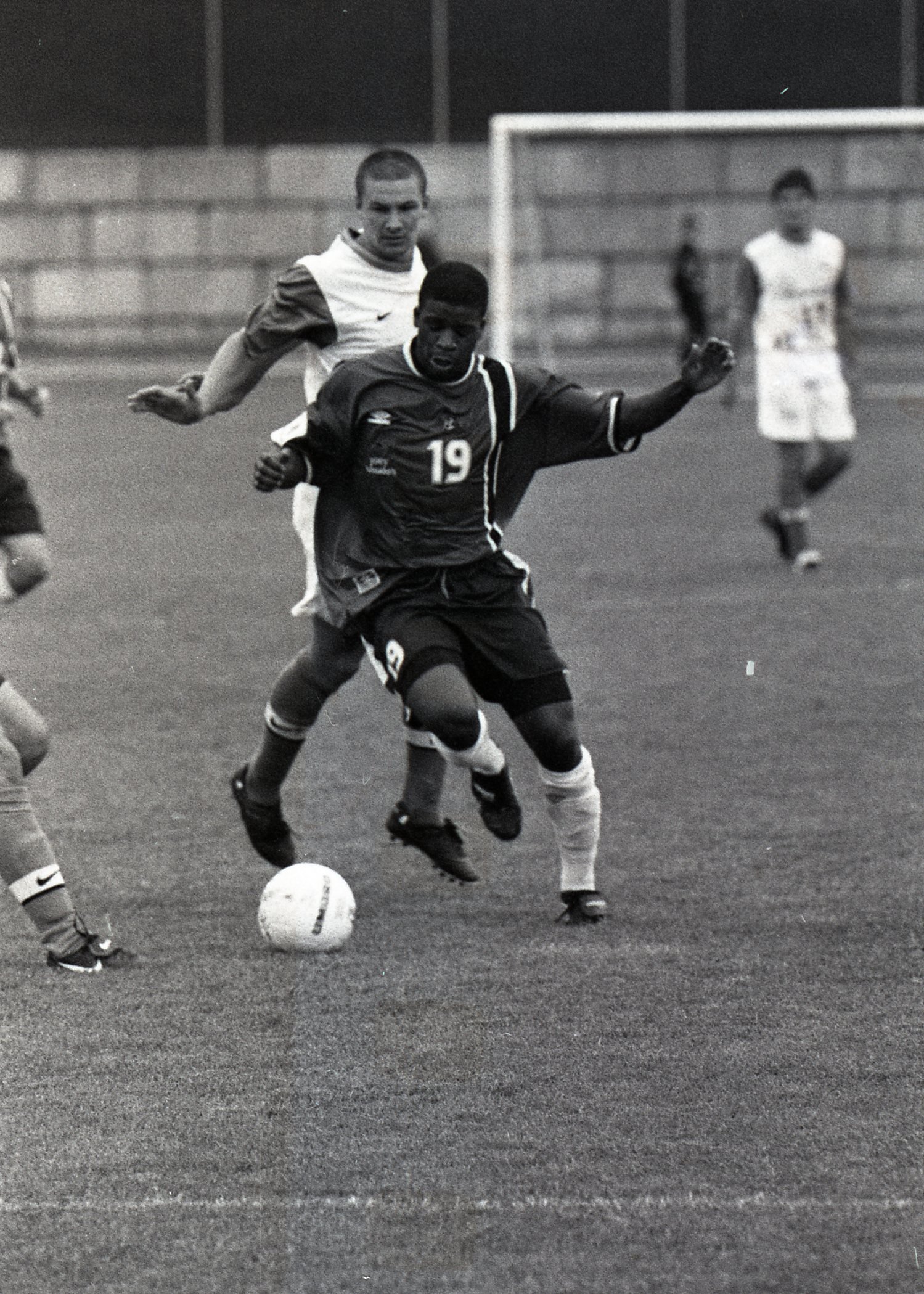
Chris Clarke playing as striker with the 86er’s at Swangard Stadium, May 1998. (F13-98-1060_002, Tri-City News, City of Coquitlam Archives)
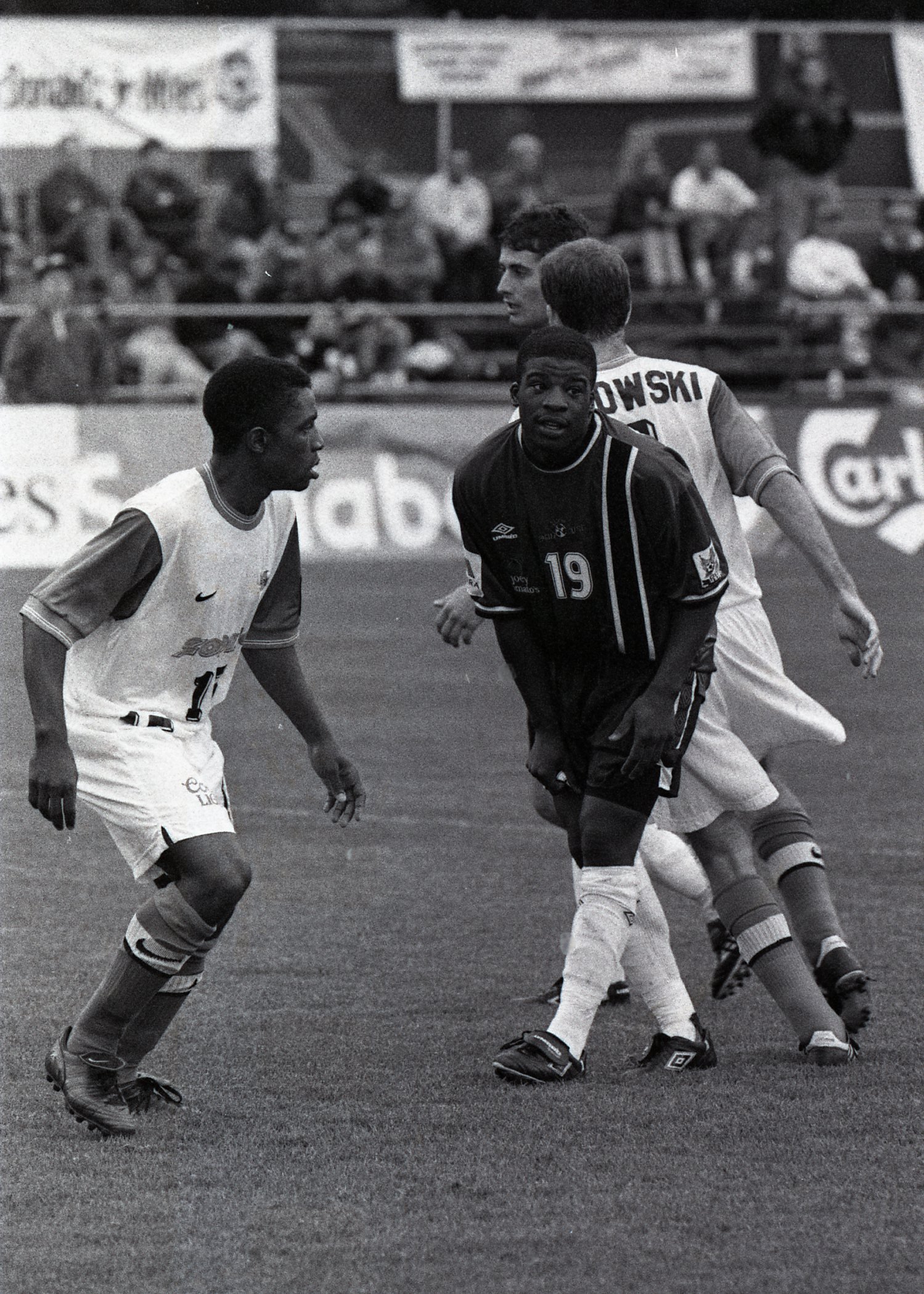
Chris Clarke playing for the Vancouver 86er’s in a home game at Swangard Stadium. (F13-98-1060_004, Tri-City News, City of Coquitlam Archives)
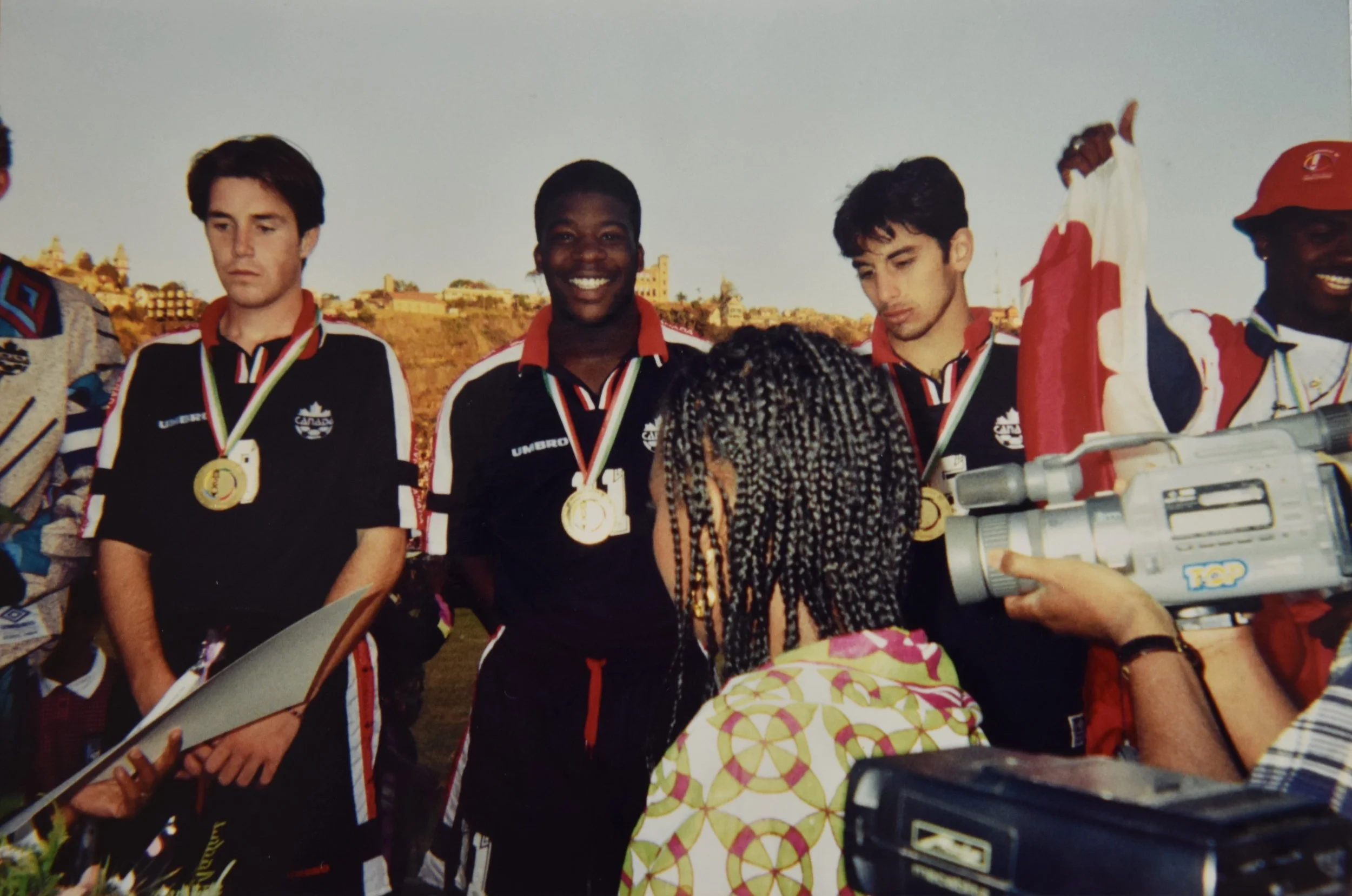
Chris Clarke (centre) receiving a gold medal as a member of Canada’s Francophone Games soccer team at the 1997 Francophone Games in Madagascar.
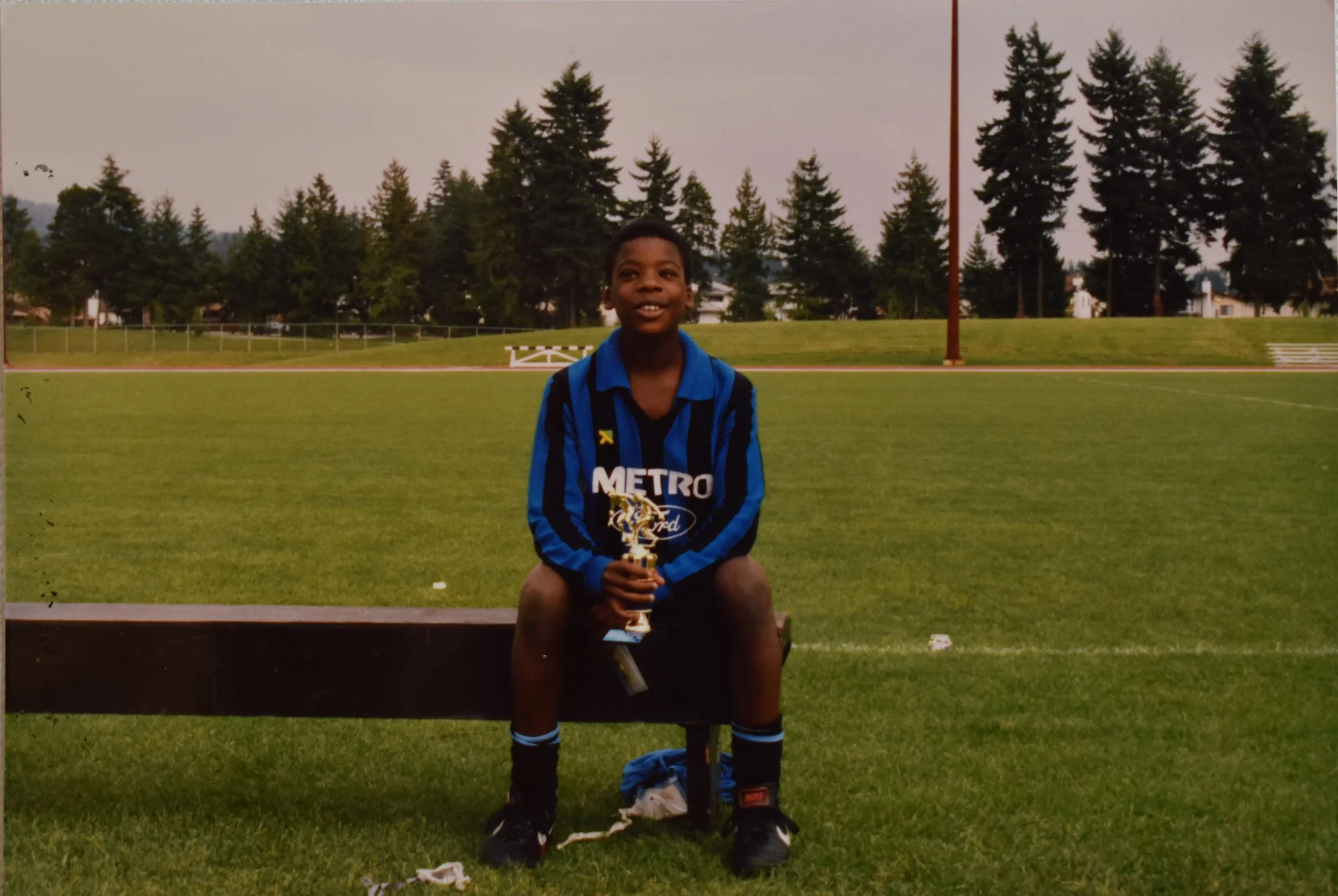
Chris Clarke playing as striker with the 86er’s at Swangard Stadium, May 1998. (F13-98-1060_002, Tri-City News, City of Coquitlam Archives)
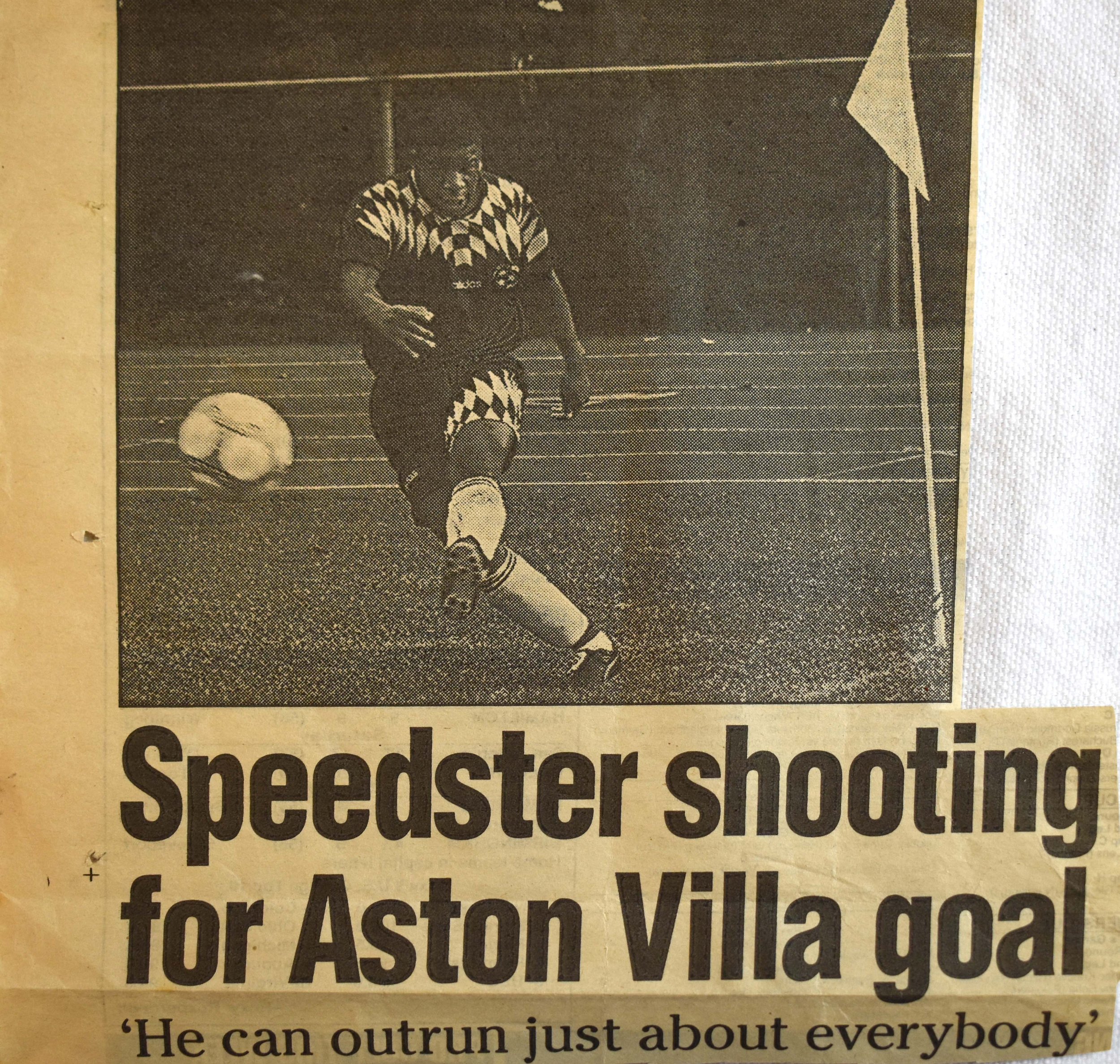
Newspaper clipping from when Chris tried out for Aston Villa, a British Premier League soccer team, in the late 1990’s.
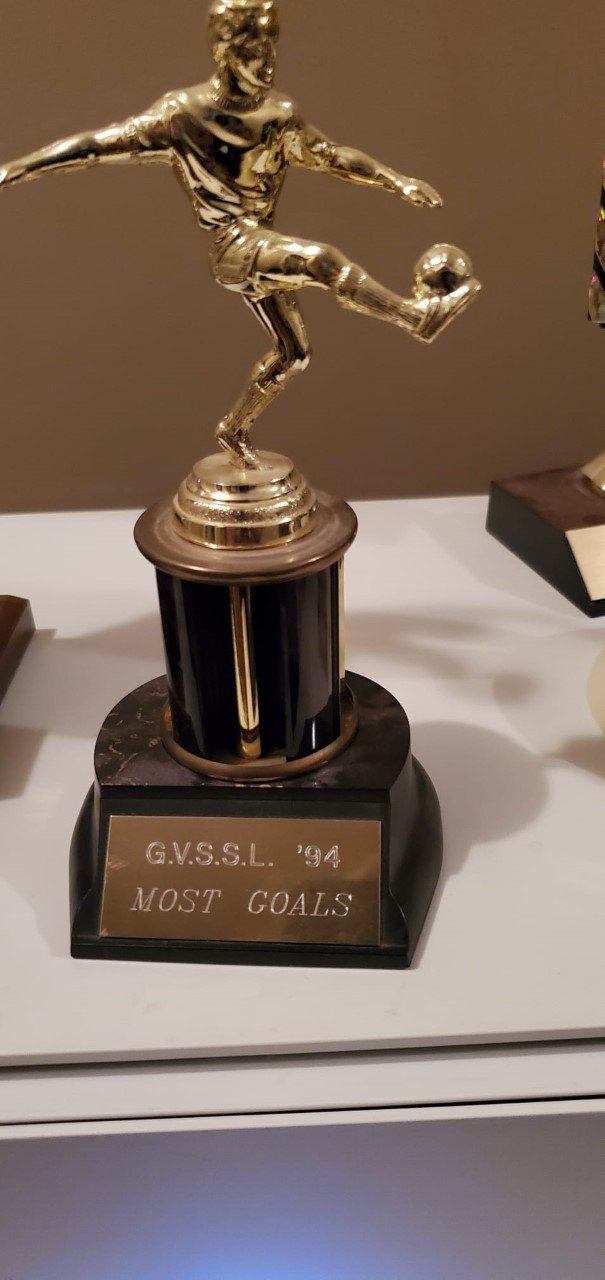
1994 -GVSSL-Award for most Goals
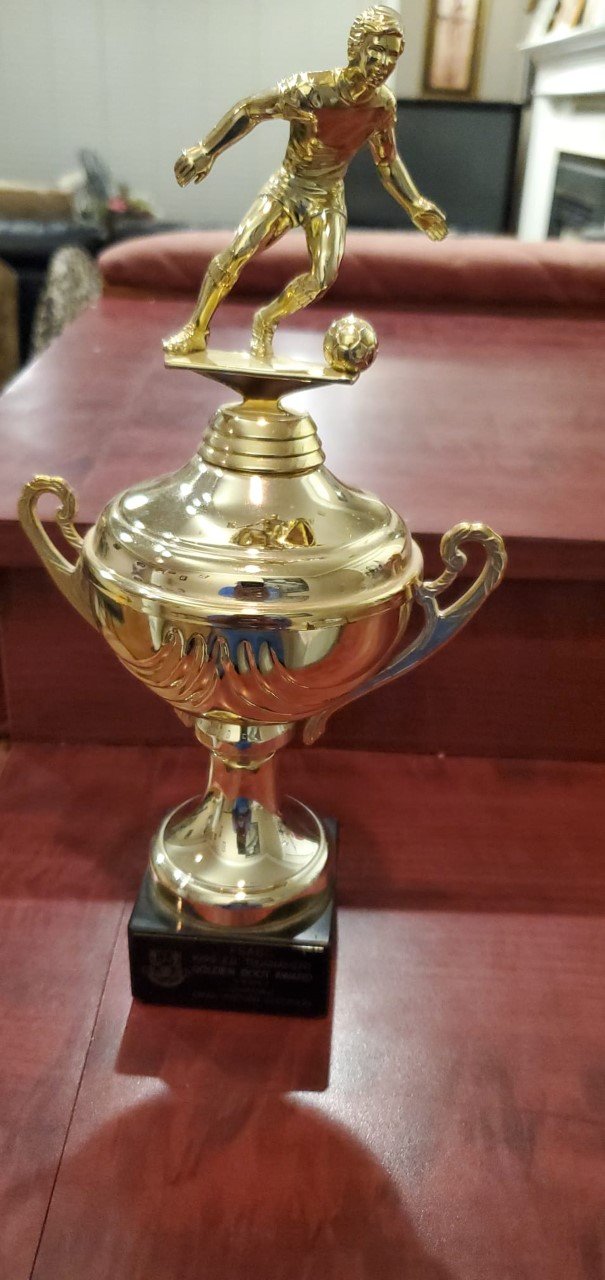
1990-Metro Ford Soccer(Golden Boot Award)
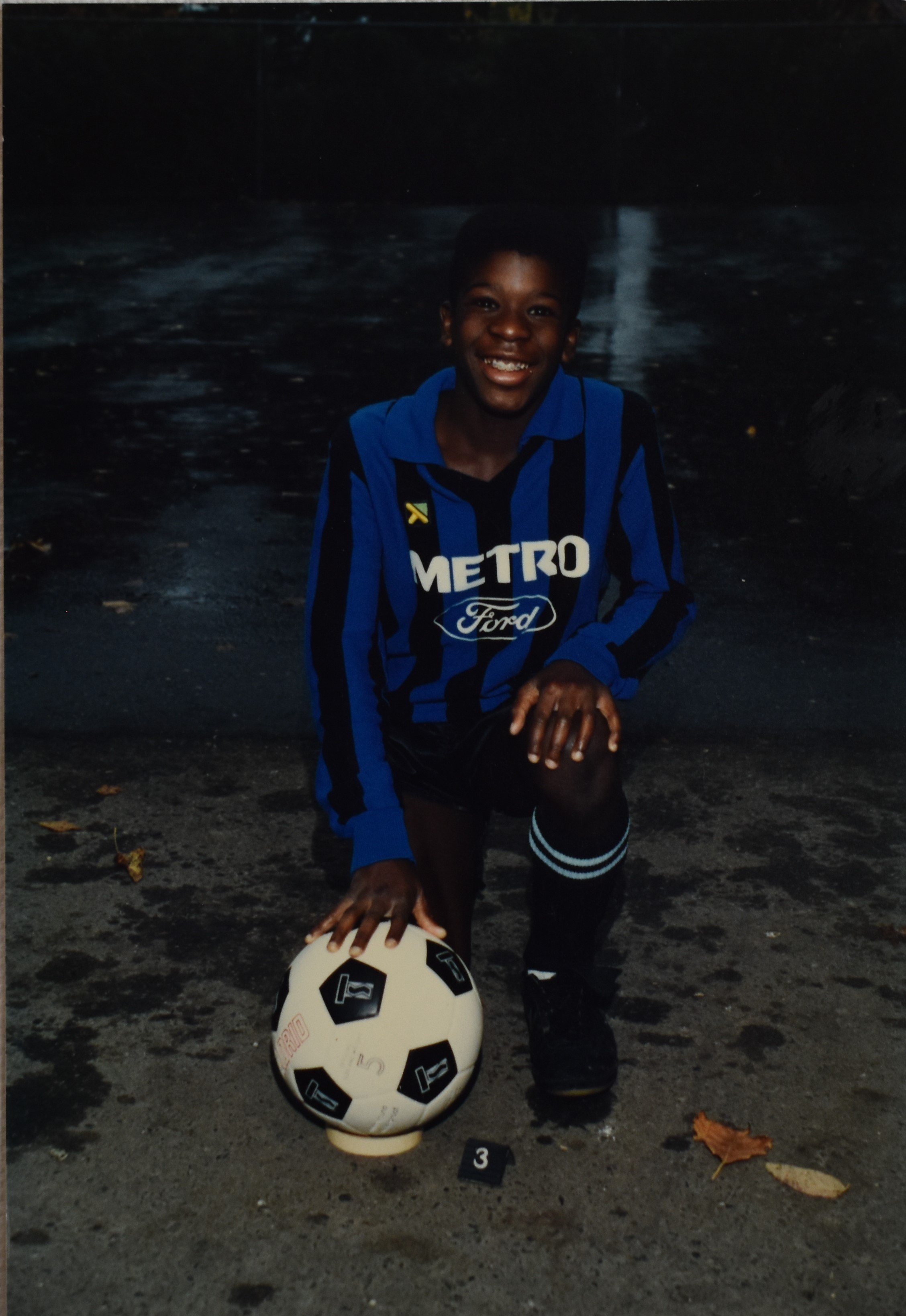
Ian playing for Metro-Ford soccer team in the 1990’s.

Tri-City News article announcing Chris and Ian Clarke’s new, and simultaneous, contracts with the Vancouver 86ers professional soccer team in August 1996.
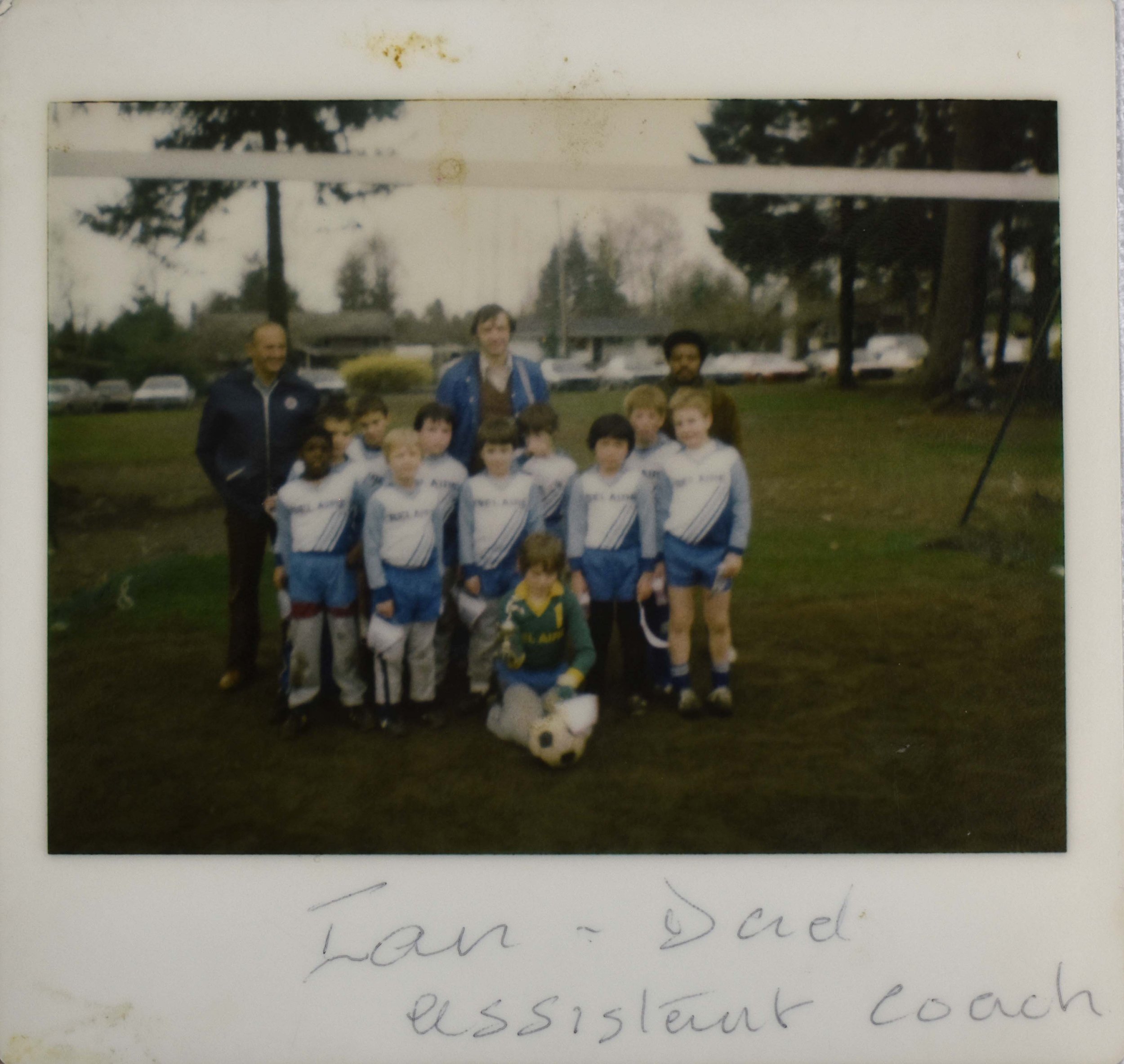
Photo of Ian playing little league soccer with his dad, George, as assistant coach.
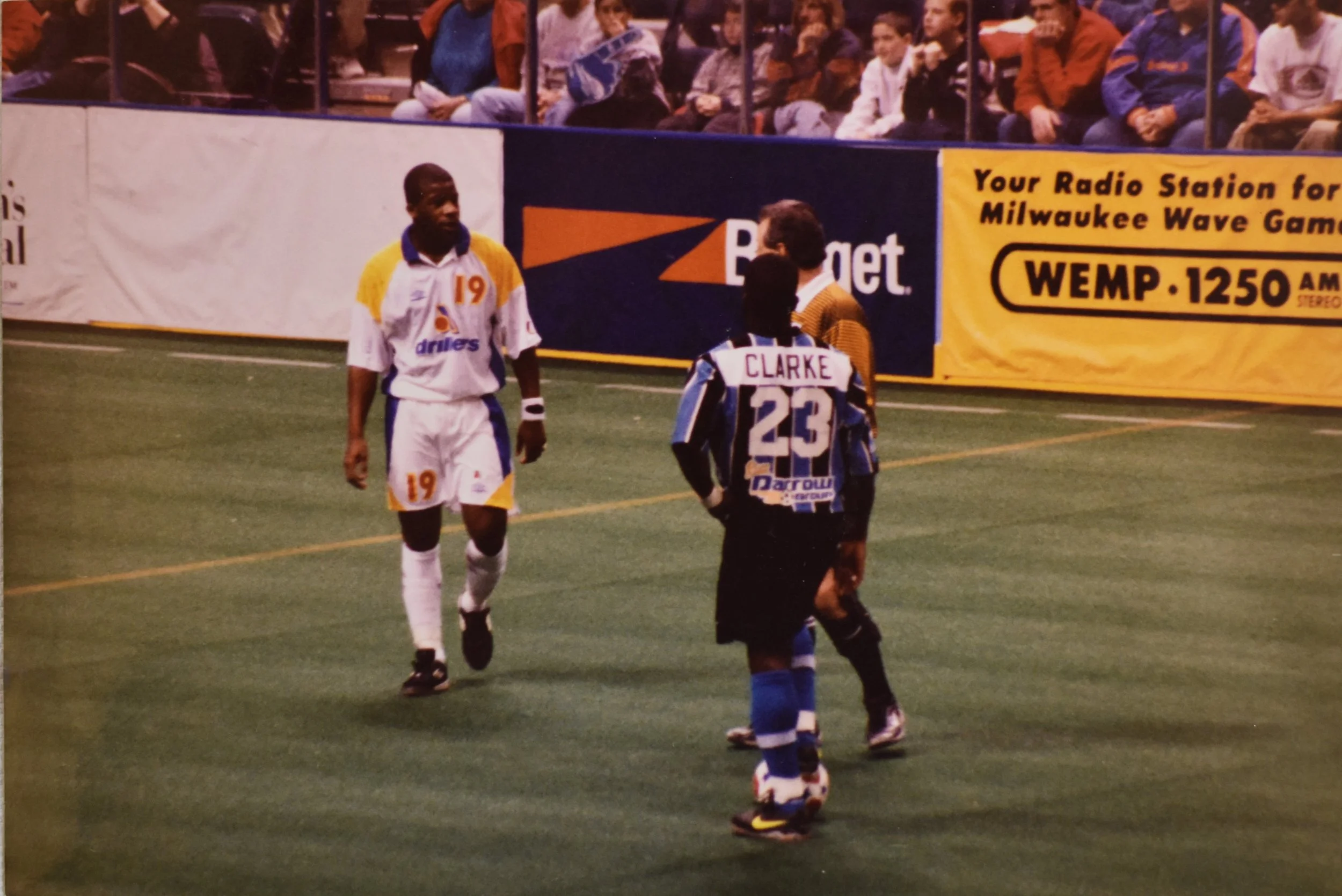
Faceoff between the Clarke brothers when Chris (#19) played for the Edmonton Drillers and Ian (#23) played for the Milwaukee Wave soccer teams.
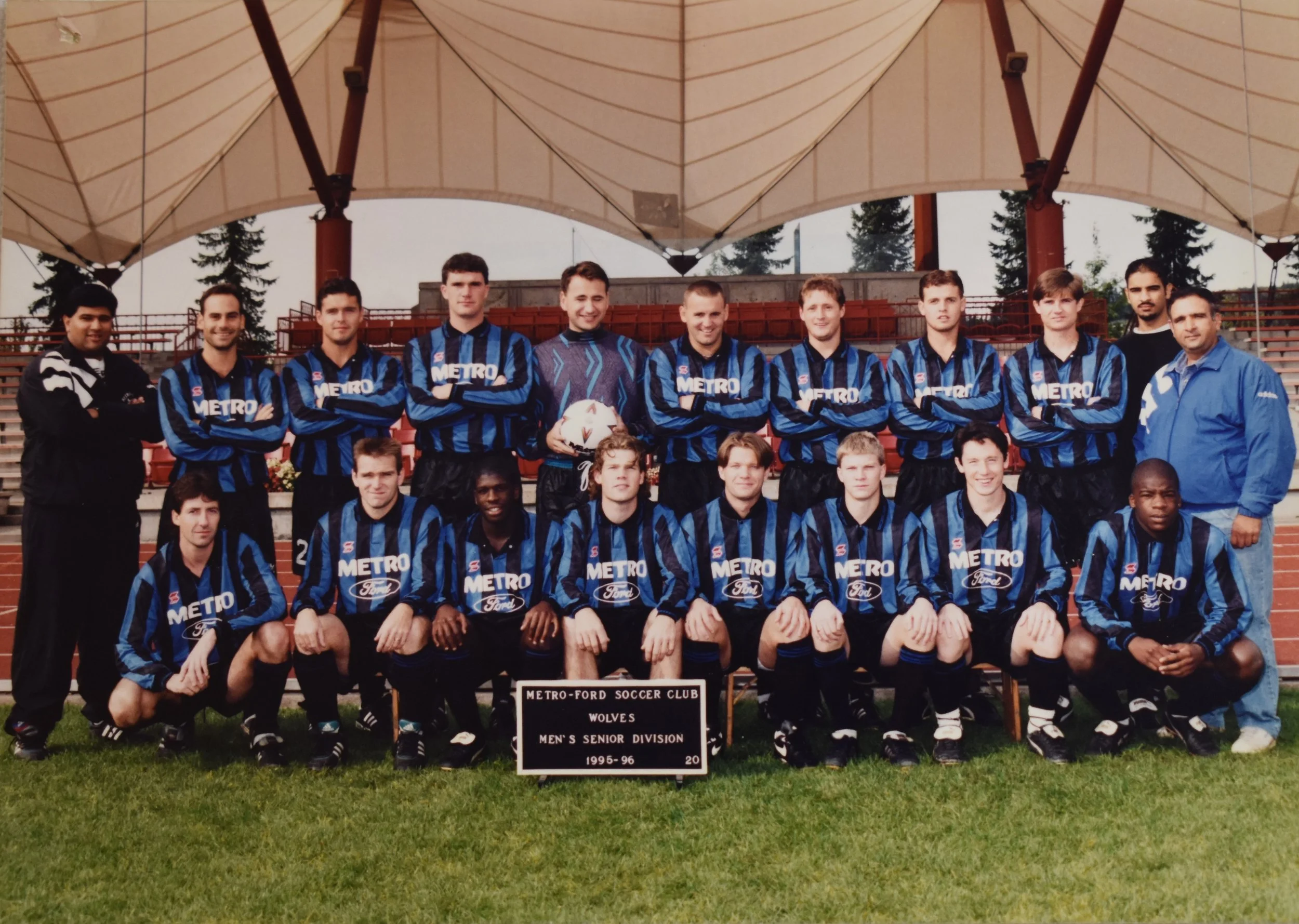
Chris (bottom row, far right) and Ian (bottom row, third from left) as a members of the Metro-Ford Wolves soccer club during the 1995-96 season.

1989 -Metro Ford Soccer Under 14 boys ( oustanding player Award) International Friendship Cup of Colorado

The Clarke Brothers: (L to R) Claude, Neville, George
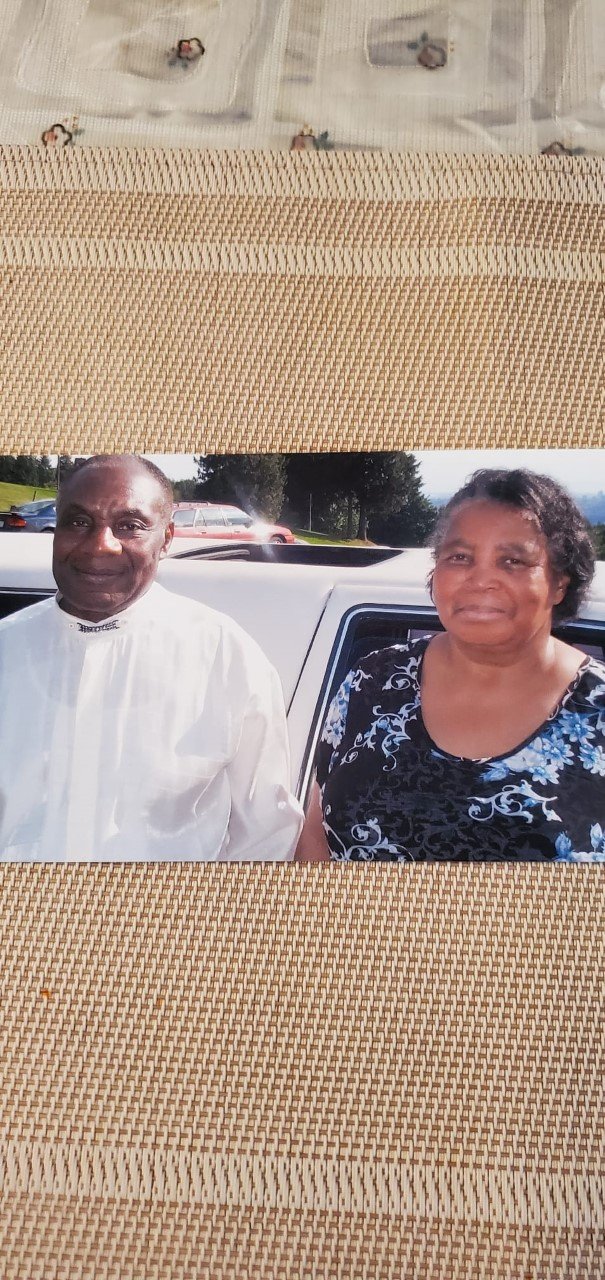
Neville and wife Vashti
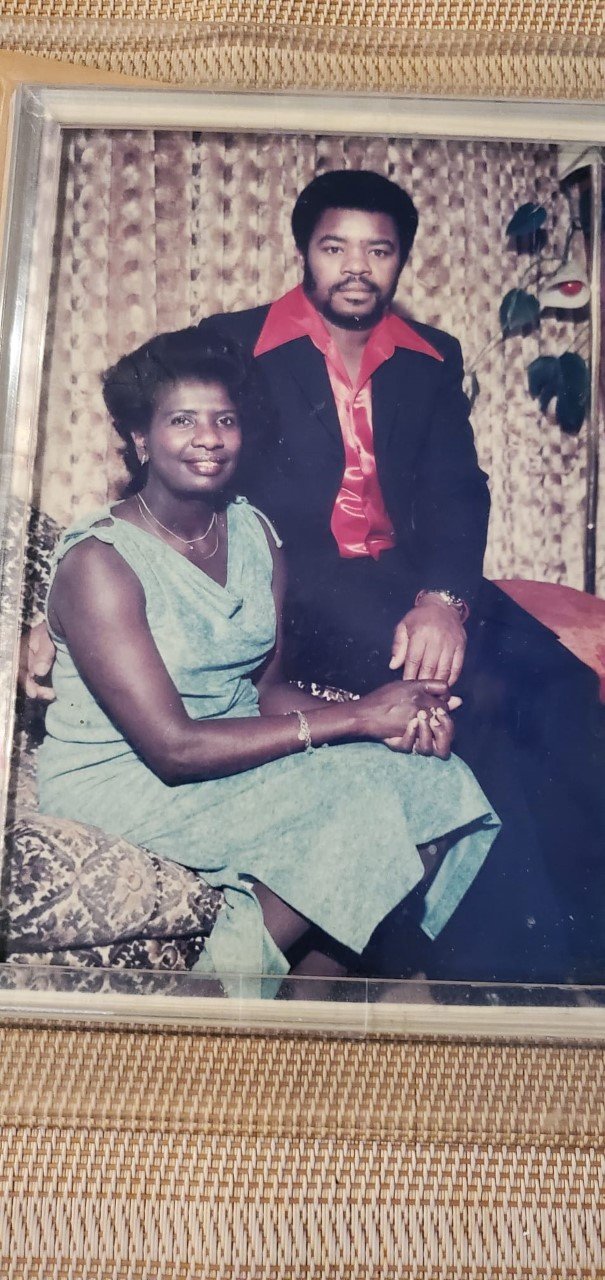
George and wife Veronica
The Trotman Family
Phebe Trotman was born in New Westminster and grew up in Coquitlam, near Como Lake, and attended Austin Heights Elementary (Montessori) and Alderson Elementary (French Immersion) before going to Rochester until Grade 5 (Montessori), then Parkland for Grade 6 & 7 (French Immersion). She attended Como Lake Jr High and then Centennial High School, followed by SFU. Both of Phebe’s parents were born in Barbados, specifically the towns of St. Michael and Christ Church, and moved to the United States under student visas.
Phebe had tremendous success as an athlete and holds numerous athletic awards. She has won national championships at youth, adult, varsity, and professional clubs. Following her older brother, TeRoi, whom she had watched playing, Phebe began playing soccer with Coquitlam’s Bel-Aire club in 1984. Phebe then played for Coquitlam United/City Soccer, and then Burnaby Girls Blast with whom she won the 1997 U-19 Coastal, Provincial, and National Championships. At the varsity level, Trotman played four years (1997-2001) with Simon Fraser University, winning the NAIA national championship in 2000, scoring the winning goal in the 163rd minute of the final match, in the fifth period of extra time. In BC’s adult club soccer, Trotman played with Burnaby Canadians in the Metro Women’s Premier division from 1997 to 2001, winning an adult national club championship in 2001. Both of Trotman’s Burnaby national champion teams are members of the Burnaby Sports Hall of Fame. Phebe then played for Coquitlam City/Metro-Ford Premier Division teams from 2001 to 2015 and more recently the club’s Classics team, with whom she won two more Canada Soccer championships in 2015 and 2018. Phebe also played soccer in the PCSL’s summer season with Vancouver Explorers and Tri-Cities Xtreme. Phebe also played with professional clubs, Fort Collins Force, in 2001, and the Vancouver Whitecaps from 2002 to 2007, winning the W-League championship in 2004, (the team being inducted into the BC Sports Hall of Fame). Phebe has been Head Coach of Coquitlam Metro-Ford’s Initiation Program since 2009 and a BC Soccer Learning Facilitator since 2016. Phebe Trotman’s honours and recognitions include selection as NAIA Women’s Soccer Played of the Year in 2000 and, twice, college First Team All-American, SFU Female Athlete of the Year in 2001, W-League Player of the Year in 2003, and selection as their Championship finals MVP by the NAIA in 2000 and the PCSL in 2007. In 2000, Phebe Trotman was selected by BC Soccer as British Columbia’s Adult Player of the Year.
Joyce Trotman (nee Springer) was born in Barbados, West Indies. Joyce attended different denominational churches there at times, but the family’s choice of church was Chapman Street Church of God (Reformation Church of God), where she was very much involved in youth activities and Sunday School. Joyce recalls being taken to that church when she was four years old by her great grandmother. When she was fourteen years old, she began assisting at Sunday School with the toddler’s class, and also taught other classes. She was asked to be the Christian Education Director for her Church at a very young age. Joyce felt led to further her studies and attended West Indies Theological College (WITC) in Trinidad for formal Christian Education studies. While there, she met Mary Ryan nee Christmas, who had come from the island of St. Kitts to also study Christian education. Mary later got married to Alex Ryan who was also from St. Kitts. While Mary studied in Trinidad, Alex was in Oregon where he had studied at Warner Pacific University. WITC was the Church of God college for Caribbean youth who wanted/felt led to become ministers or Christian Education directors. (You can learn more about this in Alex Ryan’s oral history interview.)
In 1970, Joyce and Henderson Trotman got married and moved to Portland, Oregon to study. They both attended Warner Pacific University, where Joyce was allowed to transfer some credits from WITC. She received a Bachelor of Science degree with a major in Social Work, and minors in psychology, sociology, and anthropology. Henderson graduated from Warner with bachelor’s degrees in social work and theology. He then attended Portland State University where he completed a master’s degree in social work and family counselling. After completing their studies, Henderson and Joyce moved to Canada, as they had Permanent Resident status. It was a natural transition, as they often spent the Christmas seasons and summers in BC, enjoying the company of friends who were also from the Caribbean and who also attended the Reformation Church of God in their countries. Friends who had never been to Canada, but had always wanted to visit, offered to help with the driving. Joyce and Henderson set up a home in Maillardville for a short time, in an apartment that Alex Ryan had secured for them. As Joyce says, they had “three degrees, one child, one car, and no money, and of course, the Lord.” What they also had was a community of friends who also came from the Caribbean, and who has continued to be active in the Church of God. The family is still in touch with many of these people who are like family. The Trotman family also lived for a time in Burnaby, before finally settling in Coquitlam again.
Joyce worked her own business through a company called Jafra Cosmetics, even when in Portland, as it allowed her to control her time. She continued that business for many years. When their children, Phebe and TeRoi, were old enough to go to school, Joyce began working through a temp agency, going from place to place doing part-time secretarial work. One of the companies where she was sent repeatedly was Vancouver City Savings Credit Union as it was one of the few companies which had a magnetic selective typewriter. As there was a shortage of people who knew how to use that typewriter, they eventually asked her to become staff. Joyce also worked as a lifestyle counselor and at Arcus Community Services.
Next, she worked at Maples Adolescent Treatment Center in Burnaby, putting her degree to good use, first as a psychiatric social worker filling in for someone away on sabbatical. When that year ended, she worked as a childcare counselor. In her last years of work, she worked as a social worker through Community Living B.C. While in the United states and in Canada, the family were aware of racism, but Joyce says it never affected them directly.
The Trotman family still sticks to important traditions and celebrations that keep them connected to Barbados. One of those traditions is celebrating Barbados Independence Day on November 30th, and cooking traditional Bajan dishes. Phebe’s favourites are flying fish, salt bread and oxtail, and Joyce describes a dish made from corn meal and okra, called cou cou. Cou cou, along with flying fish, is considered Barbados’ national dish. There are other kinds of cou cous such as split pea, breadfruit, green bananas, etc. For Caribbean cooking items, West Indians often travel around the lower mainland, to New Westminster, Surrey, or Vancouver. See our recipes section for a few Bajan recipes from one of Joyce’s cookbooks.
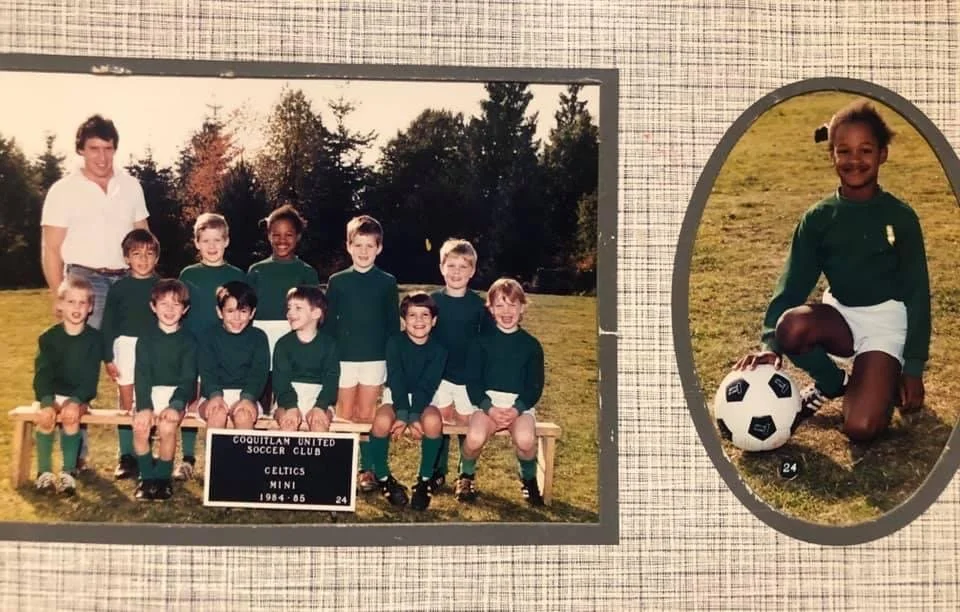
A six-year-old Phebe with the Celtics, a local youth league soccer team. Phebe originally started playing soccer after watching her older brother TeRoi play for a youth league team.
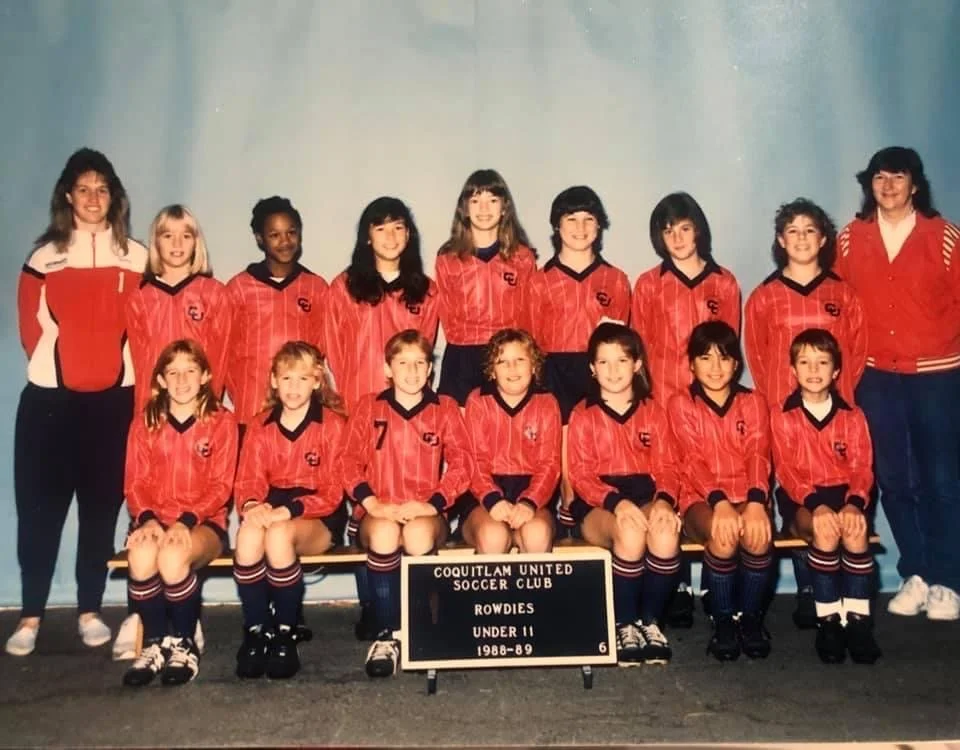
Phebe (second from left, back row) with her youth soccer team in Coquitlam, the Rowdies. Phebe would have been 11 or 12 while playing with the team.
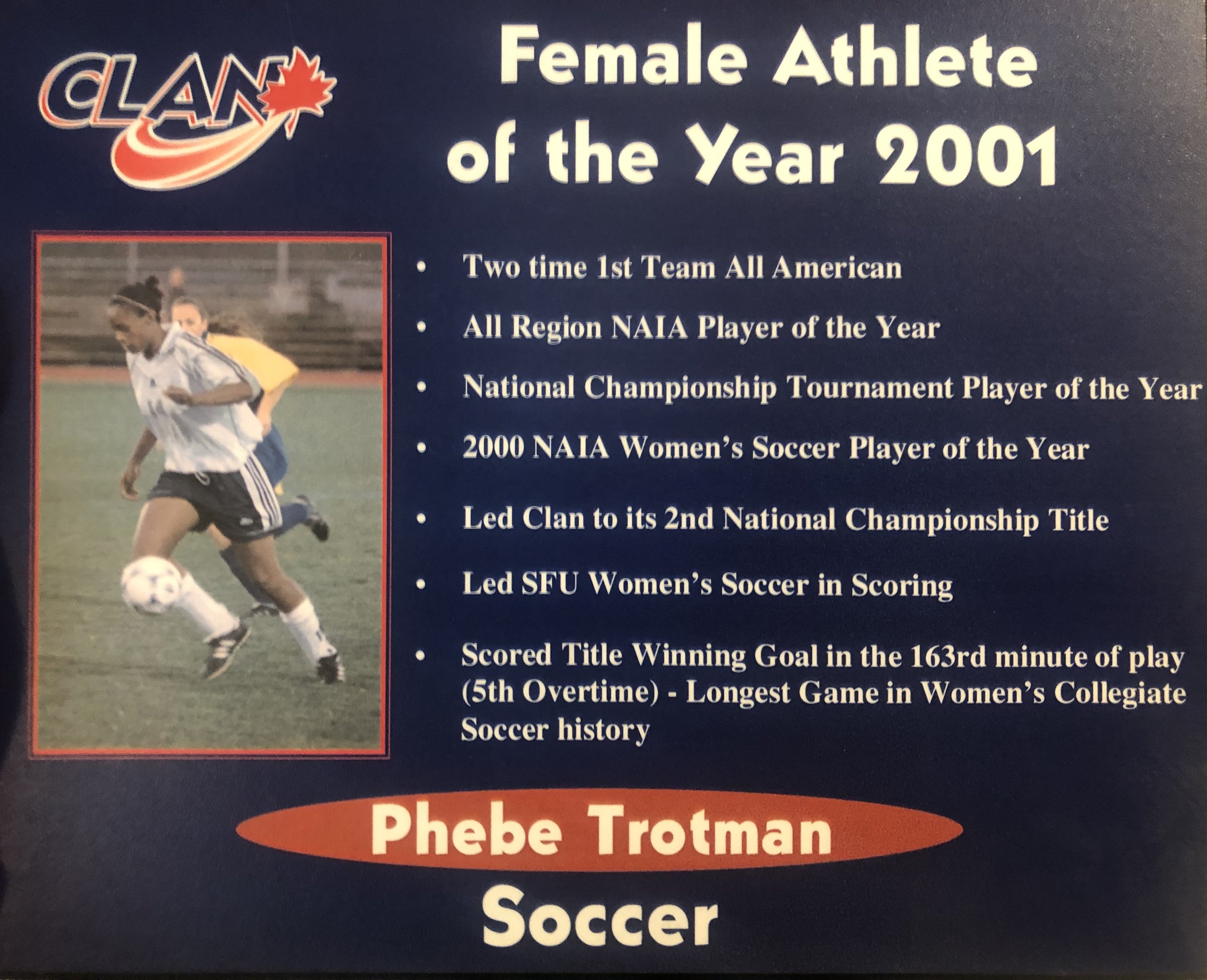
Phebe was awarded Female Athlete of the Year by SFU in 2001.
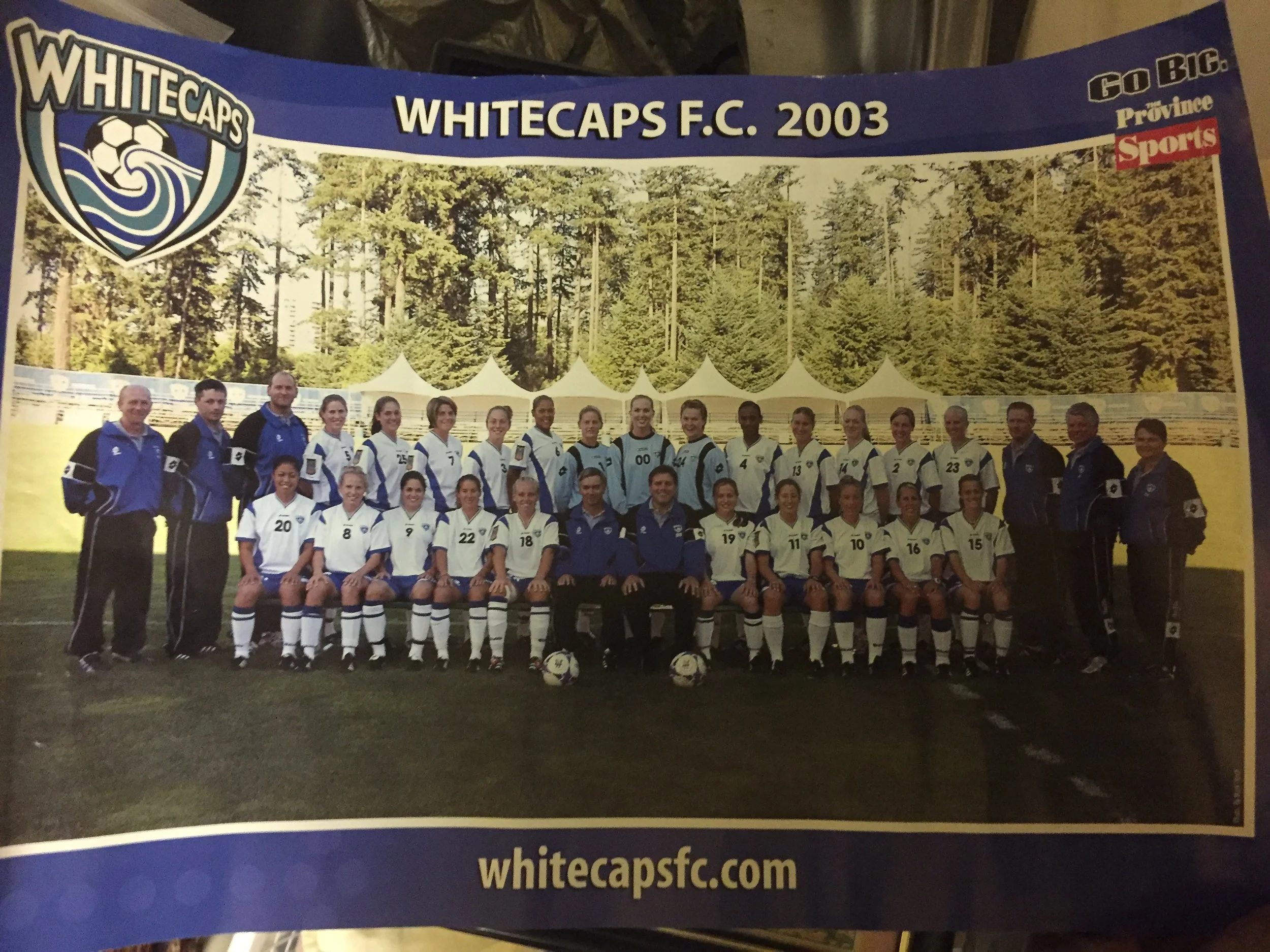
Phebe (fifth from right in back row) with the 2003 Vancouver Whitecaps team.
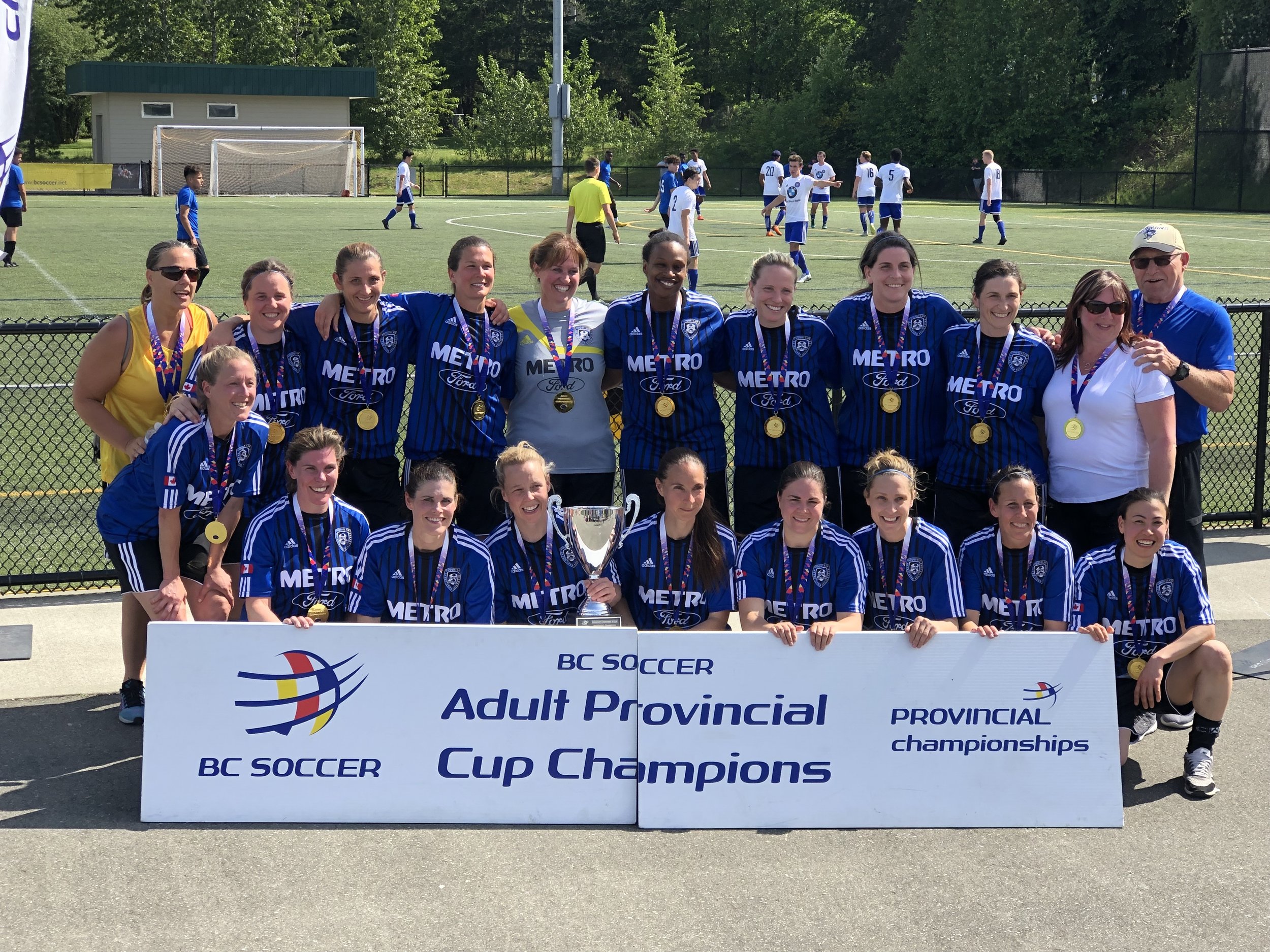
Phebe with the Metro-Ford team after winning the BC Adult Provincial Cup Championship.

Joyce and Henderson on their wedding day
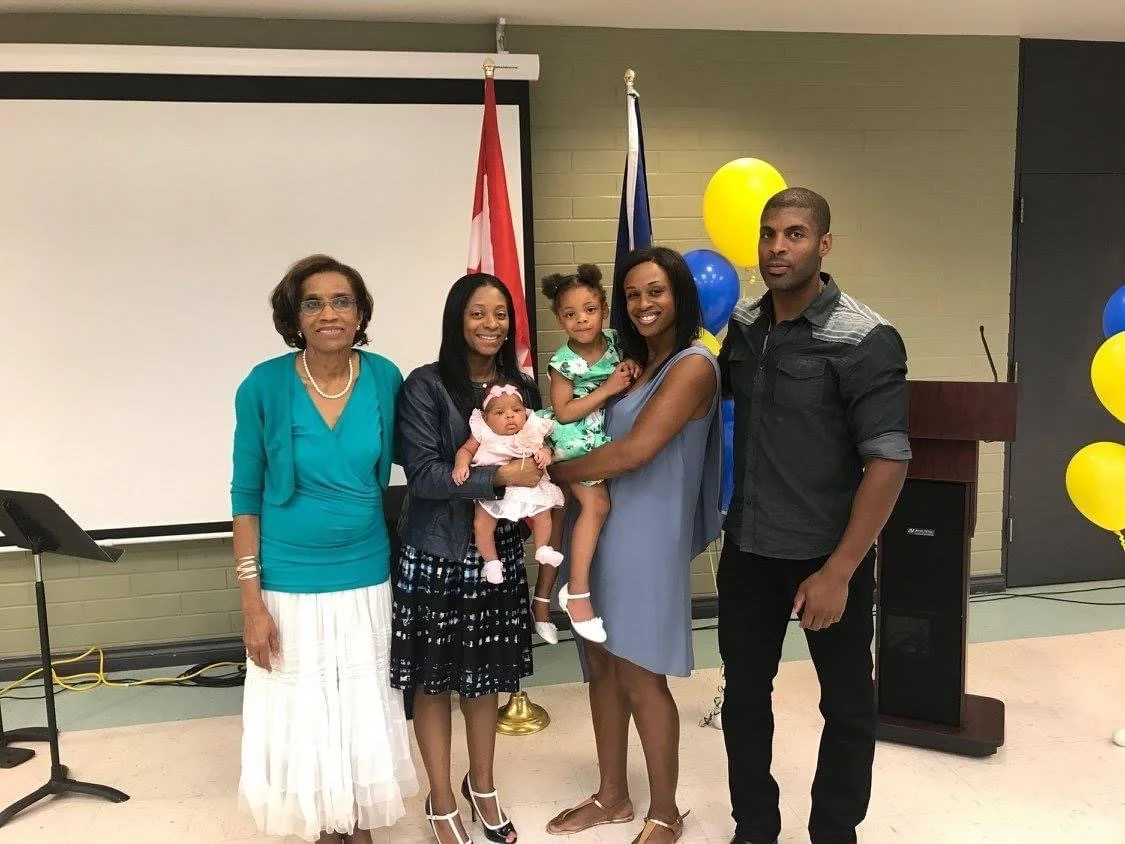
From L to R: Joyce, Chenda (Teroi’s wife), daughters Skylar and Tatum, daughter Phebe and son Teroi.
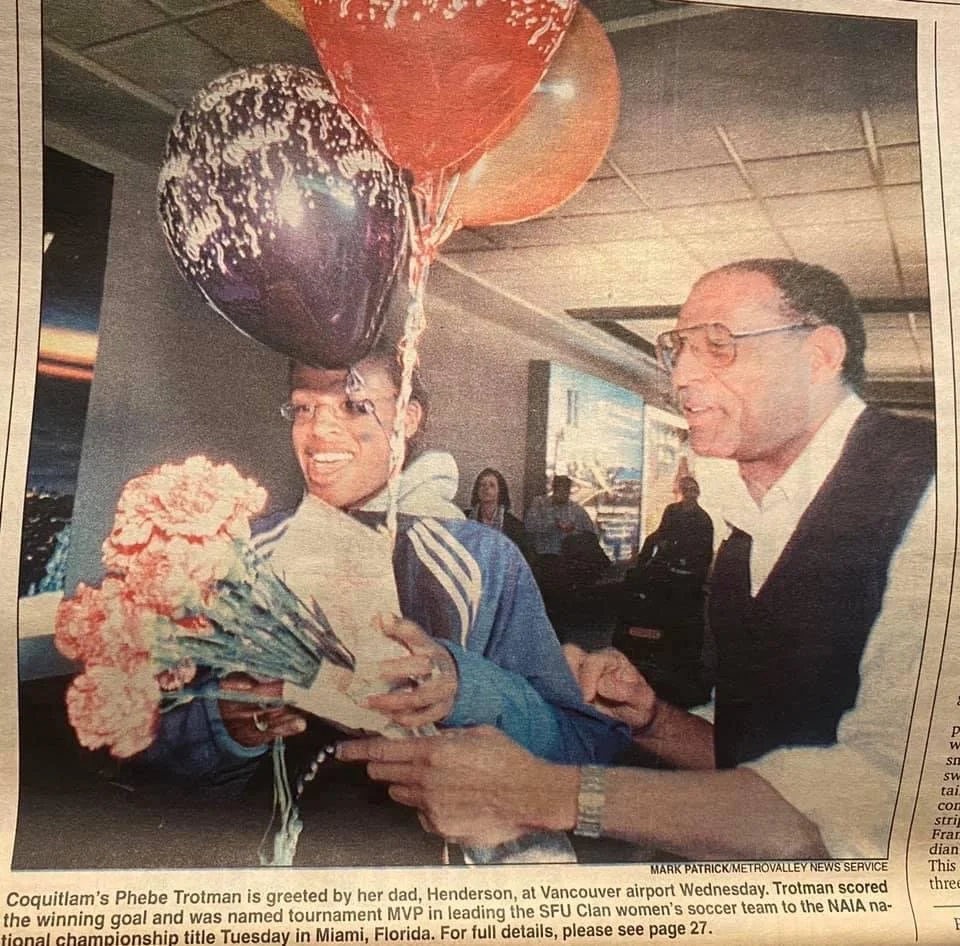
Phebe being greeted at YVR by her father Henderson after winning the NAIA National Championship in 2000. During the game in Miami, Florida, Phebe scored the winning goal in the 163rd minute during the fifth period of extra time.
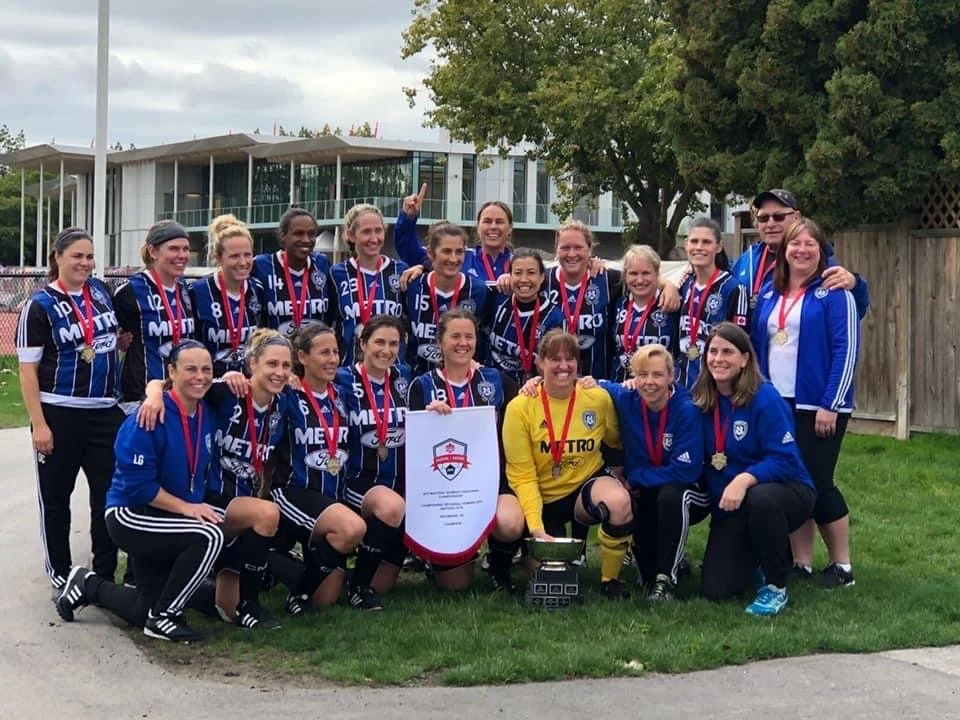
Phebe, fourth from left in the back row, with the Coquitlam City/Metro-Ford (CMFSC) Premier Division Team, who she played for from 2001-2015.
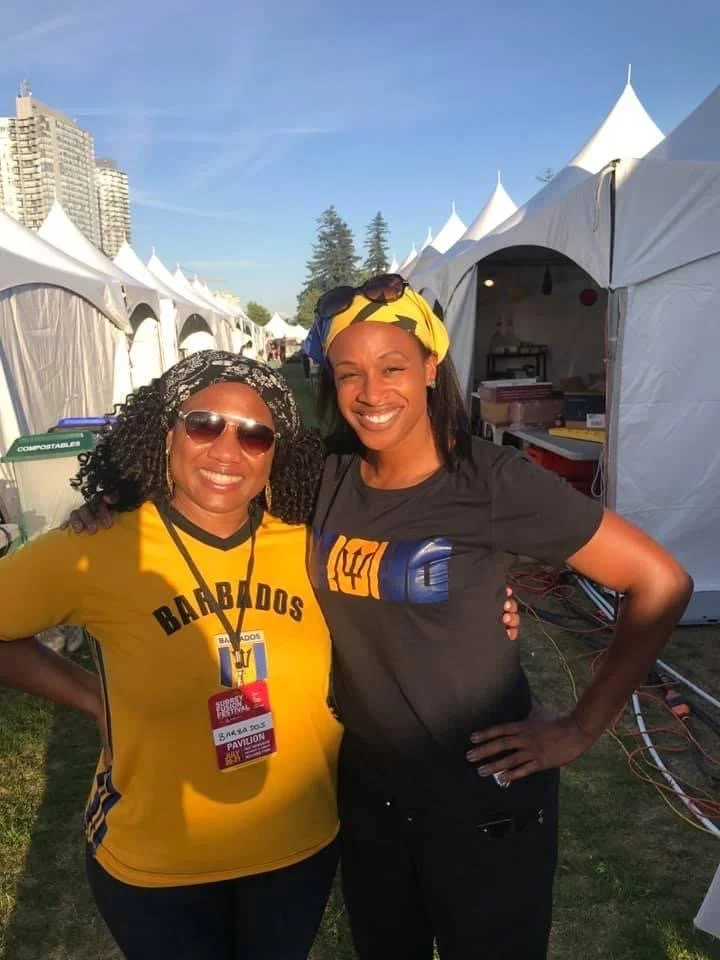
Phebe with friend Renita Drakes, who is also the President of the The Barbados Cultural Association of BC (BCABC). They were helping at the Barbados booth at Fusion Festival.

Photo from Phebe on the soccer field at SFU in the late 1990’s, with proud parents Joyce and Henderson looking on from the stands.
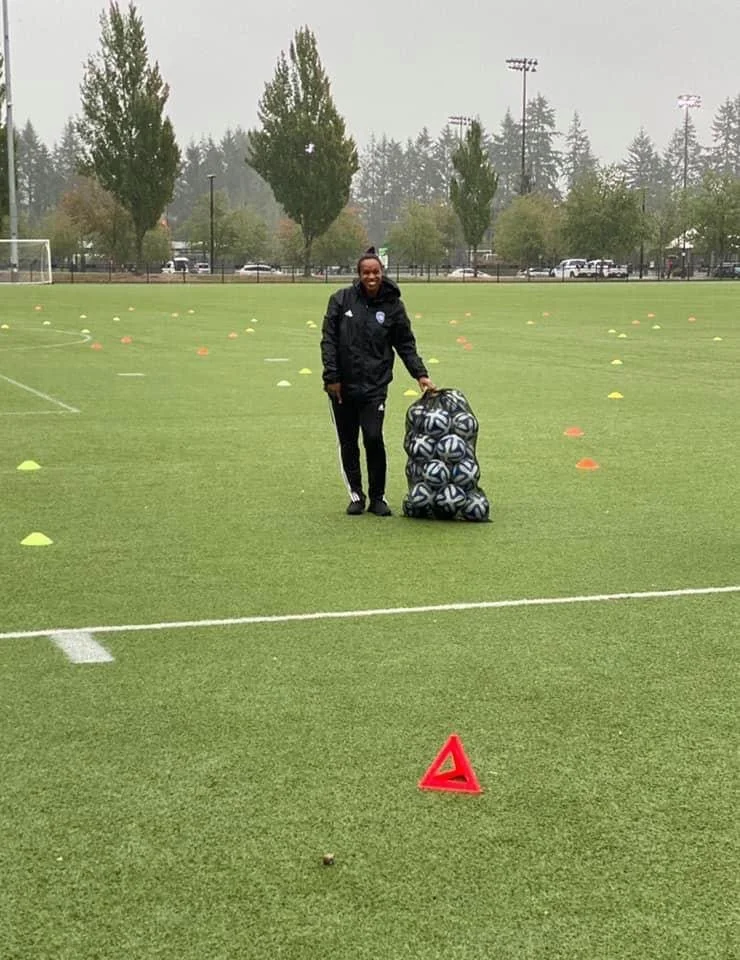
Phebe getting ready to coach at the CMFSC Initiation Program (Town Centre Park)
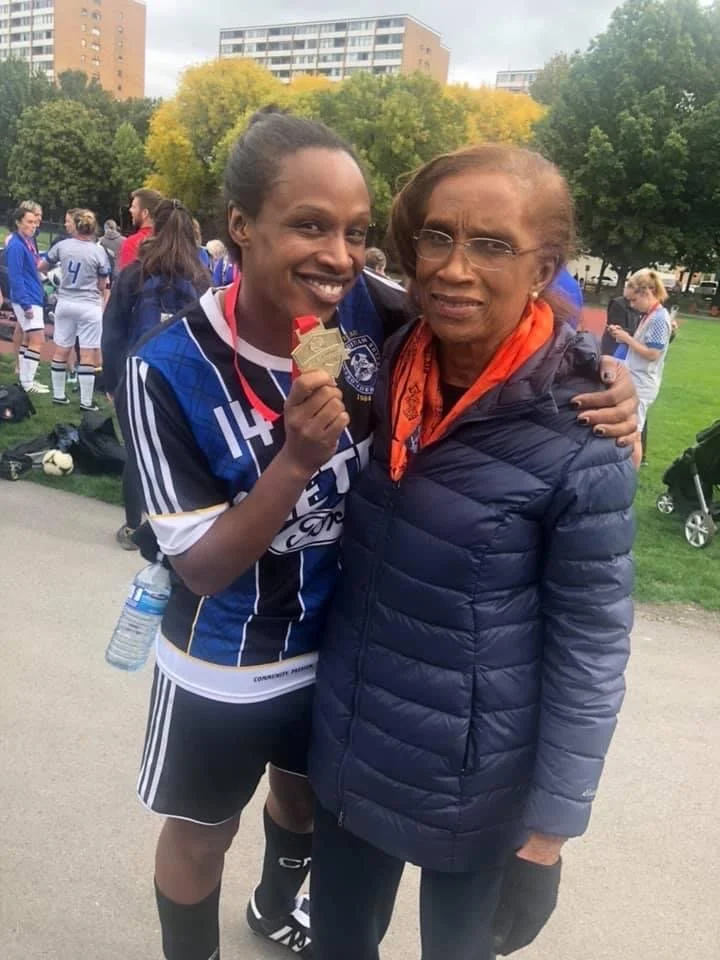
Phebe and Joyce celebrating after Phebe’s team, CMFSC Classics, won the Gold medal at 2018 Masters Women’s National Championship (Richmond)

Phebe
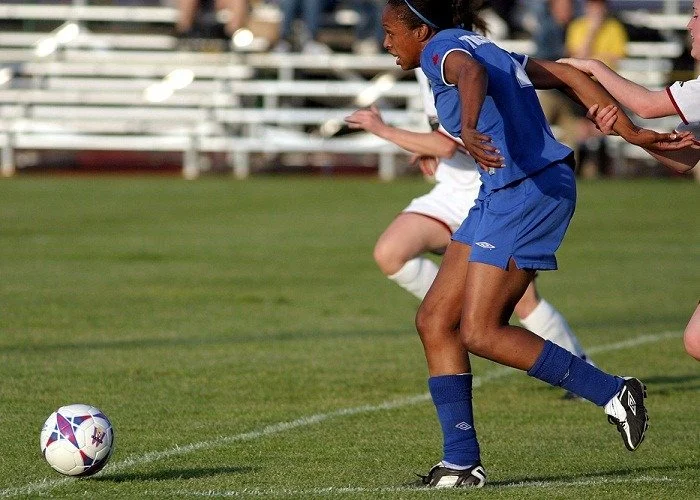
Photo of Phebe in action.

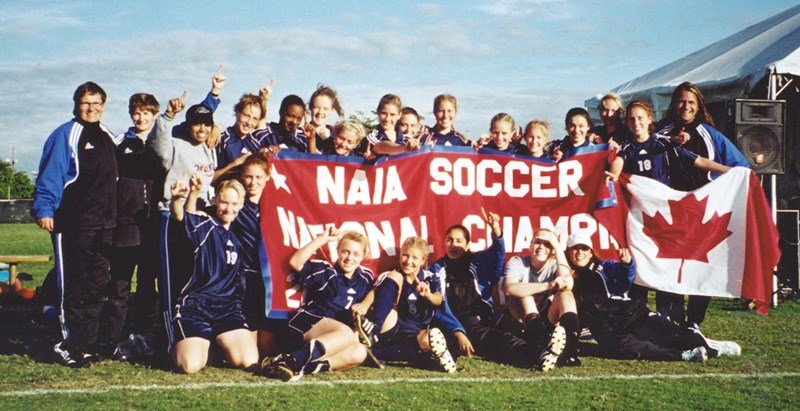
The NAIA Championship-winning SFU soccer team. Phebe is third from the left in the back row.
Windies Cricket Club
Windies Cricket Club, circa 1990. Photo courtesy of Windies Sports and Cultural Association
Mackin Park, in Maillardville, is home to the Windies Sports and Cultural Association, who have been calling the park their home cricket field for over forty years.
The first cricketers in Coquitlam played at Glen Park, near the Coquitlam Shopping Center, then moved to Miller Park and finally to Mackin Park at a time when no other sports were being played there. The Association has received exceptional support from the City of Coquitlam.
The Windies Cricket team was created when two teams merged into one. One team, Westcan Cricket Club, was started in 1978 by Vibert Jack of Saint Vincents & Grenadines, and Neville Pemberton, from St. Kitts & Nevis and others. They initially played on a field near Pine Tree. Their rival club was a group of West Indians, mostly from the Surrey area, called the ‘Carib Cricket Club.” The two clubs competed against each other to see which was the best cricket club in the league and determined that they were both good. They decided to form a club with a social club-like atmosphere, that they hope would be the best team in the British Columbia Mainland Cricket Leage (BCMCL) and merged to form the Windies Cricket Club in 1997, under the society name Windies Sports and Cultural Association.
The Windies, pre-COVID, met regularly at Mackin Park, and hope to resume when things return to normal. The club offers senior men’s cricket for ages 18 to 70, and junior boys’ and girls’ cricket for ages 6 – 18. The Super Strikers are their junior team. They also enjoy social events, such as celebrations of various West Indian Islands’ Independence Days. The club is supported by various fund-raisers.
All Nations Church of God in Christ
This small church, located at 220 Allard St., in Maillardville, was founded in the early 1970’s by James Blackwell who was then a part of the U.S Denomination, Church of God in Christ (COGIC), Memphis TN. He was a Black man, and the church was popular among the residents of Maillardville, as recalled by Wilma Clarke. The church is still in operation and Coquitlam Heritage is working to install a commemorative plaque on the building.











